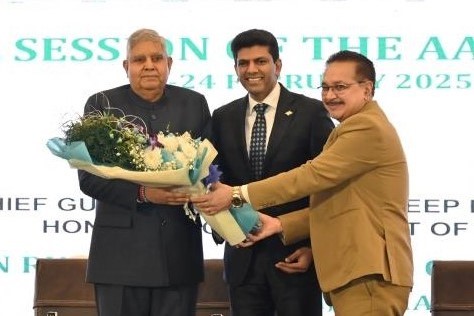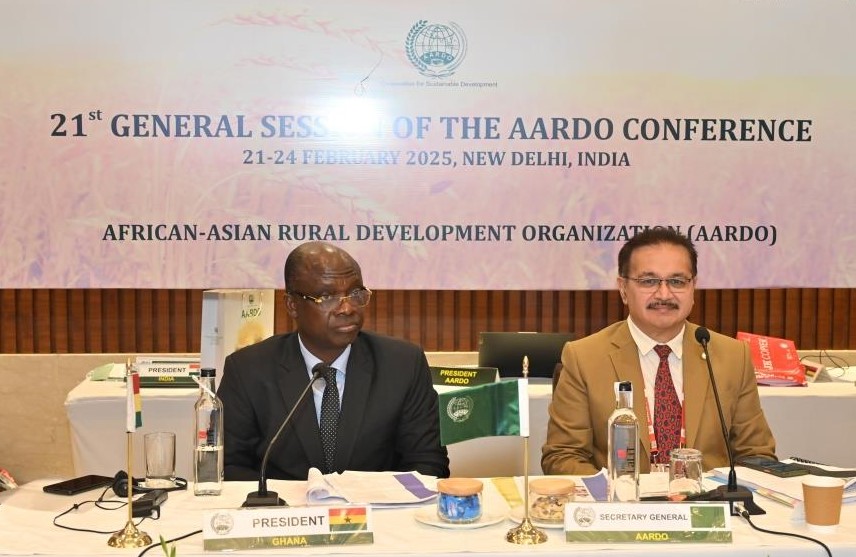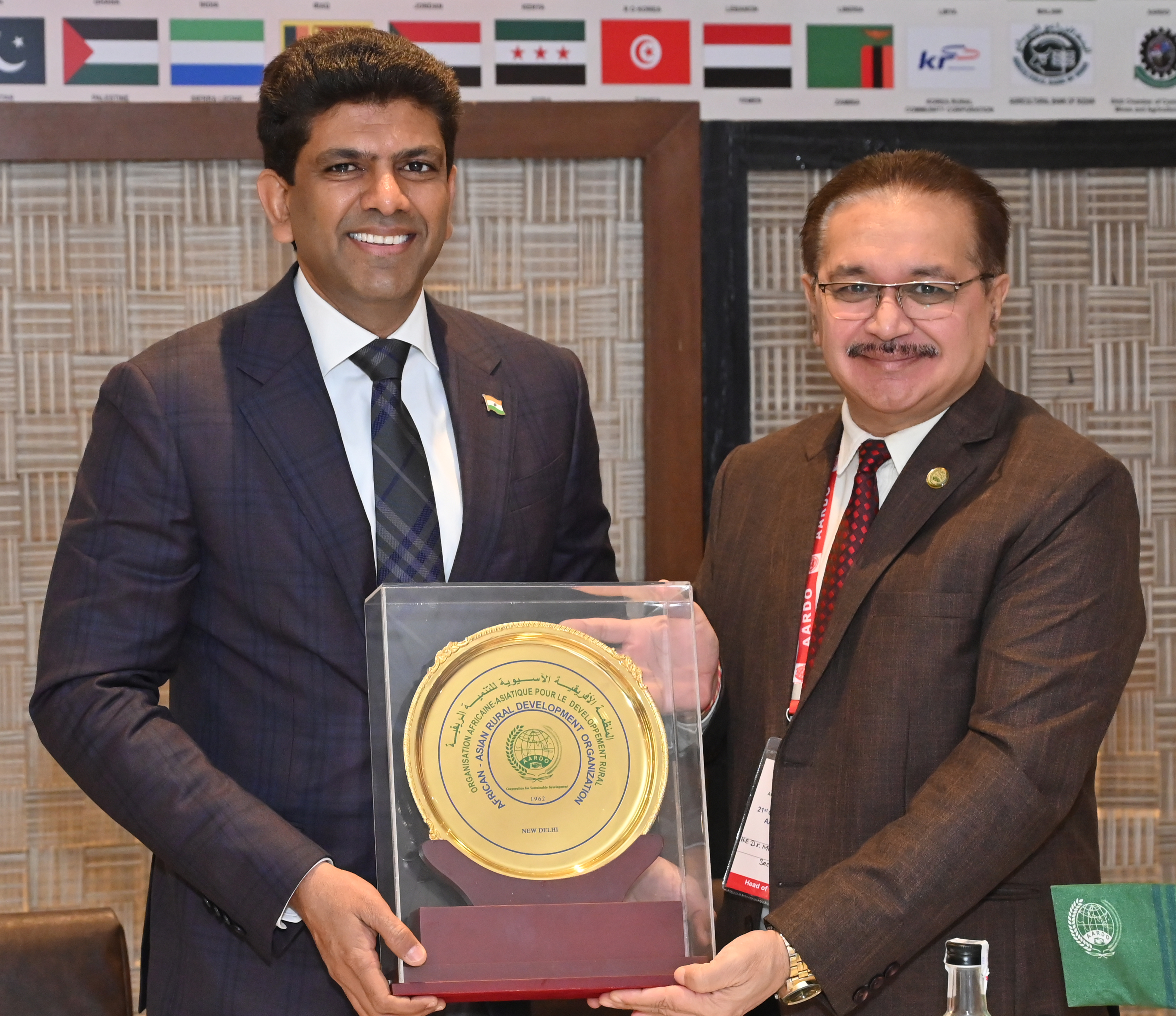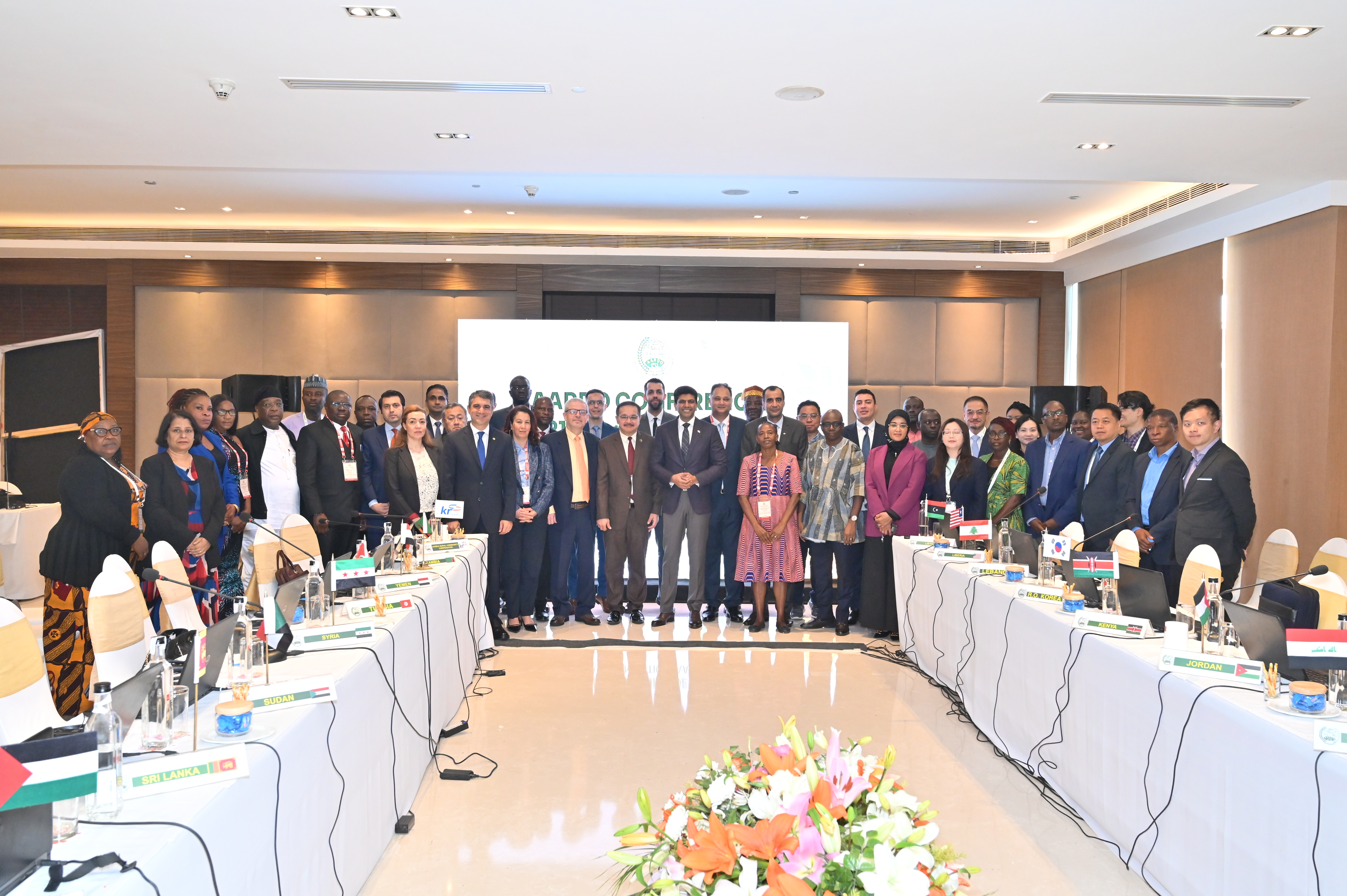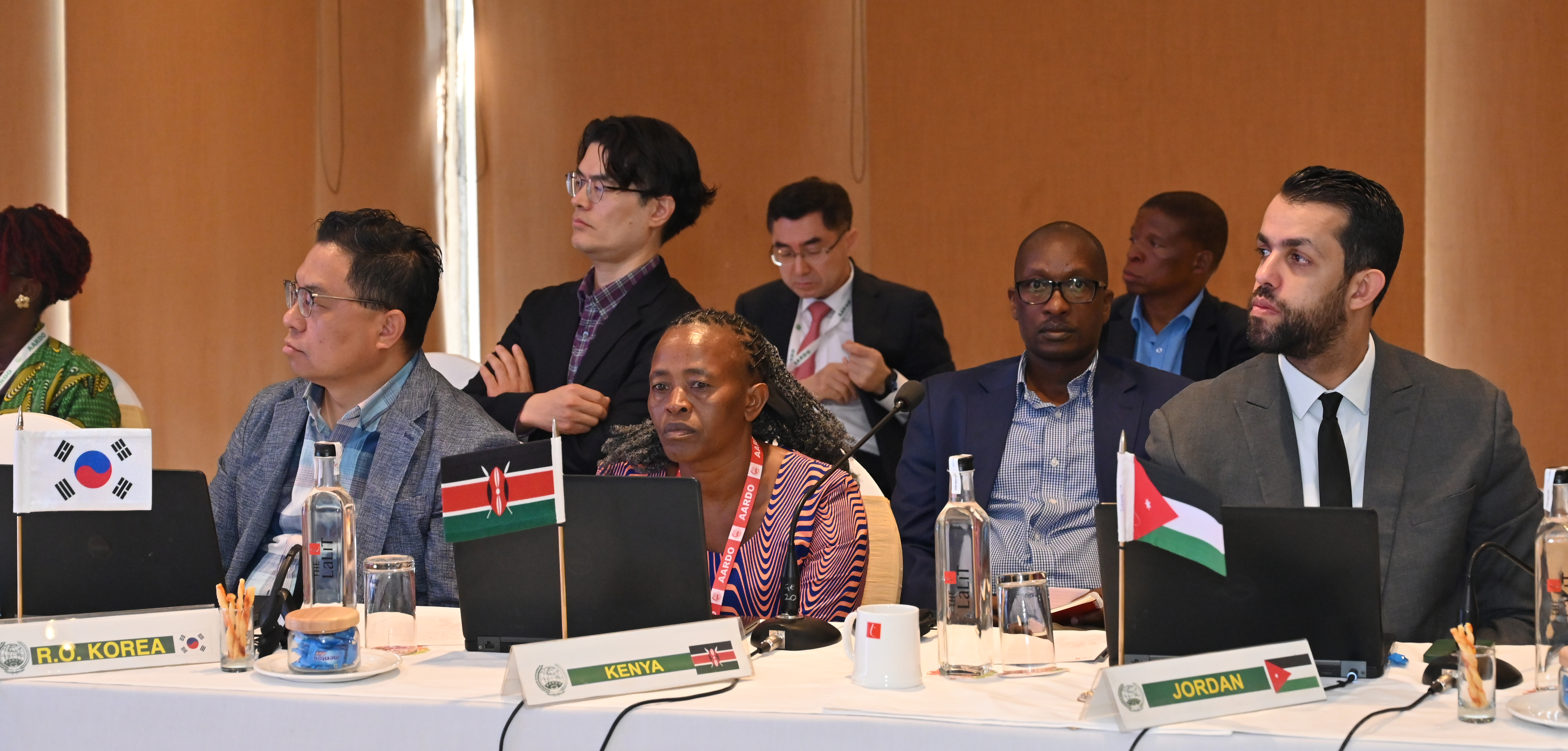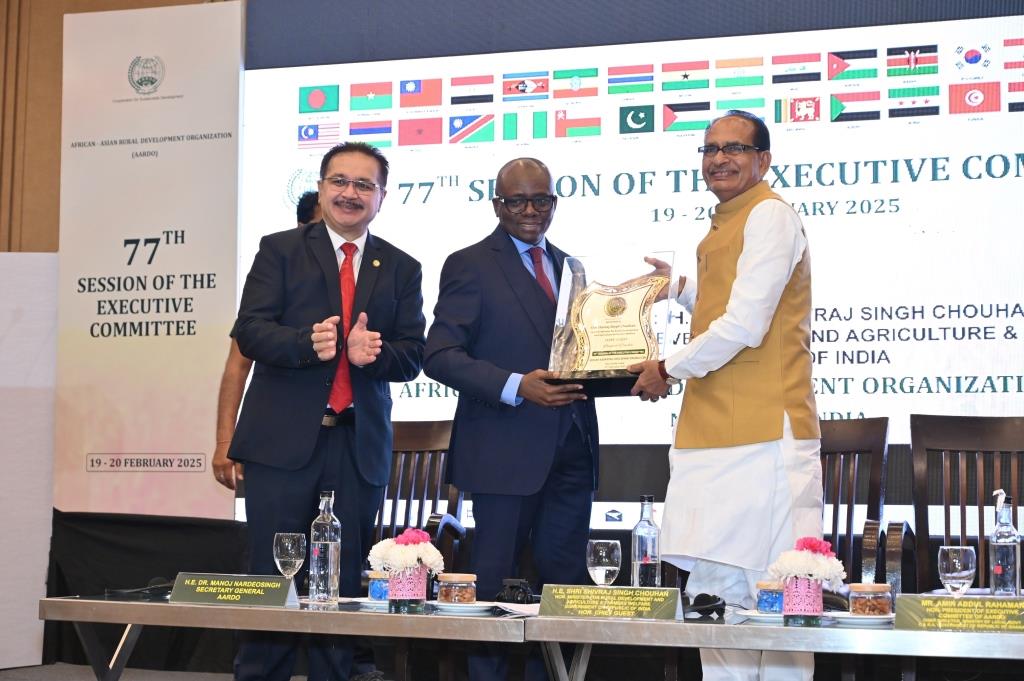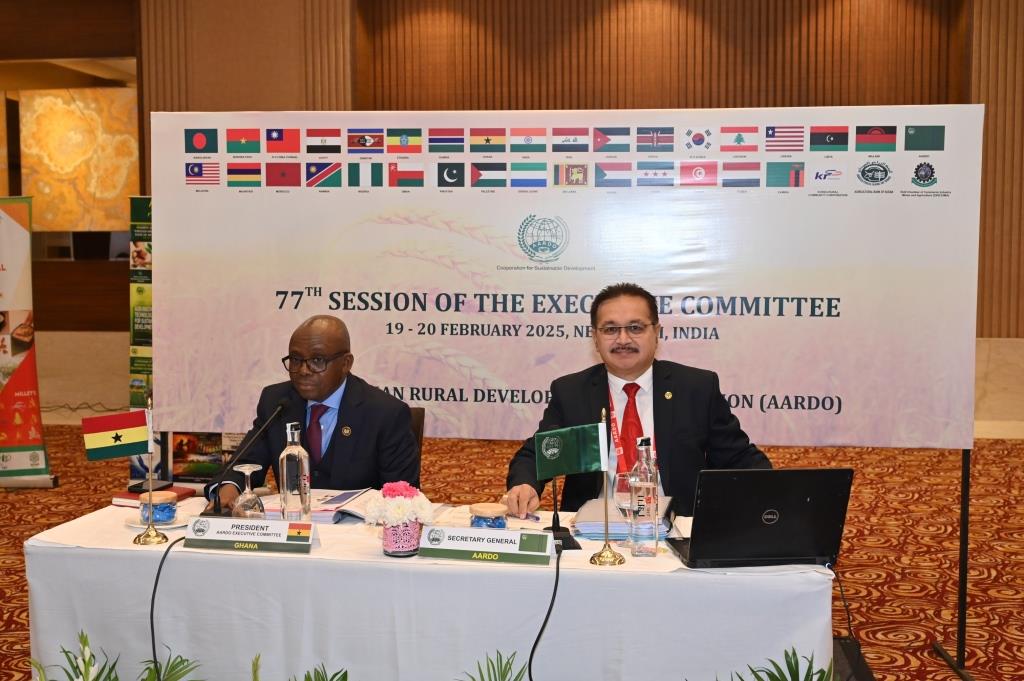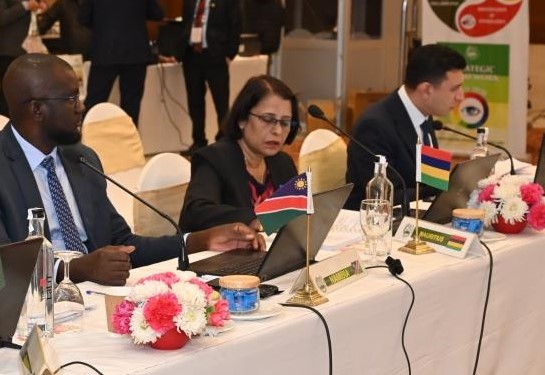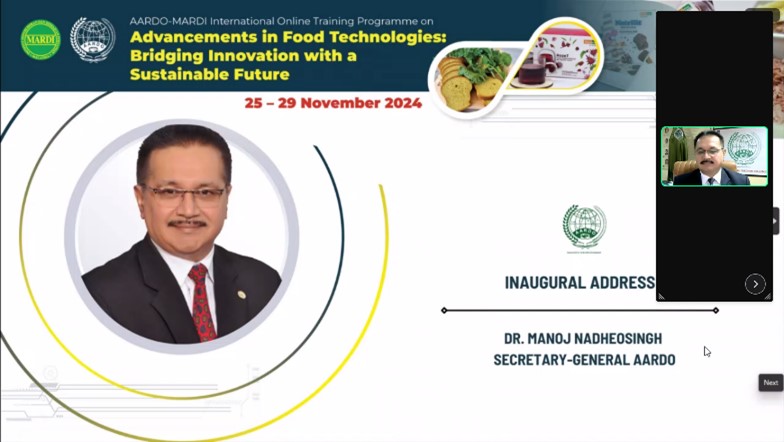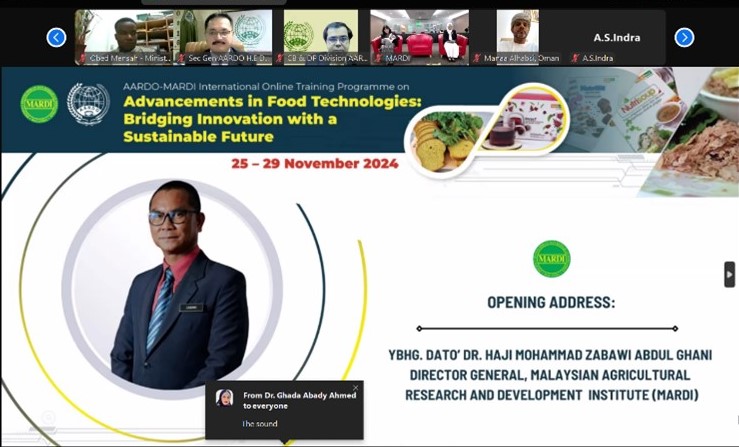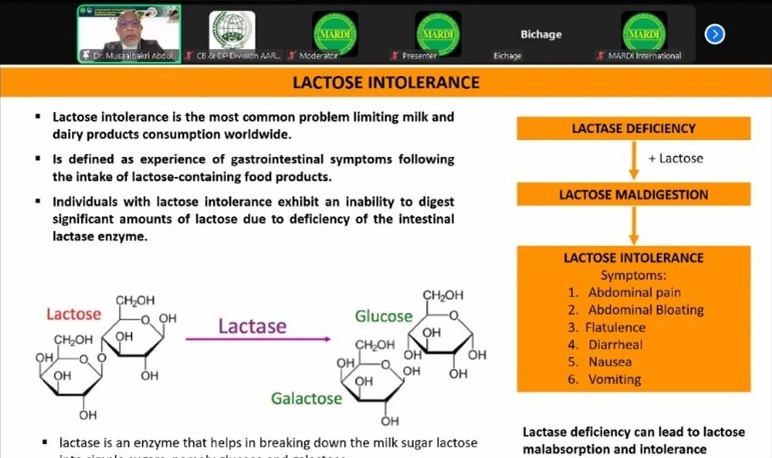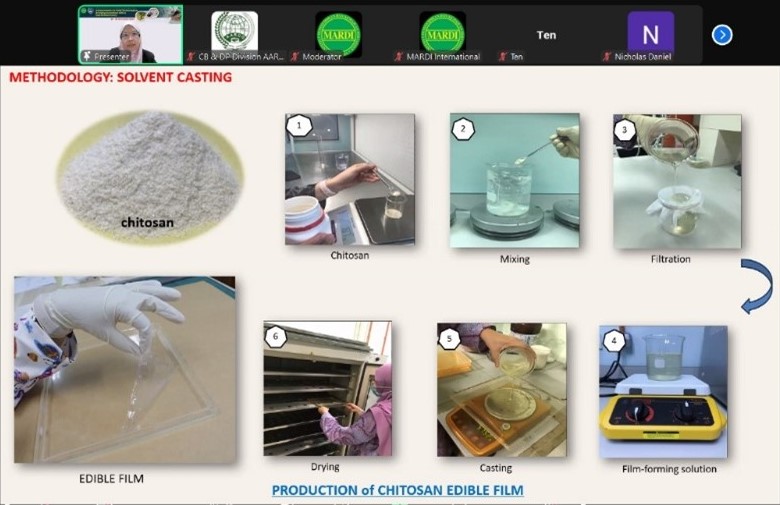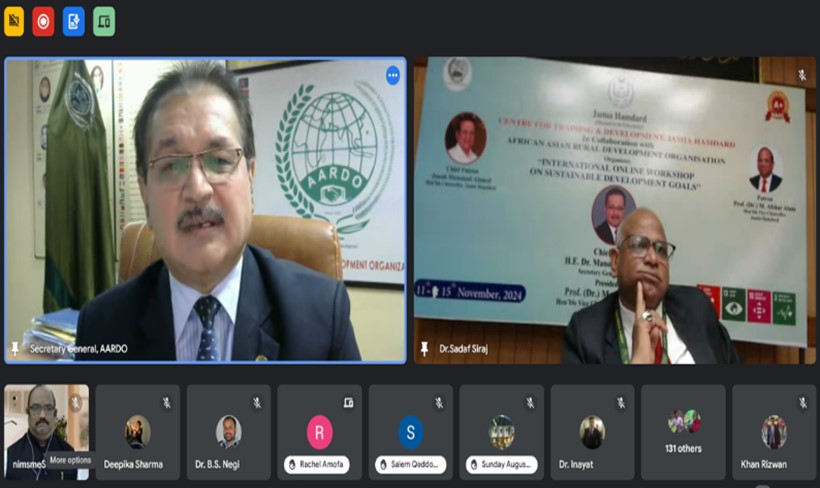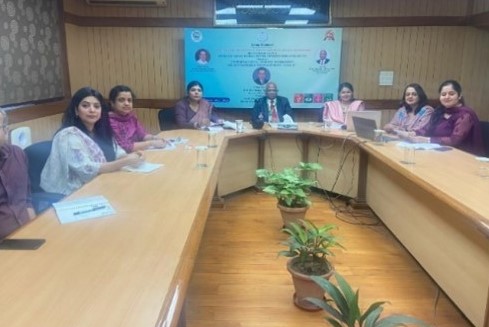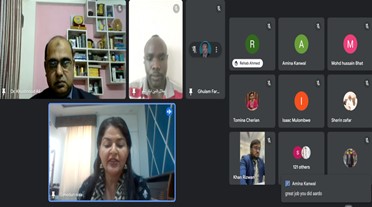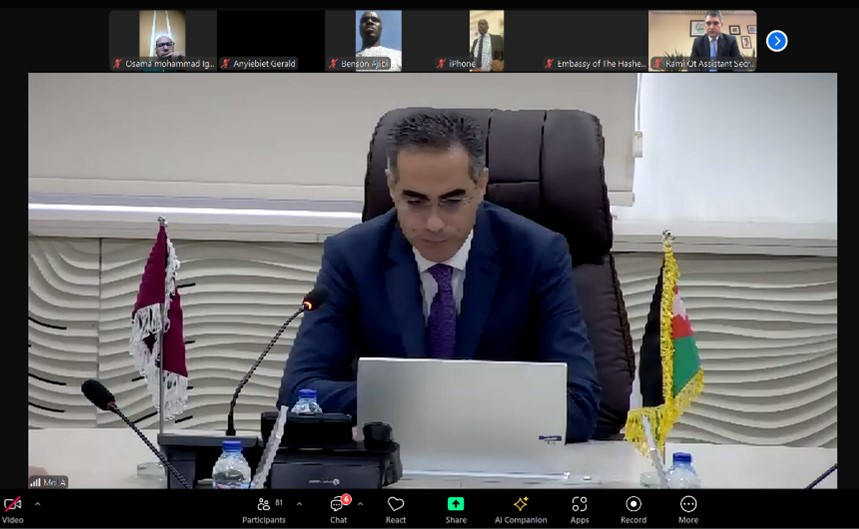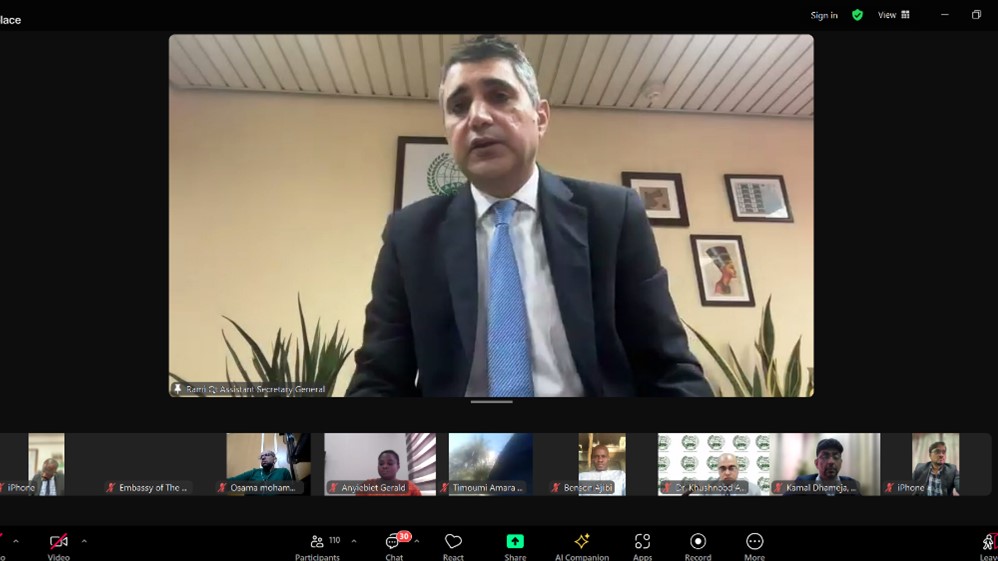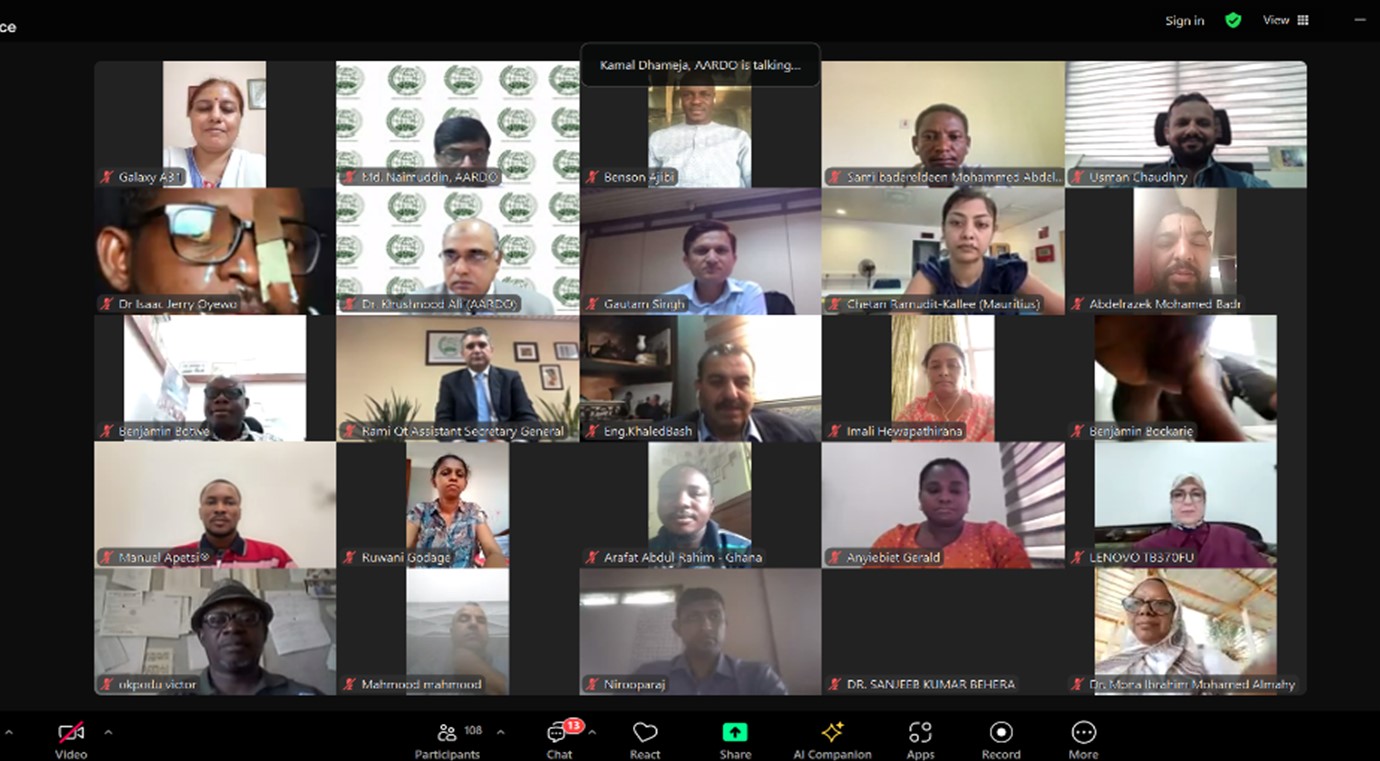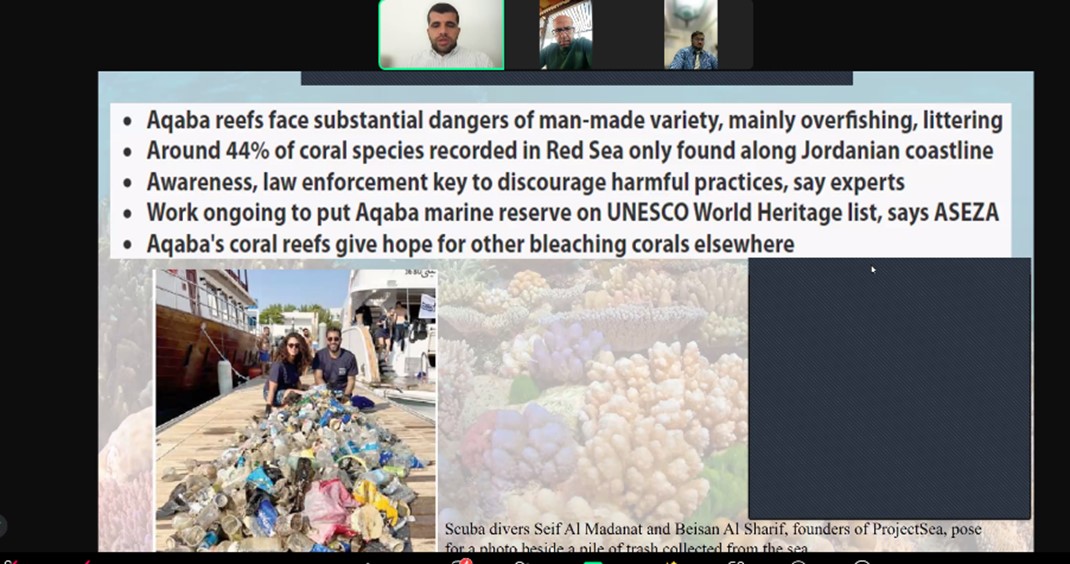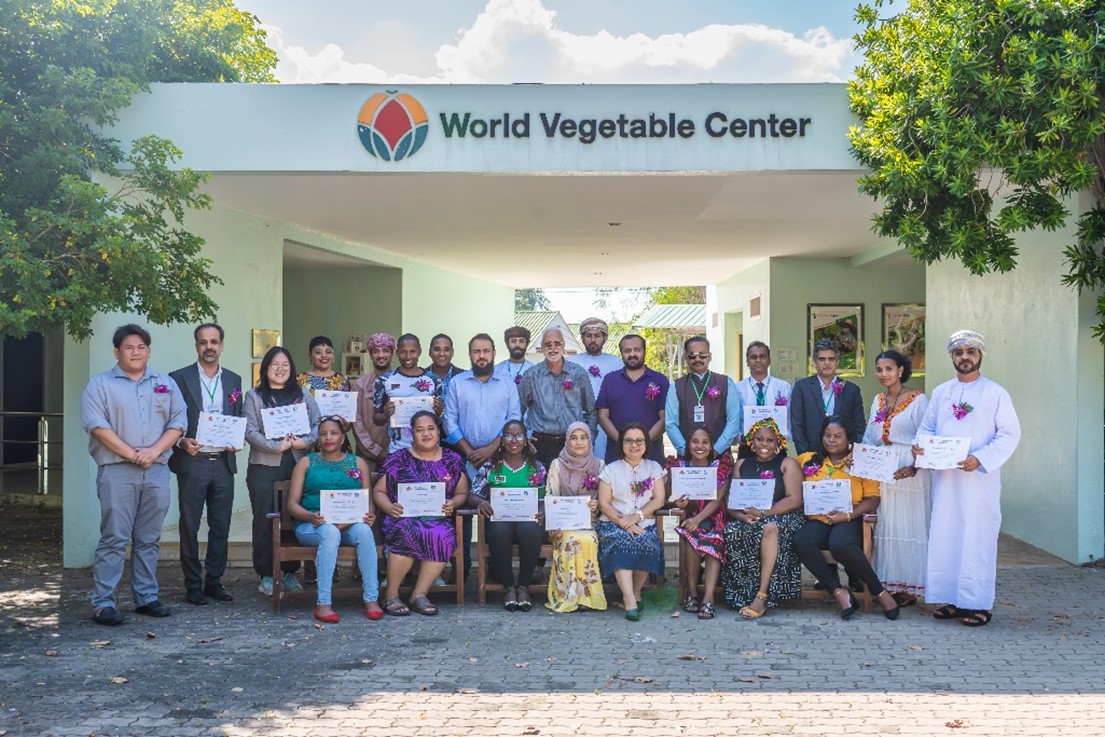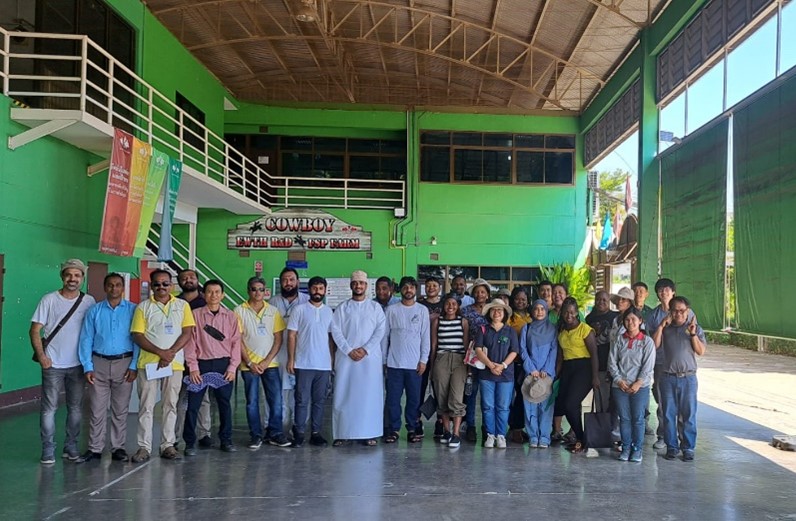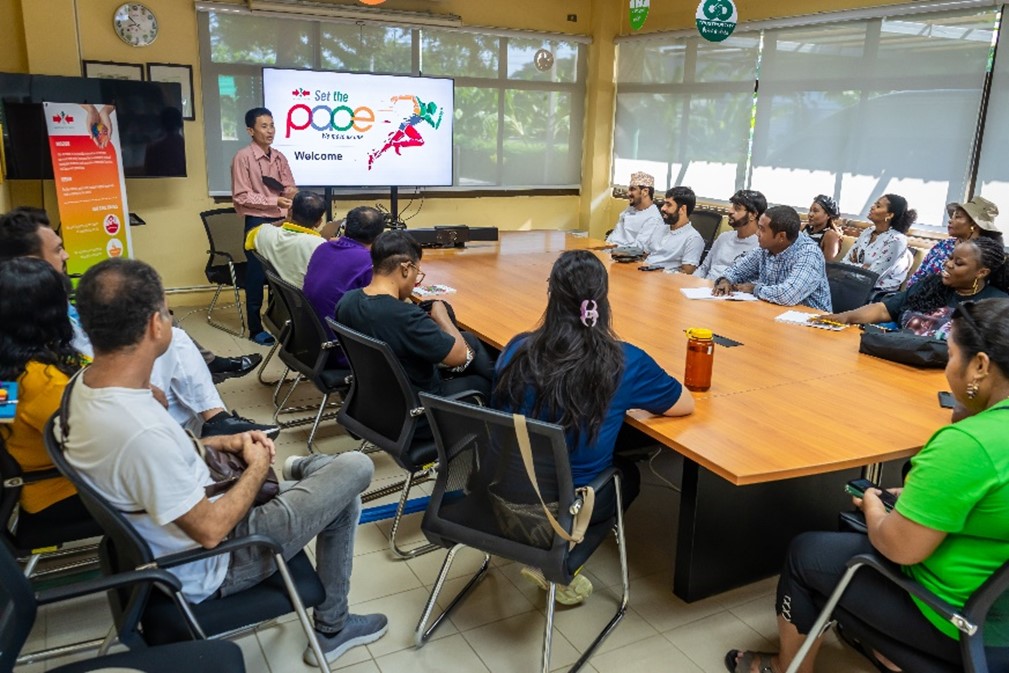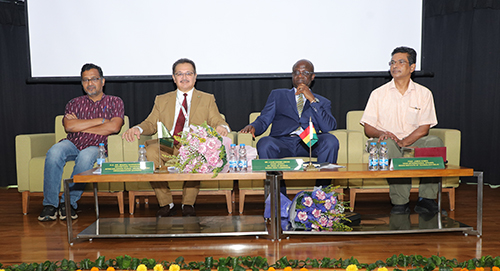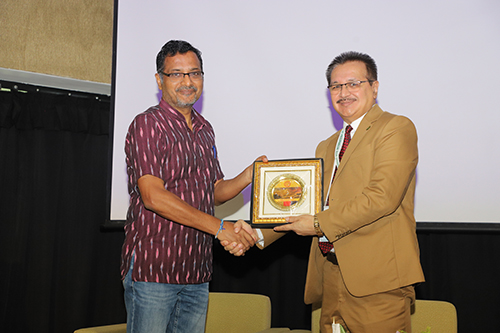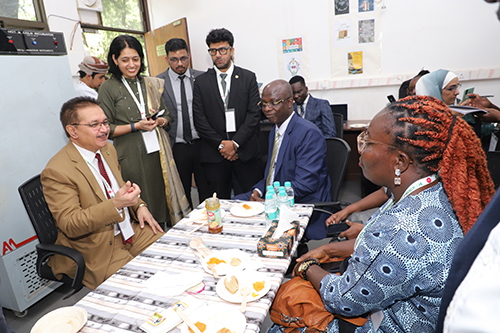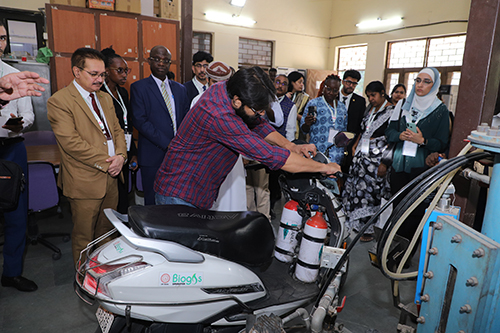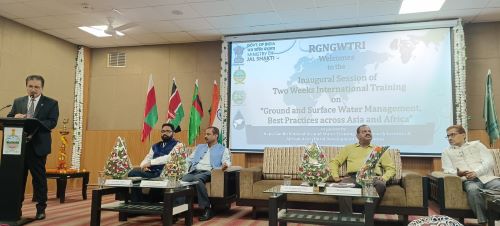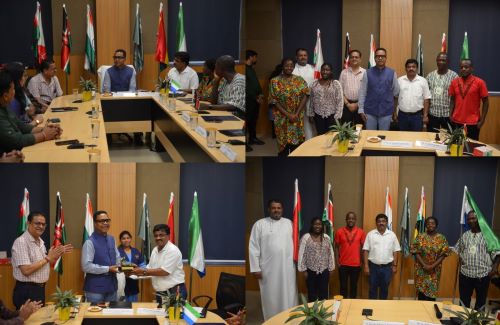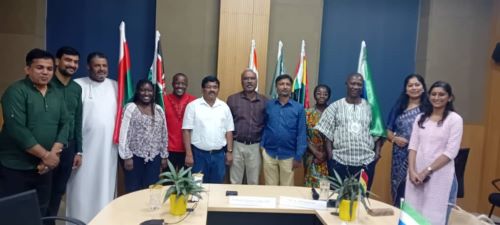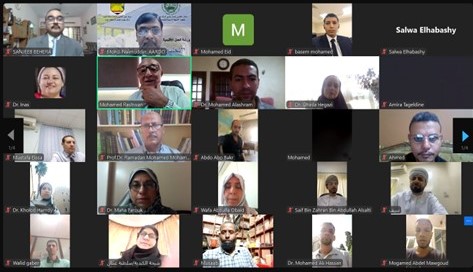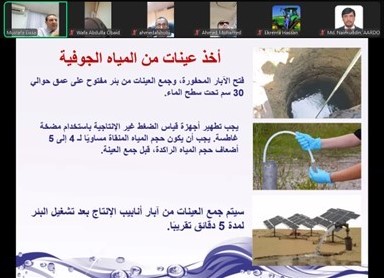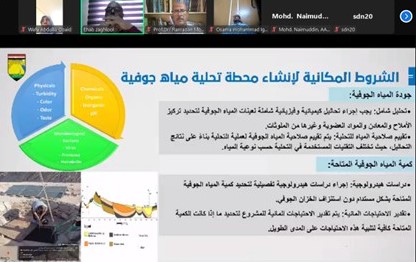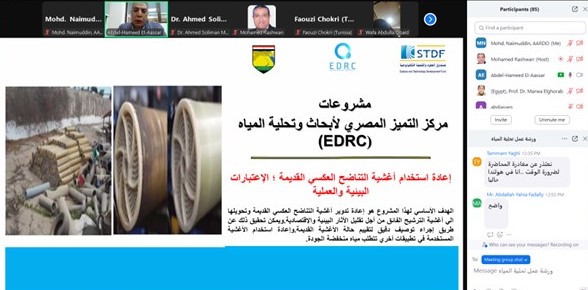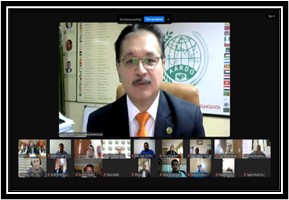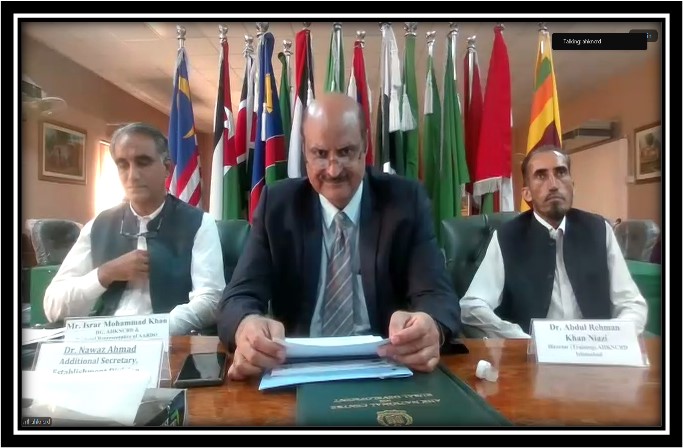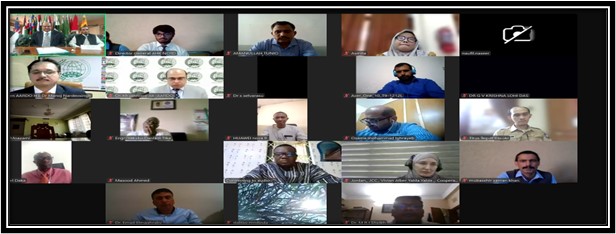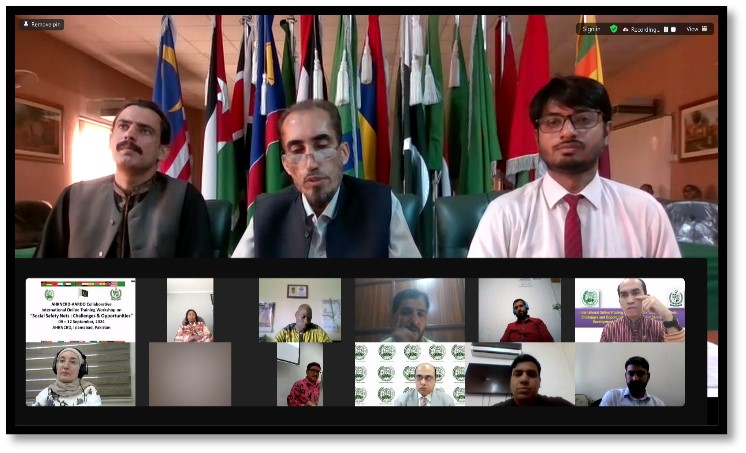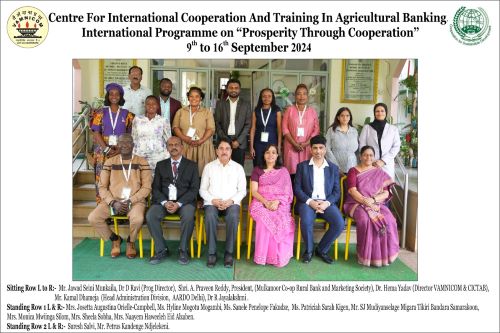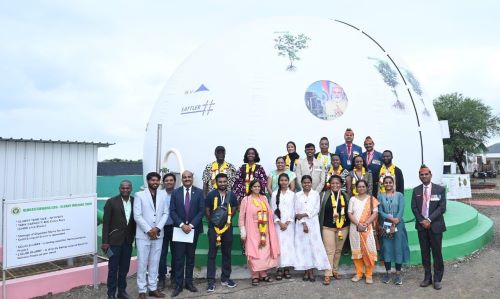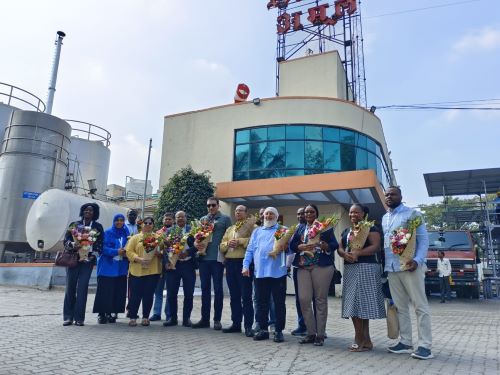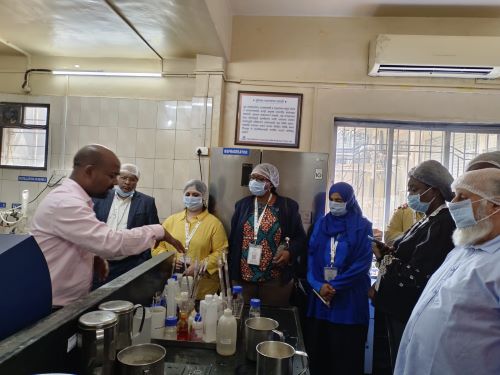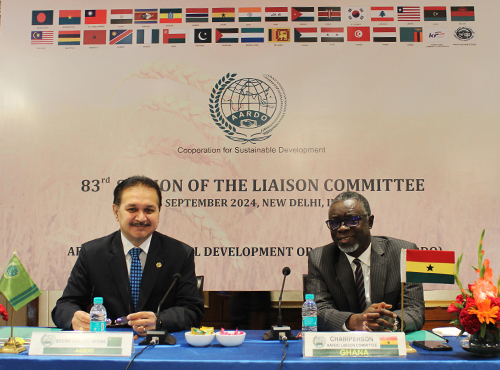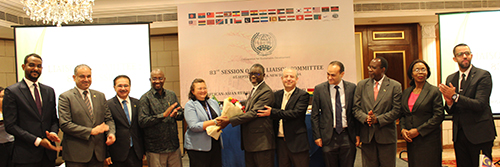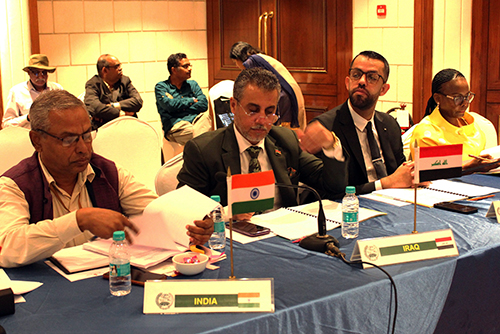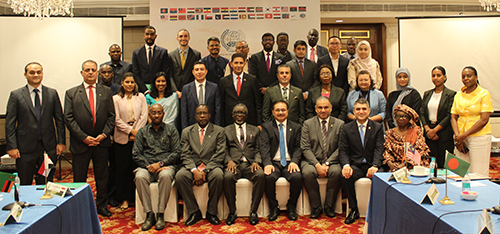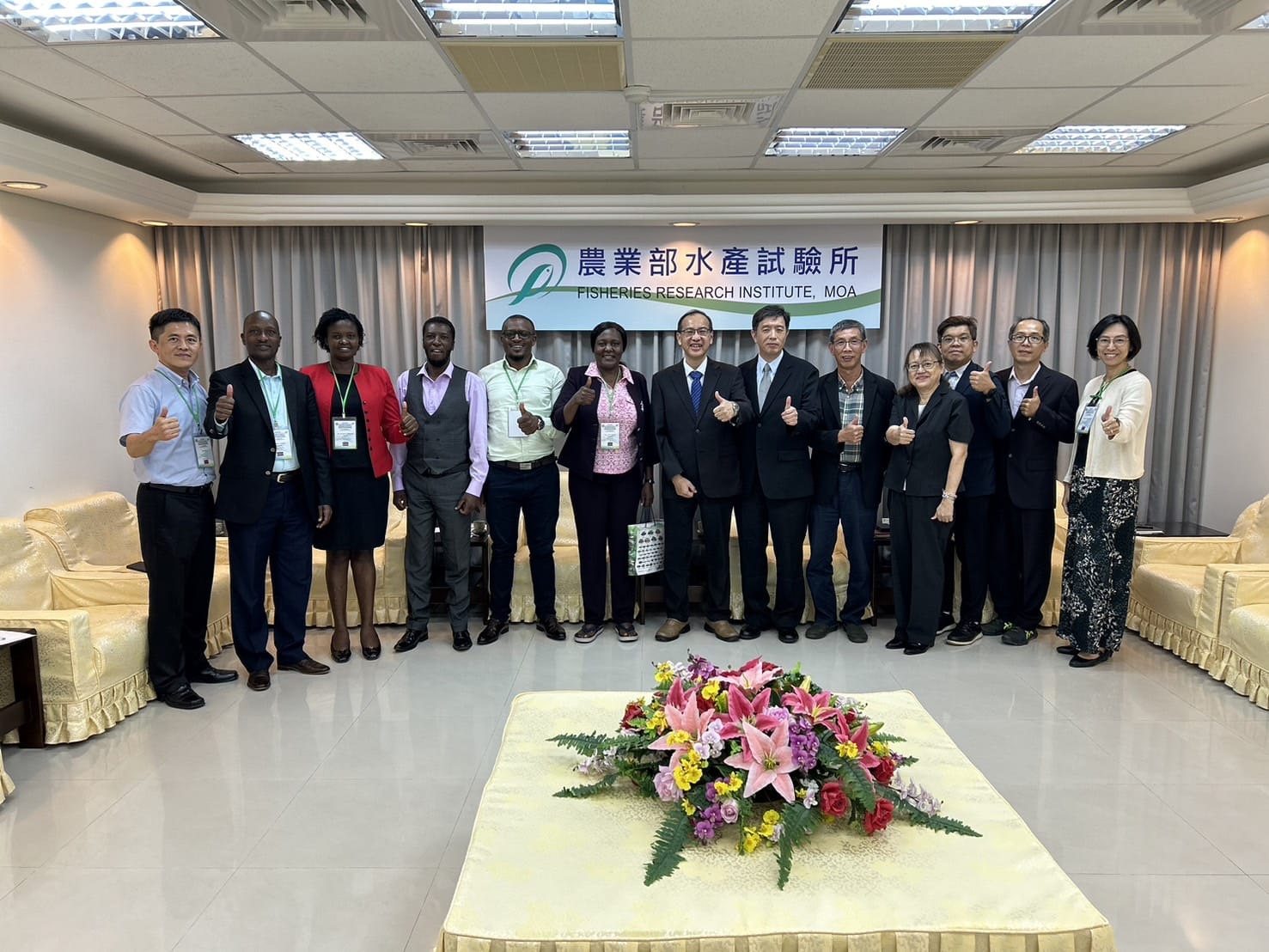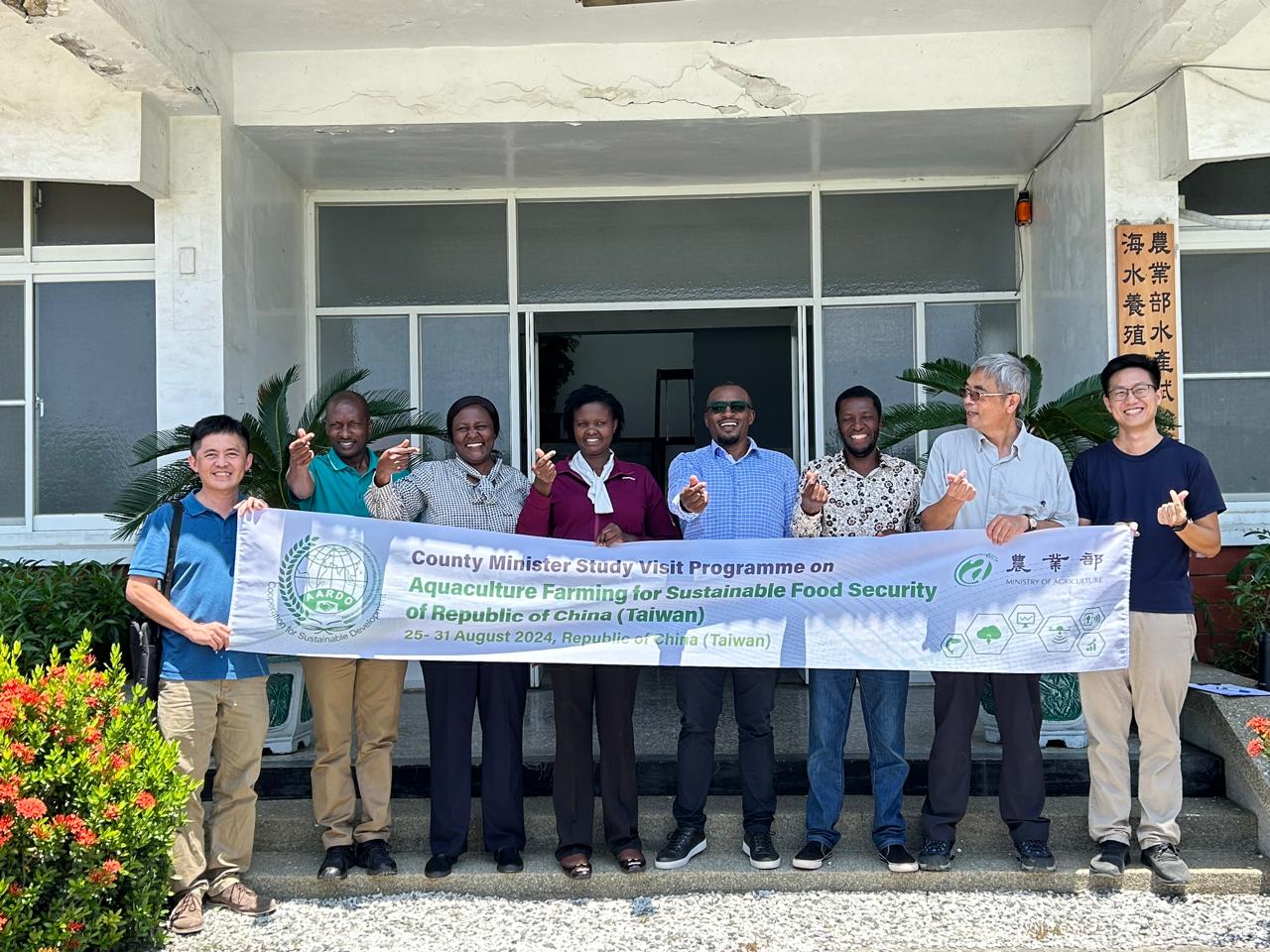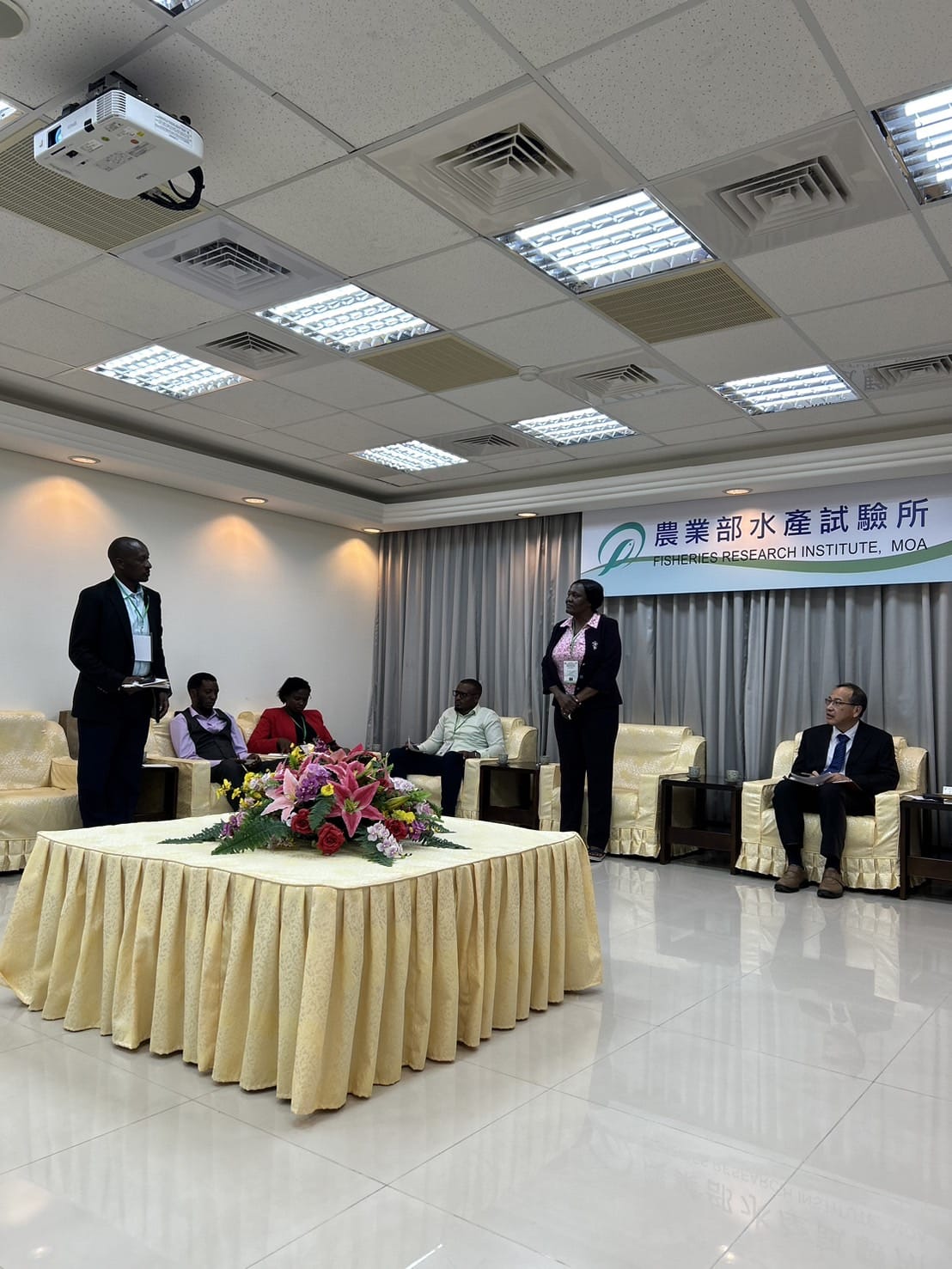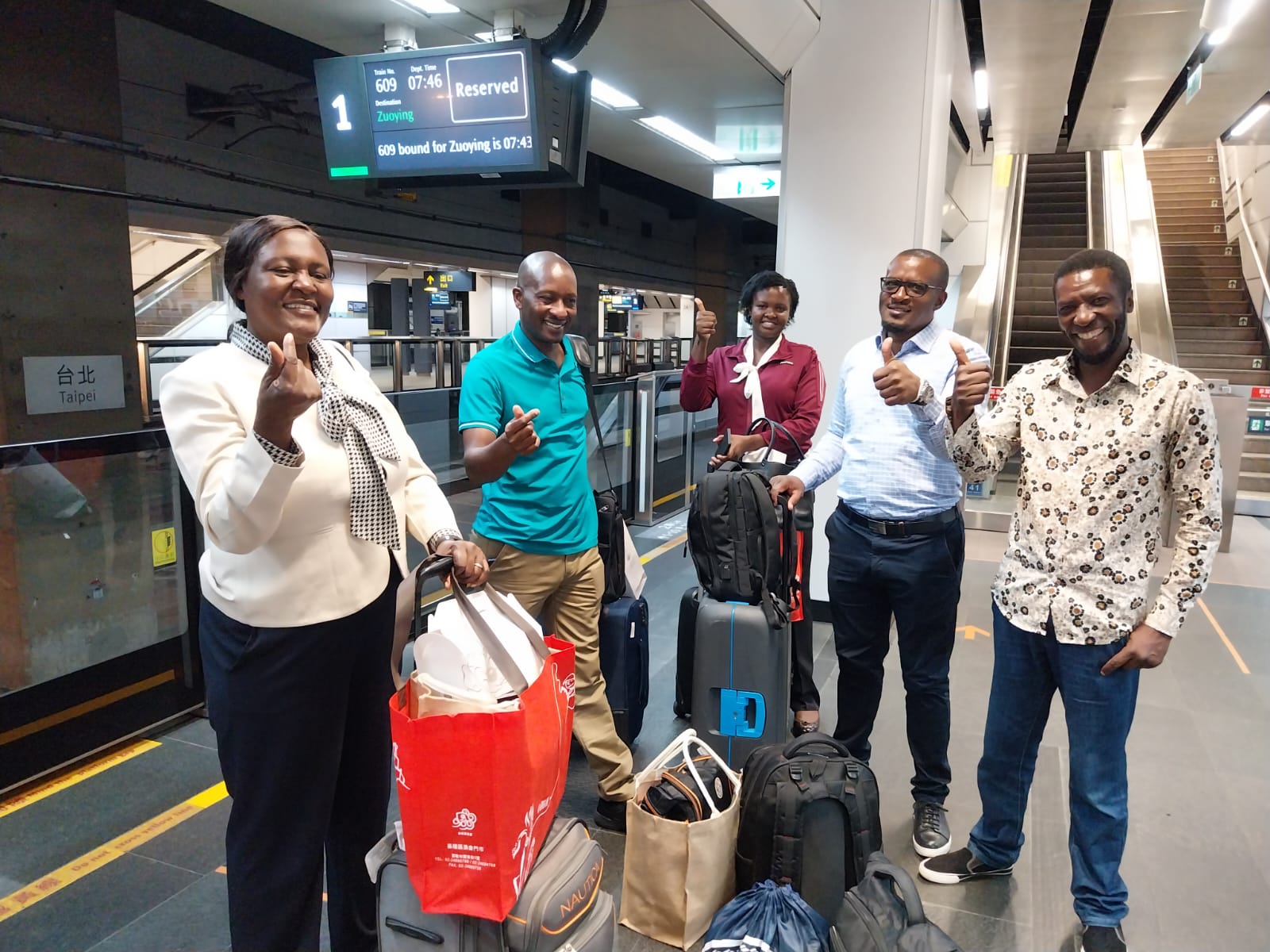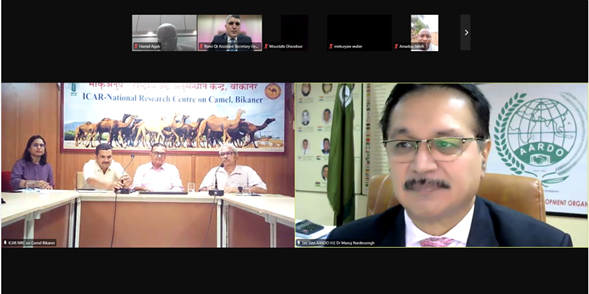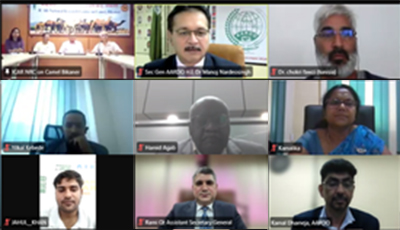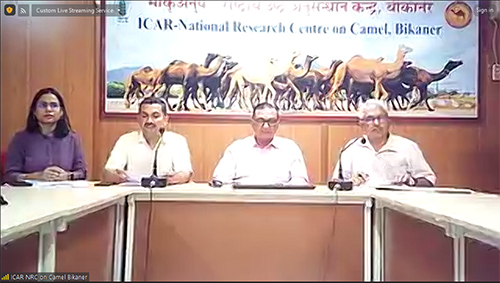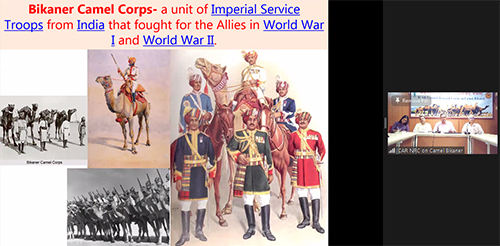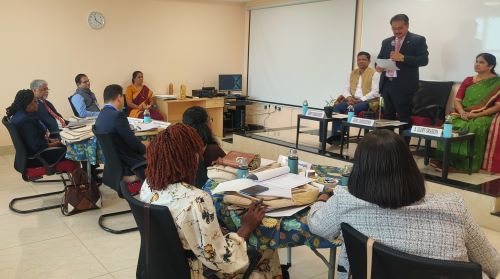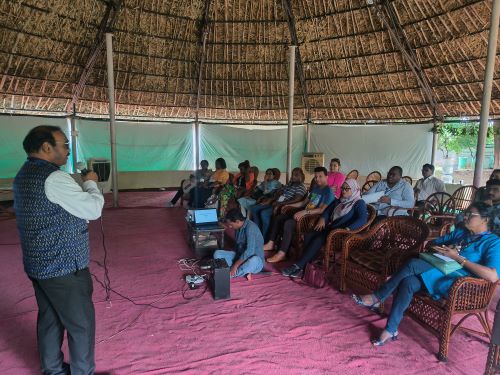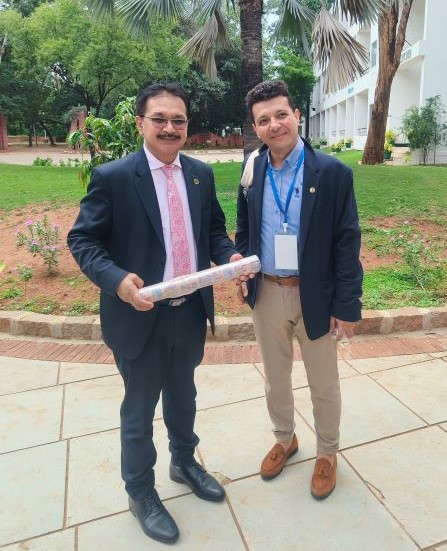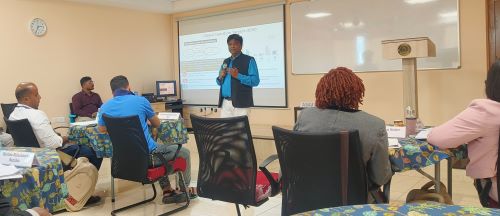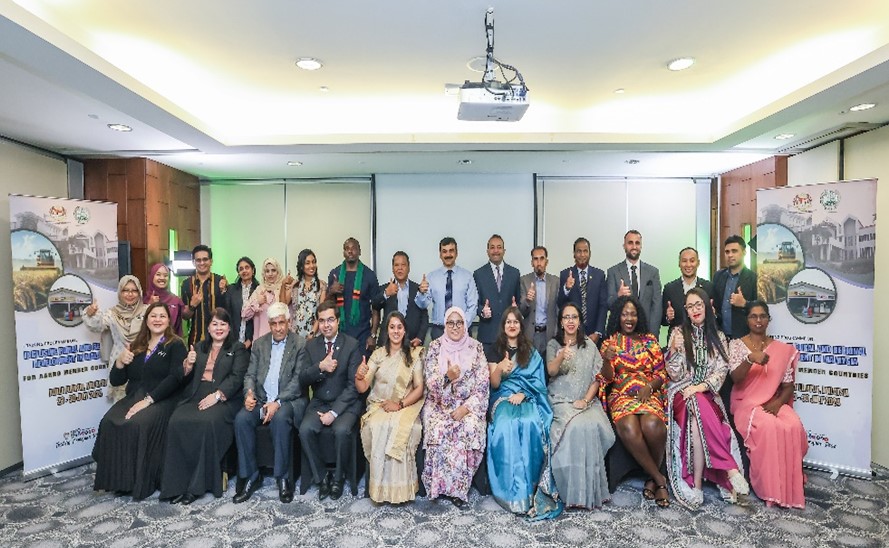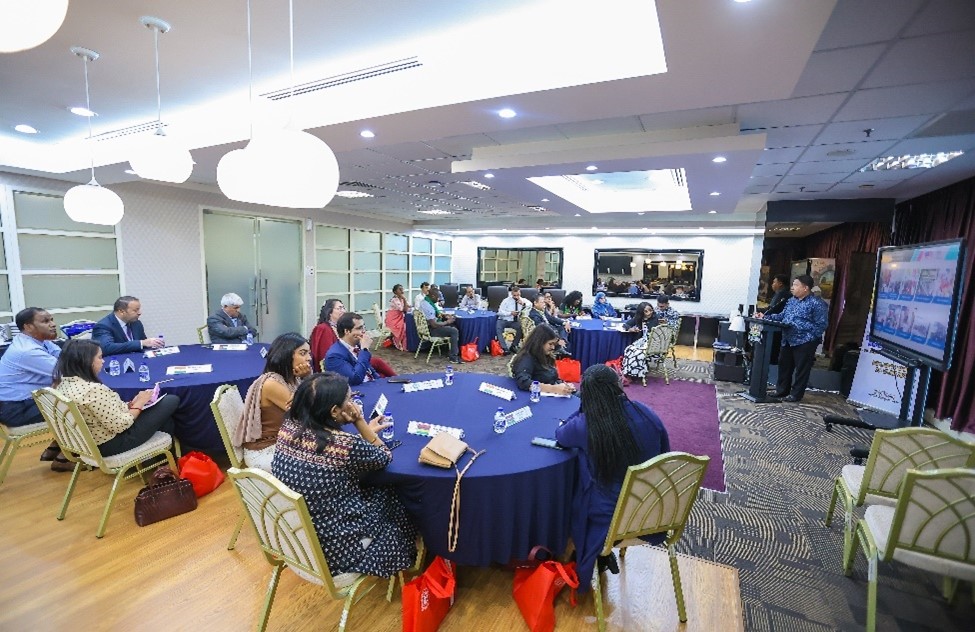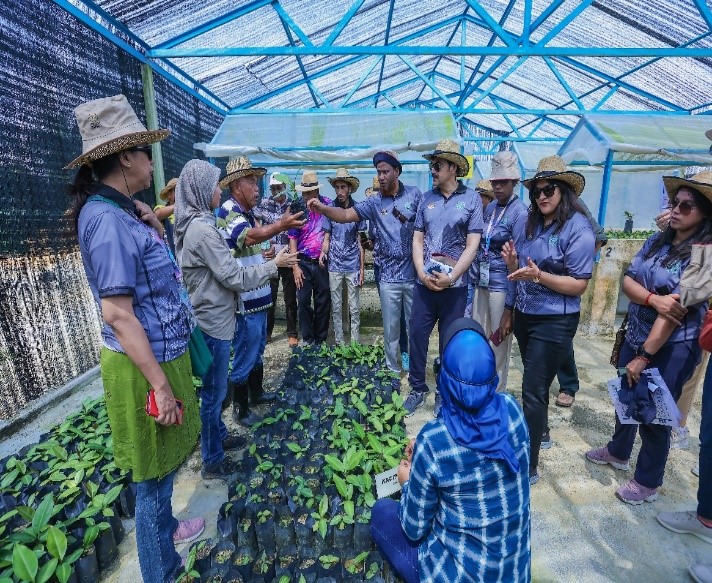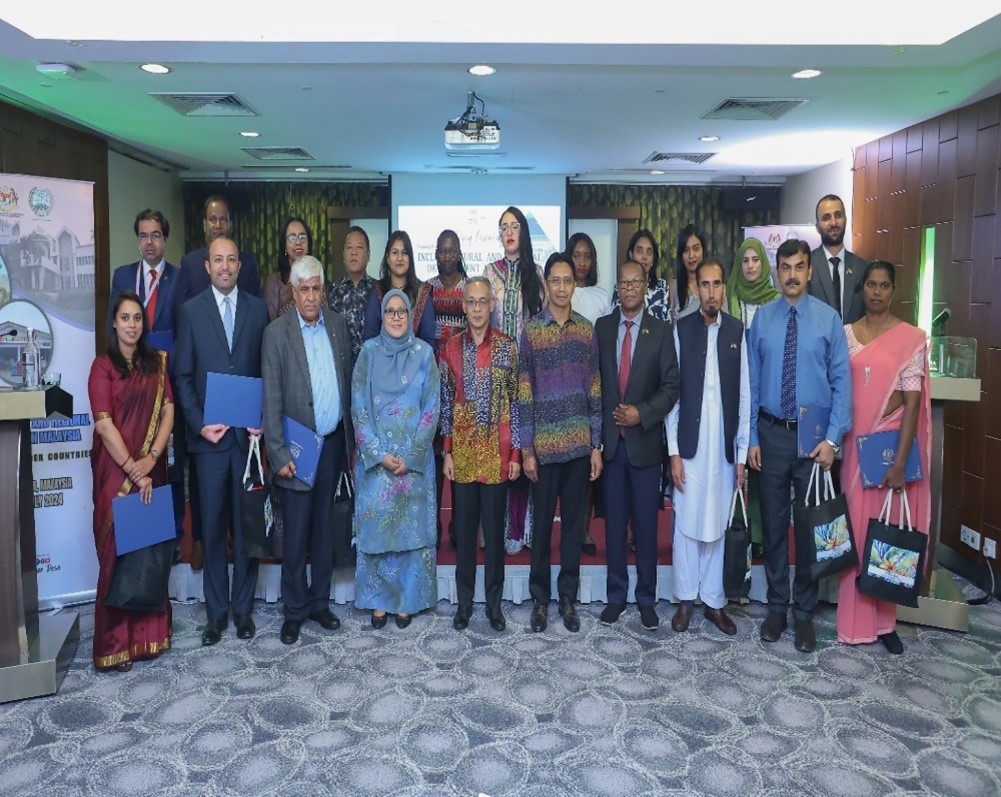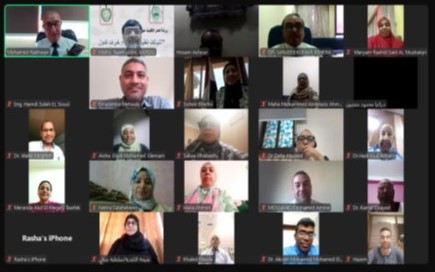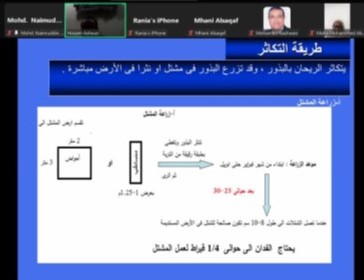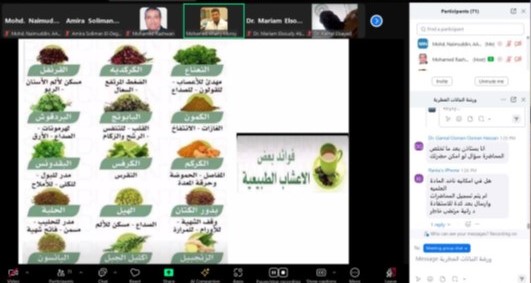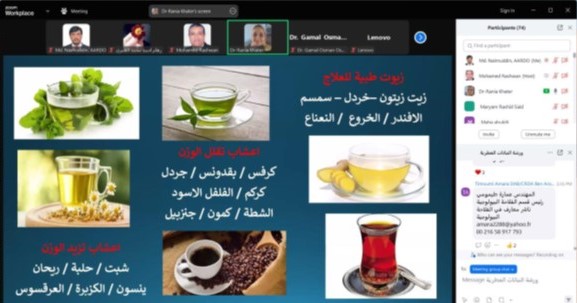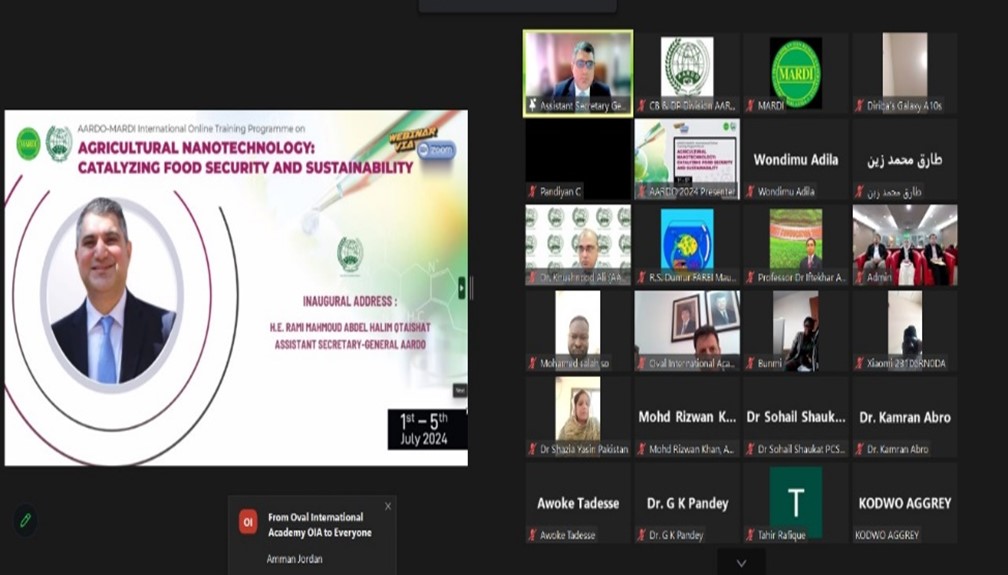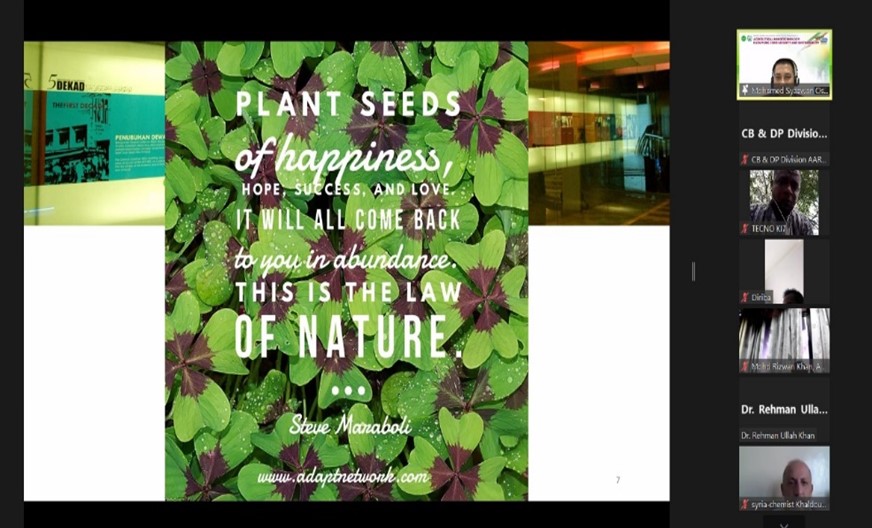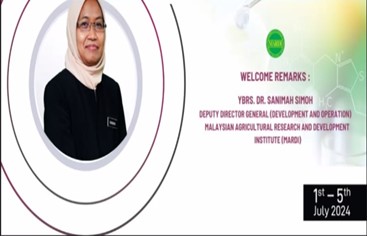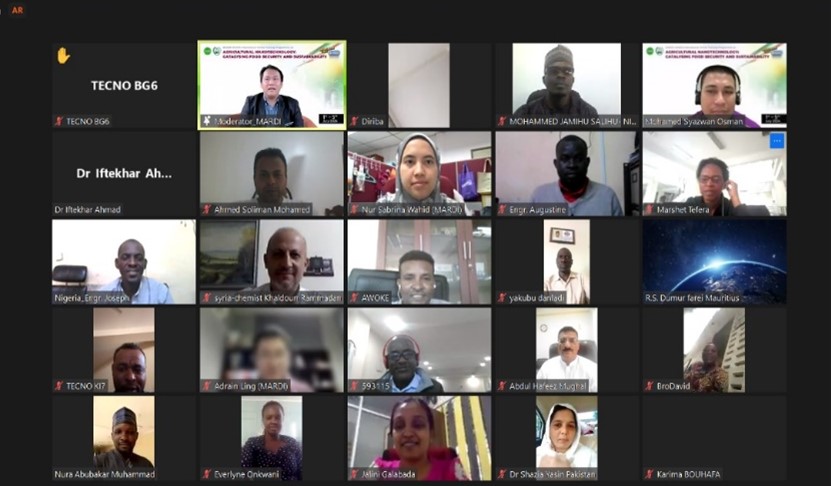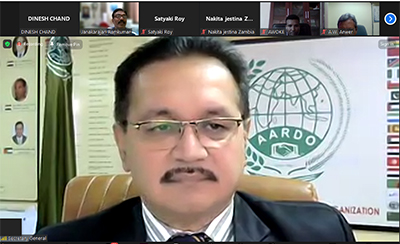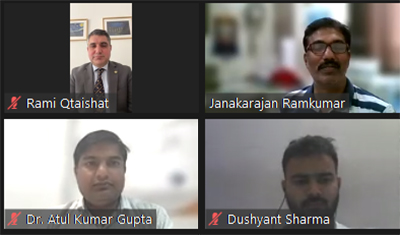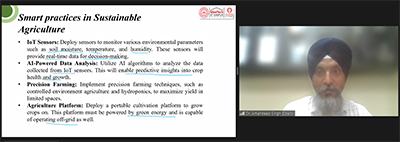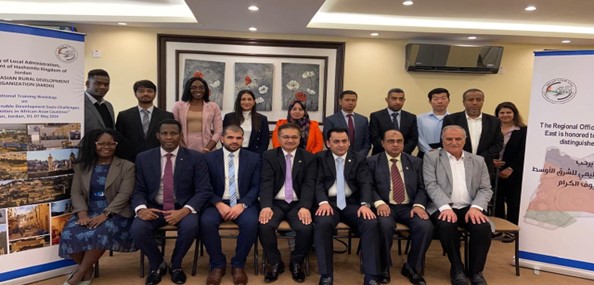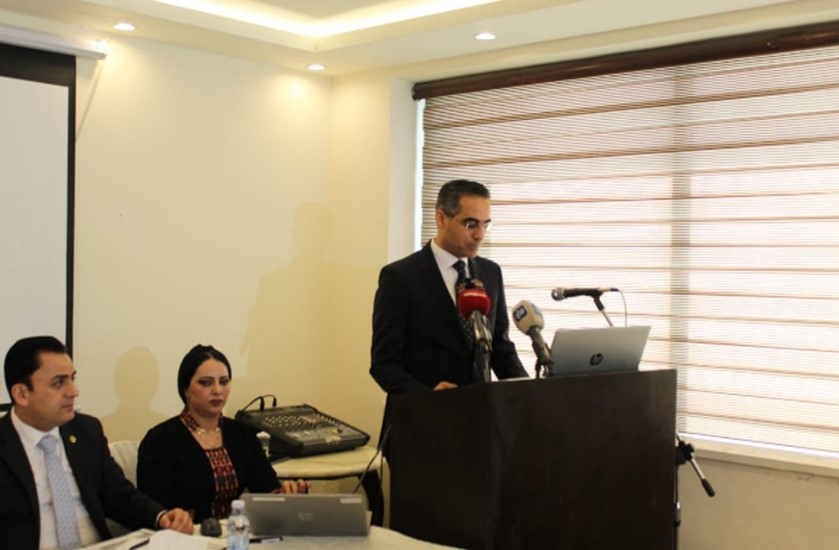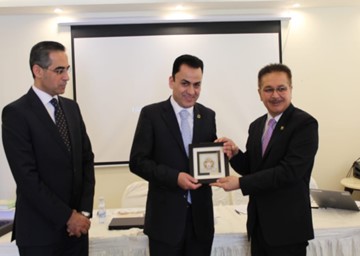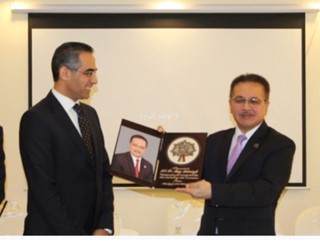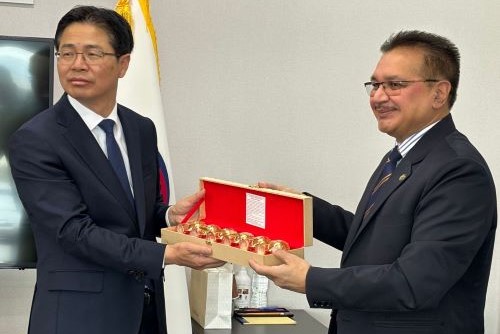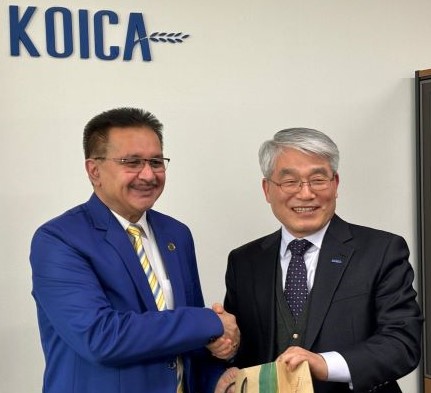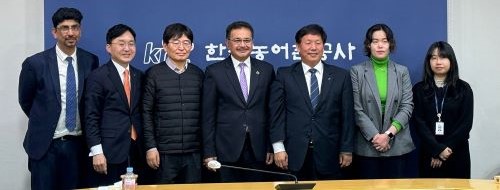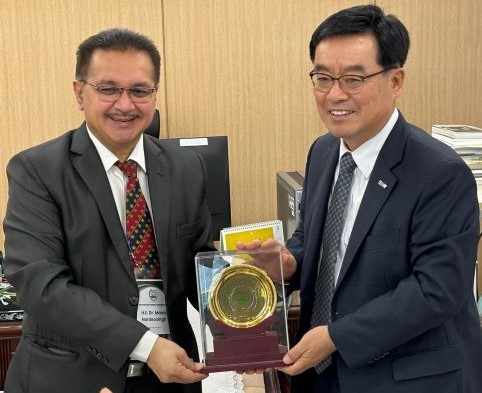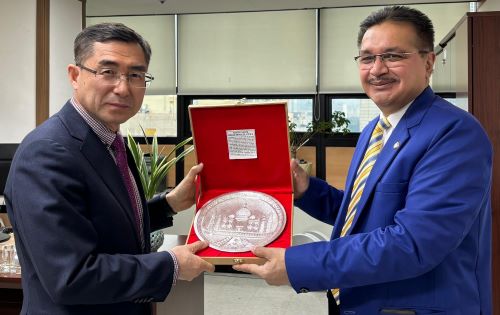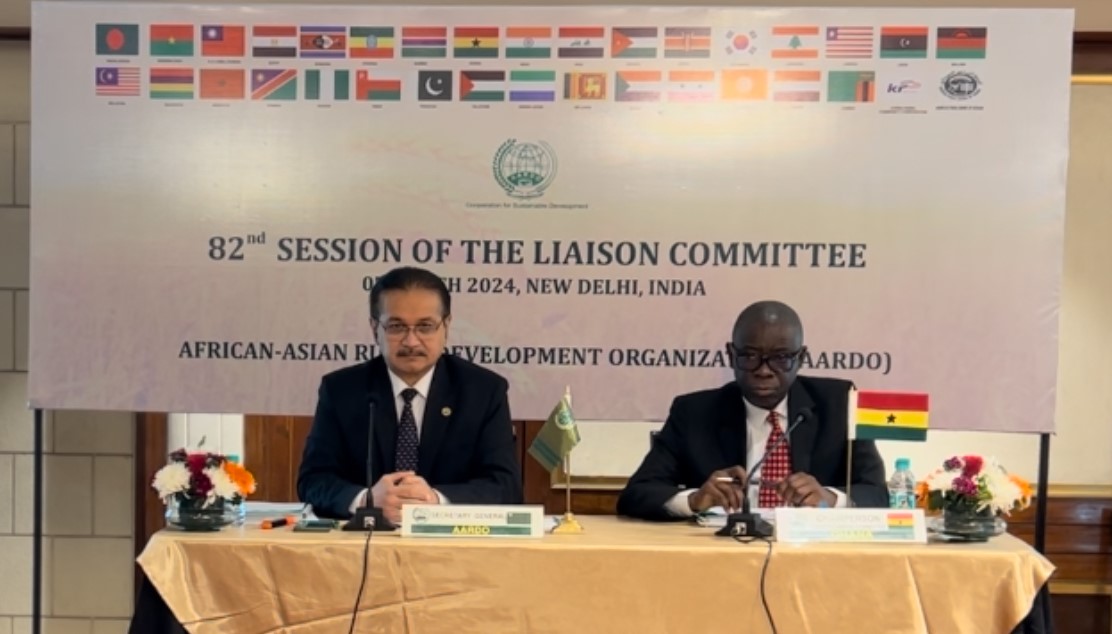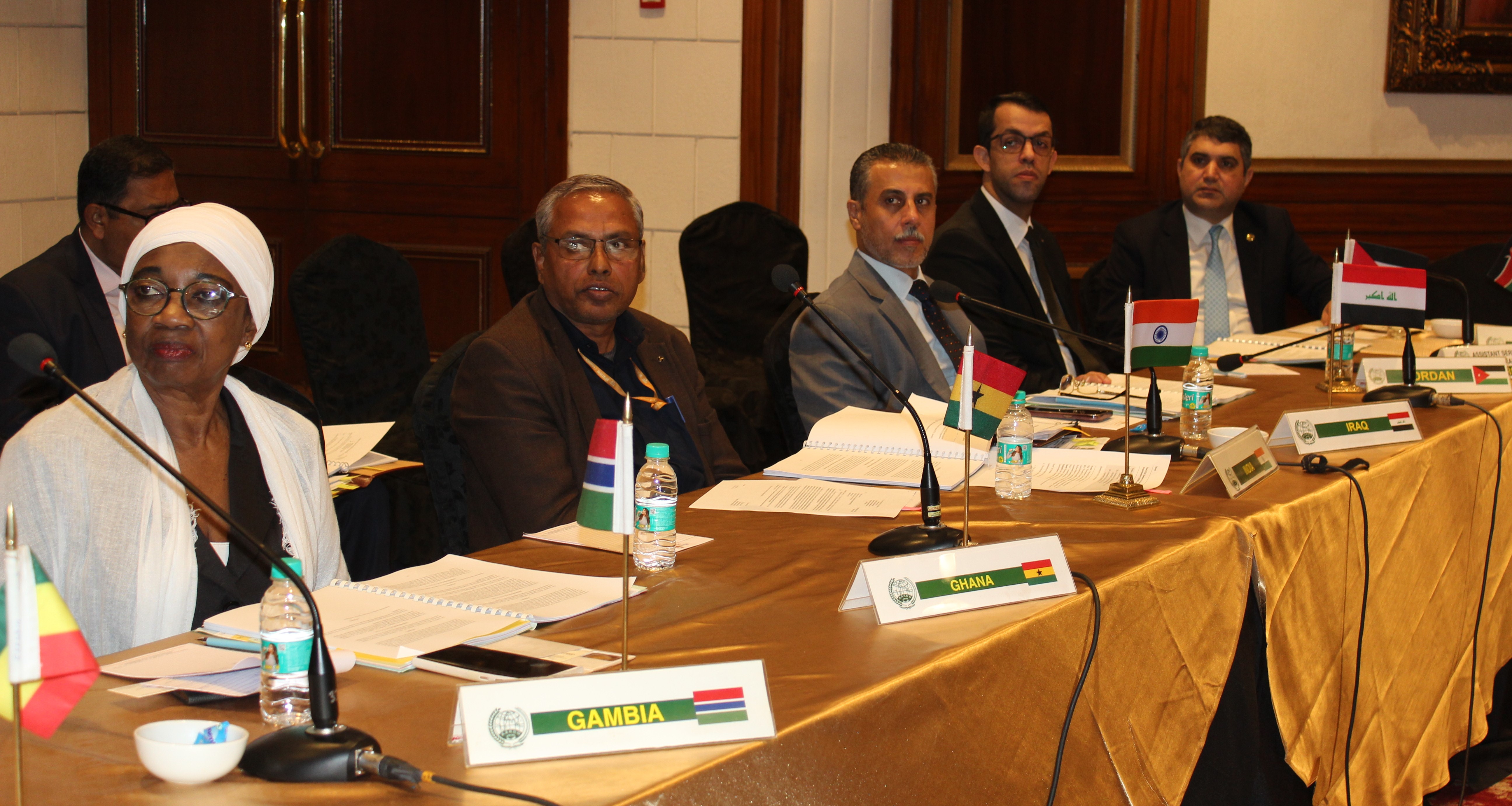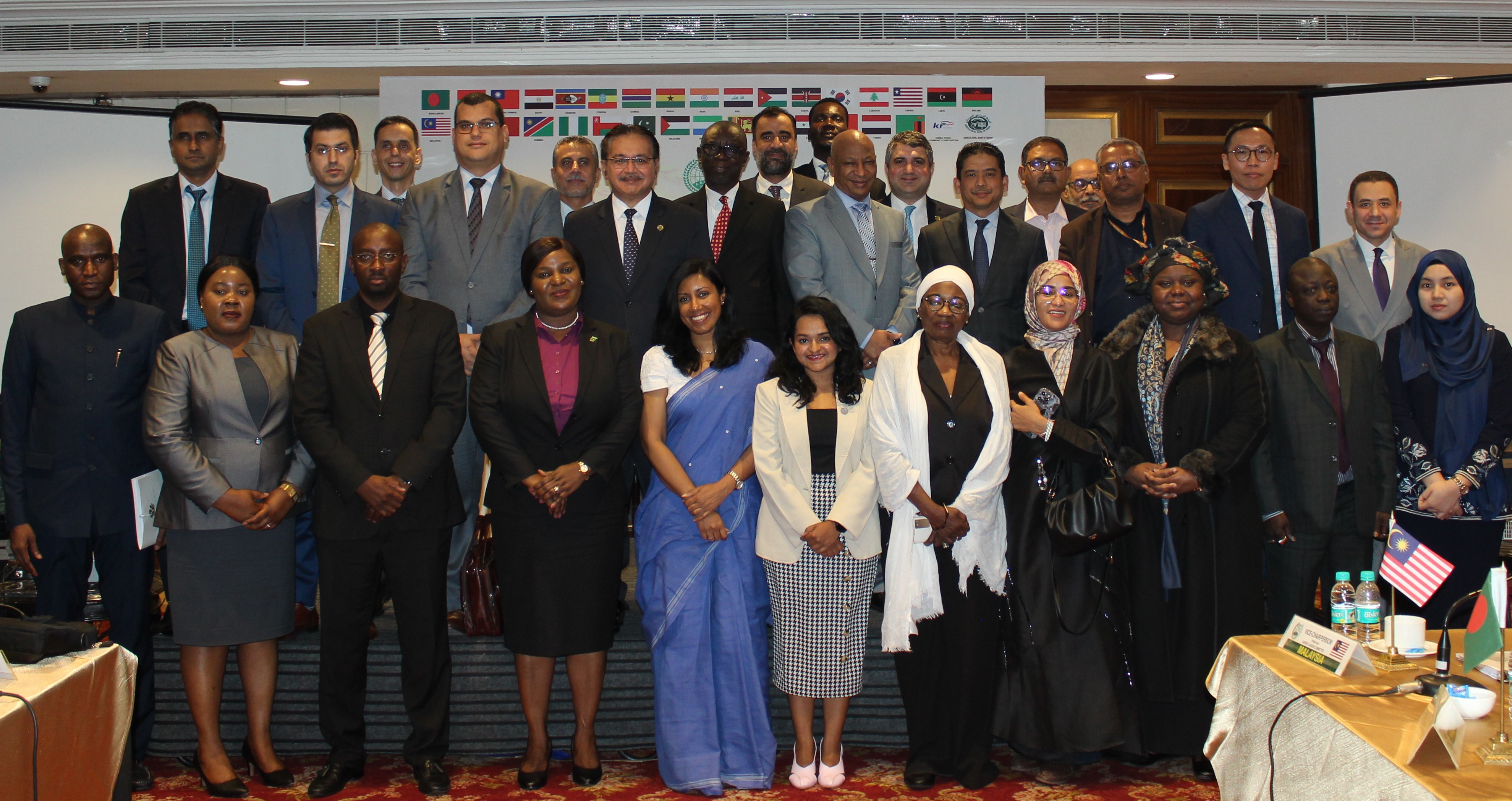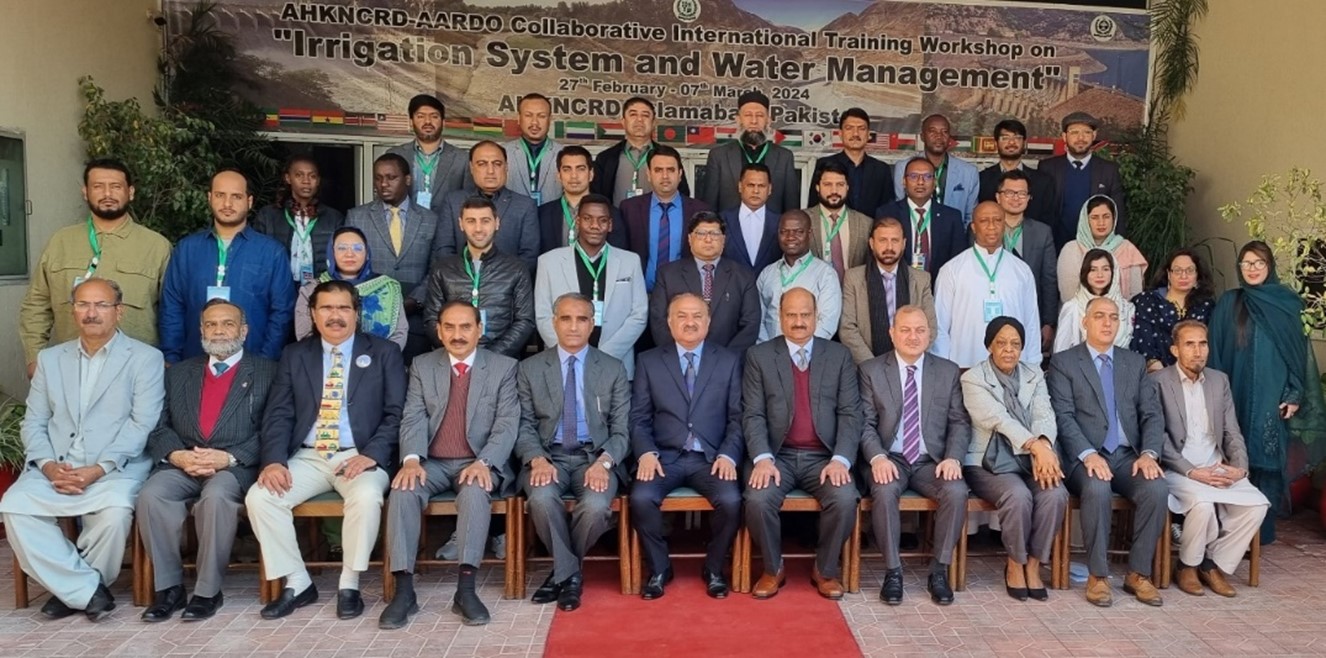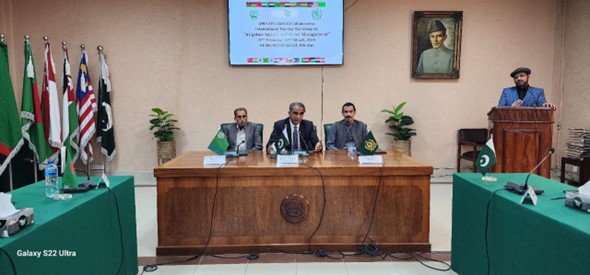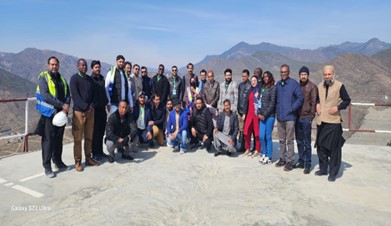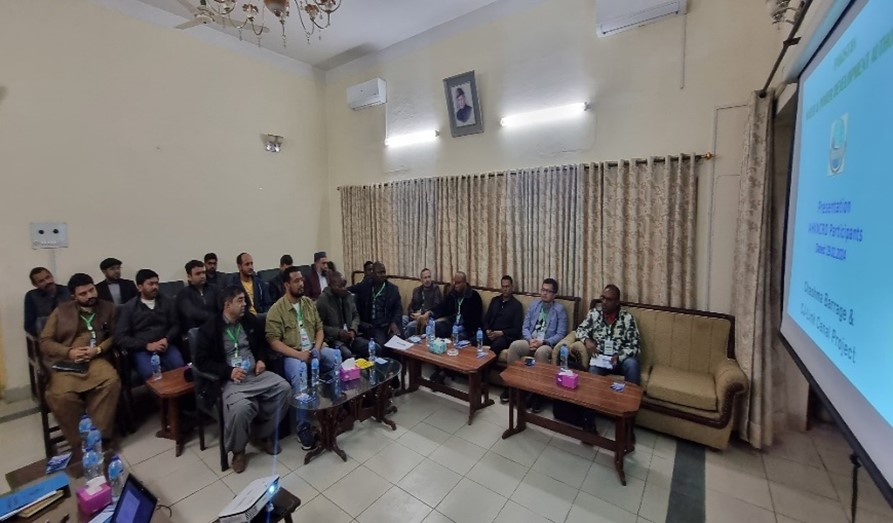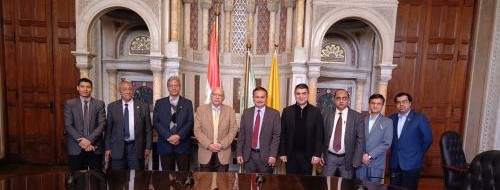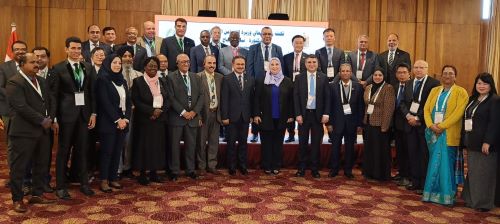Recent News
Executive Committee: 78th Session
24 February 2025
The 78th Session of the Executive Committee of AARDO was held at Hotel Lalit, New Delhi, India on 24 February 2025. This was the first session of the 21st Executive Committee. The Session was chaired by Shri Shailesh Kumar Singh, Secretary, Ministry of Rural Development, Government of India and Hon’ble President of the Executive Committee of AARDO.
The meeting was attended by all thirteen members of the Executive Committee, namely, i) People's Republic of Bangladesh, ii) Republic of China (Taiwan), iii) Arab Republic of Egypt, iv) Republic of Ghana, v) Republic of India, vi) Hashemite Kingdom of Jordan, vii) Republic of Kenya, viii) Malaysia, ix) Republic of Mauritius, x) Republic of Namibia, xi) State of Palestine, xii) Syrian Arab Republic and xiii) Republic of Zambia. His Excellency Dr. Manoj Nardeosingh, Secretary General, AARDO, attended the meeting as Member Secretary to the Executive Committee. After adoption of the provisional agenda, the Executive Committee, among others, approved the appointment of the auditors of the Organization for the years 2025, 2026 and 2027. With regard to venue for hosting the 79th Session of the Executive Committee some time in last quarter of 2025 or first quarter of 2026, after discussion, it was decided that the member countries willing to host the subsequent Executive Committee, will inform the AARDO Secretariat within three months.
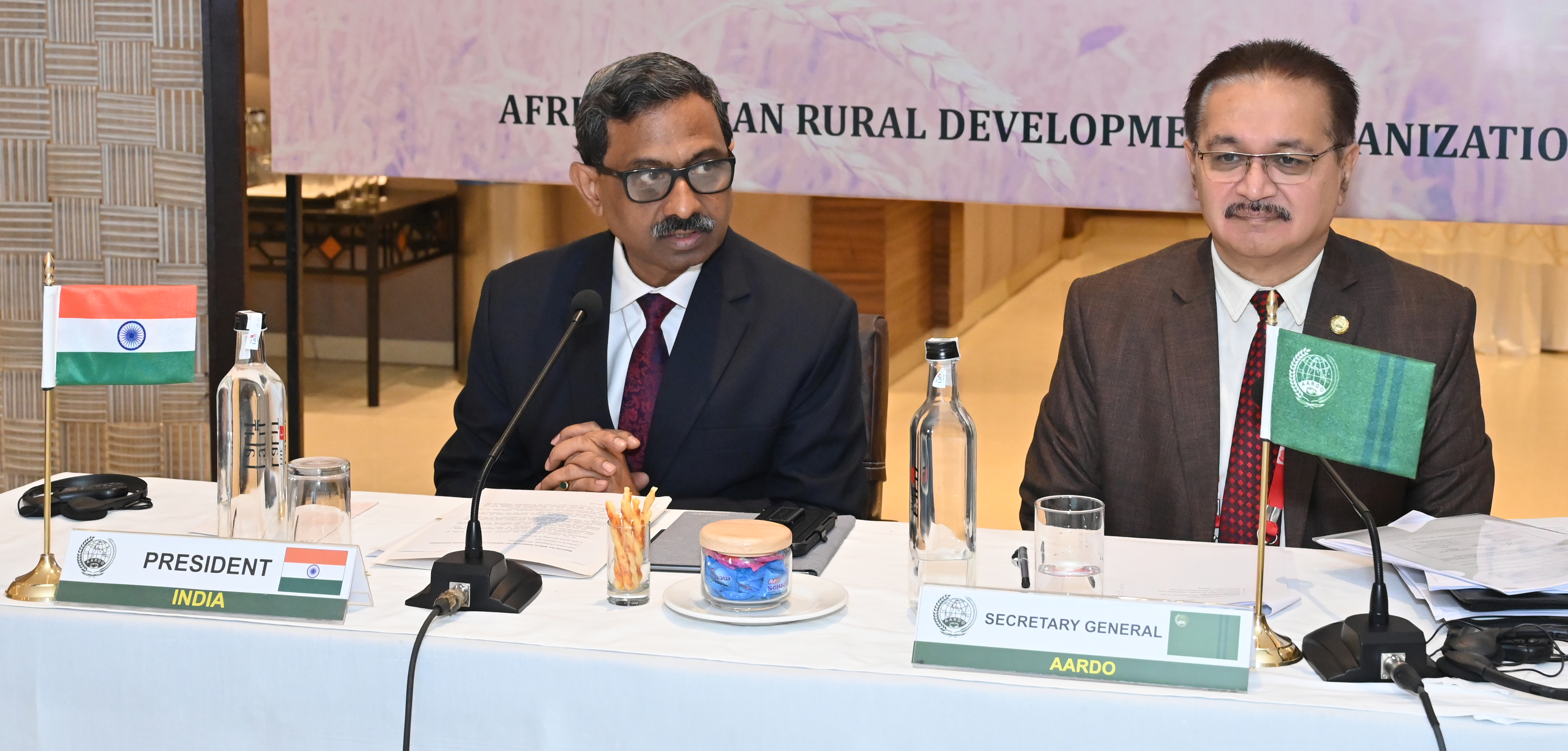
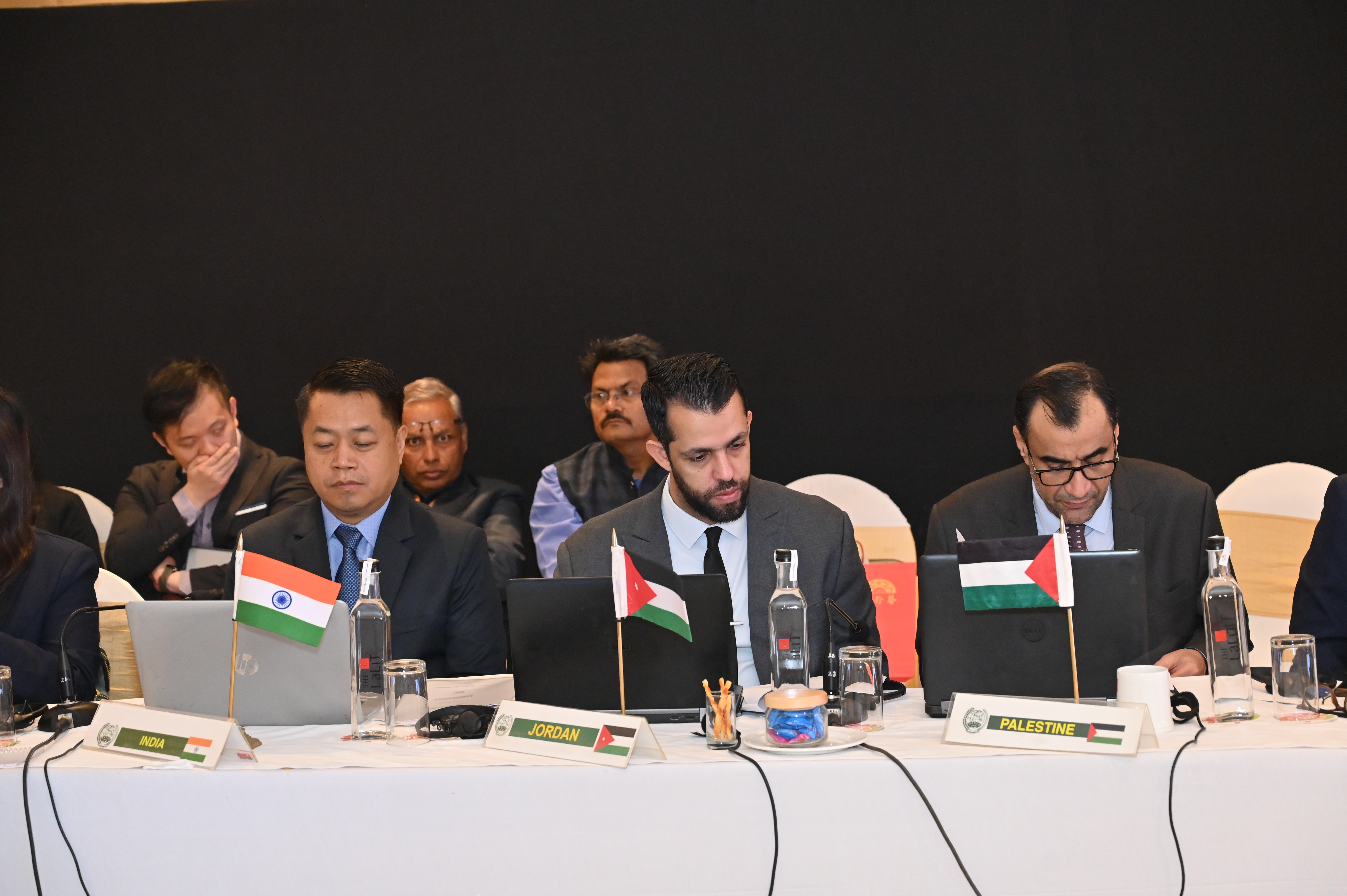
AARDO Conference: 21st General Session
21 - 24 February 2025
The 21st General Session of the African-Asian Rural Development Organization (AARDO) Conference was held in the Lalit Hotel, New Delhi, India from 21st to 24th February 2025. The inaugural session of the Conference began with the National Anthem of India as the Conference was inaugurated by H. E. Shri. Jagdeep Dhankhar, Vice President of Republic of India, who was the Chief Guest of the event.
The two Vice-Presidents of AARDO, namely, H. E. Datuk Hajah Rubiah Binti Haji Wang, Deputy Minister of Rural and Regional Development, Government of Malaysia from Asia and H.E. Mr. Kamel Galal, Ambassador of the Arab Republic of Egypt from Africa share the dais with the honourable Chief Guest. Further, H.E. Shri. Chandra S. Pemmasani, Minister of State for Rural Development and Communication, Government of India was equally present at the dais. H.E. Dr Manoj Nardeosingh, Secretary General, AARDO solemnly welcomed the Chief Guest, H. E. Shri. Jagdeep Dhankhar, Vice President of Republic of India; the Vice-Presidents of AARDO, Hon`ble Ministers and delegates from AARDO member countries.
The 21st General Session of the AARDO Conference was attended by twenty seven (27) member countries, namely: (i) People’s Republic of Bangladesh, (ii) Republic of China (Taiwan), (iii) Arab Republic of Egypt, (iv) Kingdom of Eswatini, (v) Republic of Gambia, (vi) Republic of Ghana, (vii) Republic of India, (viii) Republic of Iraq, (ix) Hashemite Kingdom of Jordan, (x) Republic of Kenya, (xi) Republic of Korea, (xii) Republic of Liberia, (xiii) State of Libya, (xiv) Malaysia, (xv) Republic of Malawi, (xvi) Republic of Mauritius, (xvii) Kingdom of Morocco, (xviii) Republic of Namibia, (xix) Federal Republic of Nigeria, (xx) Sultanate of Oman, (xxi) Islamic Republic of Pakistan, (xxii) State of Palestine, (xxiii) Democratic Socialist Republic of Sri Lanka, (xxiv) Republic of the Sudan, (xxv) Syrian Arab Republic, (xxvi) Republic of Tunisia and (xxvii) Republic of Zambia. Besides, Korean Rural Community Corporation (KRC), Republic of Korea attended the Conference as an Associate member. The Honorary Representatives of the Regional Offices of AARDO for the Far East, Republic of Korea and for the West Africa, Republic of Ghana also attended the Conference.
The inaugural function was followed by presentation of Country Statements by the following Honourable Ministers of the AARDO member countries: i) H.E. Shri. Chandra S. Pemmasani, Minister of State for Rural Development and Communication, Government of India; ii) H.E. Mr. Mandla Fana Tshawuka, Minister for Agriculture, Kingdom of Eswatini; ii) H.E. Mr. F. Sakila Nyumalin, Sr., Minister for Internal Affairs, Republic of Liberia; iv) H.E. Mr. Sayed Muhammad Aadil AMEER MEEA, Minister for Industry, SME and Cooperatives, Republic of Mauritius; v) H.E. Mr. Ezzeddine Ben Cheikh, Minister for Agriculture, Water Resources and Fisheries, Republic of Tunisia; vi) H.E. Ms. Wen Gane Tu, Deputy Minister, Ministry of Agriculture, Republic of China (Taiwan); and vii) H.E. Mrs. Rubiah Binti Wang, Deputy Minister, Ministry of Rural and Regional Development, Malaysia.
The Conference commenced its Business Session under the presidentship of Mr. Louis Obeng, Ag. High Commissioner, representing the Hon'ble Minister of Local Government, Chieftaincy and Religious Affairs, Republic of Ghana and Hon`ble President of the AARDO Conference.
After adoption of the Provisional Agenda, the following office bearers were unanimously elected for the triennium 2025-2027: the Hon`ble Minister of Rural Development, Government of India as the President; Hon`ble Minister for Local Government, Chieftaincy and Religious Affairs, Government of Republic of Ghana as the Vice-President of AARDO from Africa and Hon'ble Minister for Rural and Regional Development, Government of Malaysia as the Vice-President of AARDO from Asia, as recommended by the 77th Session of the Executive Committee. The newly elected dignitaries assumed the charge of their respective offices, accordingly.
The AARDO Conference formally confirmed the admission of two new members in AARDO, namely, Kingdom of Eswaitin as full member and Ekiti Chamber of Commerce, Industry, Mines and Agriculture from Federal Republic of Nigeria as associate member. It also reviewed the activities of AARDO, Member Relations, collaboration with International and Regional organizations for the triennium 2021-2023 and extended year 2024.
It approved the review of Membership Contribution for the triennium 2021-2023 and extended year 2024 and updated position of AARDO Corpus Fund, along with the report of the Fund Management Committee. With regard to the scale of membership contribution for 2025-2027, the AARDO Conference constituted a sub-committee to comprehensively and holistically assess matters relating to finance, budget, membership contribution, debt recovery and corpus fund of AARDO, as per, an approved Terms of Reference.
The AARDO Conference took note of all supports extended by various governments for implementing the Work Programme as well as enhanced financial contribution from esteemed Government of India for the capacity building programme of AARDO member countries. Further, an additional contribution to AARDO Corpus Fund from Republic of China (Taiwan) was noted by the Conference.
Moreover, the Conference approved the Work Programme of AARDO for 2025-2027 and amendments in the Constitution and the Rules of Procedures of AARDO. As a follow up, the Secretariat will carry out the necessary modifications. It also ratified the service contract the Secretary General of AARDO.
The Conference unanimously elected the 21st Executive Committee of AARDO for the triennium 2025-2027 as per the following composition: (i) Republic of India as the President; (ii) Republic of Ghana as the Vice President from Africa; and (iii) Malaysia as the Vice President from Asia. Further, (iv)Arab Republic of Egypt, (v) Republic of Kenya, (vi) Republic of Mauritius, (vii) Republic of Namibia, and (viii) Republic of Zambia, as members from Africa, and (ix) People's Republic of Bangladesh, (x) Republic of China (Taiwan), (xi) Hashemite Kingdom of Jordan (xii) State of Palestine, and (xiii) Syrian Arab Republic, as members from Asia.
The Conference unanimously accepted, in principal, the offer of Government of Republic of India to host the next (22nd) AARDO Conference to be held in the last quarter of 2027 and alternative venue could be either Republic of Liberia or Republic of Kenya or Republic of Iraq.
Executive Committee – 77th Session
19 - 20 February 2025
The 77th Session of Executive Committee of African-Asian Rural Development Organization (AARDO) was held on 19 - 20 February 2025 in the Hotel Lalit, New Delhi, India under the chairmanship of Mr. Amin Abdul-Rahaman, Chief Director, Ministry of Local Government, Chieftaincy and Religious Affairs, Government of Republic of Ghana, and Honorable President of the Executive Committee. The Session was inaugurated by the Hon’ble Chief Guest, H.E. Shri Shivraj Singh Chouhan, Minister for Rural Development and Agriculture & Farmers Welfare, Government of India on 19th February 2025. Prior to the inauguration, H.E. Dr. Manoj Nardeosingh, Secretary General of AARDO delivered his Welcome Address, followed by the Address of the Hon`ble President of AARDO Executive Committee.
The meeting was attended by all thirteen (13) members of the Executive Committee, namely,(i) People's Republic of Bangladesh (ii) Republic of China (Taiwan), (iii) Arab Republic of Egypt (iv) Republic of Ghana, (v) Republic of India, (vi) Republic of Kenya, (vii) Malaysia, (viii) Republic of Mauritius, (ix) Republic of Namibia (x) State of Palestine, (xi) Islamic Republic of Pakistan, (xii) Republic of Tunisia and (xiii) Republic of Zambia. Delegations from the State of Libya and Republic of the Sudan attended the meeting, as Observers. His Excellency Dr. Manoj Nardeosingh, Secretary General, AARDO attended the meeting as Member Secretary to the Executive Committee.
After adoption of the Provisional Agenda, the Executive Committee approved the decisions/recommendations and suggestions of the 80th, 81st and 82nd Sessions of Liaison Committee and adopted their final reports and took note of that the report of the 83rd Session of Liaison Committee will be considered for formal approval by the subsequent session of the Executive Committee.
The Executive Committee recommended to the 21st General Session of AARDO Conference the Hon’ble Minister for Rural Development, Government of India for the President of AARDO and Hon'ble Minister for Rural and Regional Development, Government of Malaysia as the Vice-President of AARDO from Asia, for the triennium 2025-2027. Similarly, in accordance with the conventions, the outgoing President, Honourable Minister for Local Government, Chieftaincy and Religious Affairs, Government of Republic of Ghana was recommended as the Vice-President of AARDO for Africa for the triennium 2025-2027.
The Committee also approved the Review of Activities, Membership Contribution, Member Relations and enhancement of collaborations with International/ Regional organizations for the period May 2023 – December 2024 and audited Income and Expenditure for 2023 and noted its financial position of AARDO as on 31 December 2024. The Committee took note of the position of AARDO Corpus Fund and recommended the Report of Fund Management Committee for consideration of the 21st AARDO Conference. It also ratified seven MoUs that AARDO signed with other organizations/institutions over the reporting period.
The Executive Committee ratified the Service Contract of the Secretary General of AARDO. It also consented to recommend to the 21st AARDO Conference to extend the term of the incumbent Assistant Secretary General in order to enable to be co-terminus the posts of Secretary General and Assistant Secretary General so as to ensure equity and fairness to both continents, Africa and Asia.
The Committee also recommended to the 21st AARDO Conference, the Work Programme for the triennium 2025-2027 and to set up a Sub-committee to comprehensively assess matters relating to finance, budget, membership contribution, debt recovery and corpus fund. The Committee further approved the principle of adopting Programme Based Budgeting (PBB).
AARDO-MARDI Online Training Programme on “Advancements in Food Technologies: Bridging Innovation with a Sustainable Future”, MARDI, Malaysia
25 - 29 November 2024
The integration of traditional culinary heritage with modern food technology is revolutionizing the food industry. This includes the advancement of functional foods, fermentation and enzyme technology, plant-based products, retort processing technology, high-pressure processing (HPP), and advancements in food packaging. Functional foods are enriched with bioactive compounds for health benefits, incorporating herbal ingredients to address specific health concerns. Plant-based product development is also on the rise, focusing on sustainability and animal welfare. Alternative protein sources like cultured meat, insect protein, and algae-based products are gaining traction, offering nutritious and environmentally friendly food options, while reducing reliance on conventional animal agriculture.
The food processing industry in Malaysia is embracing cutting-edge technologies to enhance efficiency, quality, and safety. Innovative food processing technologies, particularly retort processing and high-pressure processing (HPP), are enhancing food safety and preservation beyond traditional methods.
Considering the importance of the subject, AARDO, in collaboration with Malaysian Agricultural Research and Development Institute (MARDI), organized an Online International Training Programme on “Advancements in Food Technologies: Bridging Innovation with a Sustainable Future”, during 25-29 November 2024, for capacity enhancement, through transfer of knowledge and advancement in food industry.
The inauguration of the programme was virtually officiated by H. E. Dr. Manoj Nardeosingh, Secretary General, AARDO, while the welcome remarks were delivered by YBhg. Dato’ Dr. Mohammad Zabawi Bin Abdul Ghani, Director General, Malaysian Agricultural Research and Development Institute (MARDI), on 25th November 2024. A vote of thanks was delivered by Mr Mohsin Ali, Programme Facilitator, AARDO.
During the inauguration, H. E. Dr Manoj Nardeosingh, Secretary General, AARDO underscored the importance of adapting cutting-edge innovative technologies aimed at improving agricultural productivity, reducing food loss and waste and promoting environmentally friendly practices, leading to strengthening the of resilience of food systems against climate change. Further he understand that AARDO remain steadfast in its commitment to capacity building, knowledge sharing, and policy advocacy in areas critical to rural development. While YBhg. Dato’ Dr. Mohammad Zabawi Bin Abdul Ghani, Director General, MARDI, during his address, expressed his gratitude to AARDO for continued support in organizing the programmes.
The programme received an overwhelming response from twenty-three (23) member countries and was attended by one hundred fifty-two (152) experts and functionaries from Bangladesh, Burkina Faso, Egypt, Ethiopia, Gambia, Ghana, India, Iraq, Jordan, Kenya, Lithuania, Malawi, Mauritius, Morocco, Nigeria, Oman, Pakistan, Palestine, Philippines, Sri Lanka, Sudan, Tunisia and Zambia.
The program highlighted Malaysia's development in Food Technologies and provided a glimpse to the participants on some of the key topics through the sessions. The interactive training programme, spread over a week, comprised of 8 lectures which included topics; such as, Functional Food for Elderly and Sedentary Lifestyle, NCD Management, Enhancing Hidden Nutrient and Benefits Through Enzyme and Fermentation’s Miracle, Plant-Based Product Innovations / Alternative Protein, Sterilization Technique as Food Preservation Technology and Advanced Packaging Technology.
The training programme successfully concluded with positive feedback from the participants and an evaluation by Programme Director, MARDI followed by remarks by Programme Facilitator, AARDO on 29th November 2024.
Offline International Training program on 'Emerging Trends in Agricultural Technologies'”, Indian Institute of Technology Kharagpur (IIT-KGP), India
17- 26 November 2024
An Offline International Training program on 'Emerging Trends in Agricultural Technologies'”, was organized by AARDO in collaboration with Indian Institute of Technology Kharagpur (IIT-KGP), India during 17- 26 November 2024.
The Inaugural session on 17 November 2024 began with the welcome address by Prof. Gourav Dhar Bhowmick, Assistant Professor, IIT, Kharagpur, who gave a brief overview of the program. Thereafter, Prof. Haimanti Banerji - Associate Dean (CE&T) and Prof. Madan Kumar Jha, Head of the Agricultural and Food Engineering Department addressed the trainees. They focused on the exchange of knowledge with IIT Kharagpur and its international collaborations. The inaugural session concluded with a vote of thanks by Prof. Niharika Sahoo Bhattacharya. The programme was attended by 10 participants from 10 AARDO Member countries namely, Egypt, Ghana, India, Kenya, Liberia, Malaysia, Namibia, Oman, Sri Lanka and Syria.
The eight-day technical sessions focused on innovations in agriculture and sustainability, covering AI and ML applications, and non-thermal food processing for improved safety and quality. Key themes included salt-tolerant rice analysis, carbon management in cropping systems, and 3D agri-aquaculture systems for urban farming. Discussions highlighted food value addition, aquatic food systems strategies, and fostering the entrepreneurial ecosystem to support innovation and start-ups in agriculture and allied sectors. These sessions emphasized advanced technologies and sustainable practices to transform agri-food systems.
On 23rd and 24th November the participants were taken to the Japfa Comfeed India Pvt. Ltd. facility in Nimpura, Kharagpur. The participants were exposed to the company’s integrated approach to producing high-quality protein feed. They visited facilities of the company and the company officials highlighted different processes like animal husbandry, feed production, and product packaging. The participants were also introduced to the company’s laboratory, which is the fundamental facility, where all the feed quality analysis takes place through different sustainable practices, innovative technologies for food safety and quality. The next day, the delegates visited Kolkata, exploring iconic landmarks such as the Victoria Memorial and the Kolkata Museum.
On 25th November 2024, Prof. Rintu Banerjee, Deputy Director, IIT, Kharagpur delivered the valedictory remarks. She congratulated the delegates on their successful participation and encouraged them to disseminate the program's insights in their respective countries. Following her speech, she presented each delegate with a memento and certificate in the presence of Prof. Madan Kumar Jha, Head of the AgFE Department, Prof. Dillip Kumar Swain of the AgFE Department. The offline training program concluded with a vote of thanks by Prof. Niharika Sahoo Bhattacharya.
International Training Programme on "Agriculture Practice Using Drones: Plan, Design, Build, And Fly" at IIT Kanpur
13- 23 November 2024
AARDO, in collaboration with the Indian Institute of Technology Kanpur (IITK), organized an International Training Programme titled “Agriculture Practice Using Drones: Plan, Design, Build, and Fly,” which was held from 13 to 23 November 2024. The program was attended by 13 participants from 11 AARDO member countries namely, Egypt, Ghana, India, Jordan, Liberia, Malaysa, Mauritius, Oman, Syria and Zambia, underscoring AARDO's commitment to technical knowledge-sharing and innovation in agricultural technology.
The inauguration ceremony was graced by Chief Guest Prof. Bushra Ateeq, Dean of International Relations at IIT Kanpur, and Guest of Honor Prof. Bishakh Bhattacharya from the Department of Mechanical Engineering. Program coordinators, Prof. J. Ramkumar from the Department of Mechanical Engineering and Design, and Dr. Amandeep Singh Oberoi from the SREO Imagineering Laboratory, were also present.
In her inaugural address, Prof. Bushra Ateeq highlighted the transformative potential of drones in agriculture. She asserted that drone technology would revolutionize precision agriculture by optimizing resource use, improving crop health, and boosting yields. Prof. Ateeq also highlighted IIT Kanpur’s ongoing global collaborations, which were bringing advanced technological solutions to agricultural challenges worldwide.
Prof. Bishakh Bhattacharya praised AARDO and IIT Kanpur’s efforts in fostering agricultural innovations, particularly through the application of drones in sustainable farming practices. He acknowledged the work of Prof. J. Ramkumar and his team in advancing knowledge in the field through the RuTAG initiative, which positions IIT Kanpur at the forefront of agricultural technology development.
The training programme, designed by Prof. J. Ramkumar and Dr. Amandeep Singh Oberoi, drew on their expertise in micro/nano machining, additive manufacturing, and sustainable engineering. During the program, participants gained hands-on experience in various aspects of agricultural drone applications. They were imparted with theoretical and practical knowledge ranging from drone design and construction to specialized flying techniques and troubleshooting.
Other main training areas included precision crop monitoring, soil health assessment, pest control, and smart irrigation. Participants explored the potential of drones for data collection, sensor integration, flight path planning, aerial mapping, and remote sensing. They also studied automated irrigation systems and other smart farming technologies supported by drones for enhance farm operations.
The valedictory session of the program concluded successfully on November 23, 2024, and received highly positive feedback from the participants. Esteemed policymakers, who attended the program, expressed their appreciation for the depth of knowledge as they were profoundly inspired, especially by the practical insights gained throughout the training. By equipping participants with the skills to design, build, and operate drones tailored for agricultural applications, IIT Kanpur and AARDO have effectively empowered participants to drive sustainable and efficient farming practices in their respective countries. Thus, contributing to the advancement of agriculture through innovative technological solutions. All participants were presented with a certificate of participation.
International Online Training Workshop on “Sustainable Development Goals with Special Emphasis on Goals (3, 5, 10 & 13), Jamia Hamdard (University),
New Delhi, India
11-15 November 2024
AARDO’s mission and interventions corroborate extensively, if not comprehensively, with the UN 2030 Agenda and its 17 Sustainable Development Goals, which were adopted to free humanity from poverty, secure a healthy planet for future generations and build peaceful, inclusive societies as a foundation for ensuring lives of dignity for all. SDGs have promised to leave no one behind.
Against this backdrop, AARDO, in collaboration with the Jamia Hamdard (University), successfully organized an International Online Training Workshop on “Sustainable Development Goals with Special Emphasis on Goals (3, 5, 10 & 13)”, at Centre for Training & Development (CTD), New Delhi, India, during 11-15 November, 2024, for AARDO member countries and its centres of excellence. The programme brought together senior officials/scientists working in the relevant fields in AARDO member countries and centres of excellence, and fostered dialogue, shared knowledge and developed actionable strategies towards achieving these critical SDGs.
It was attended by 200 participants from African-Asian countries and other parts of the world. The inaugural session, held on 11th November, commenced with a warm welcome address by Prof. Reshma Nasreen, Chairperson, Centre for Training and Development, Jamia Hamdard. Prof. Syeedun Nisa, Honorary Director of the Centre, provided an introduction to the workshop. The session featured inaugural address by the Chief Guest, H.E. Dr. Manoj Nardeosingh, Secretary General, AARDO, followed by Presidential remarks by Prof. (Dr.) M. Afshar Alam, Hon’ble Vice-Chancellor, Jamia Hamdard. The inaugural session concluded with a vote of thanks by Ms. Manpreet Kaur Bhatia, Assistant Professor, Centre for Training and Development, Jamia Hamdard.
The workshop featured a series of engaging sessions, including: Introduction & Overview of SDGs; SDG 3 (Good Health and Well-Being); SDG 5 (Gender Equality); SDG 10 (Reduced Inequalities); SDG 13 (Climate Action); and Integration & Action Planning. With interactive and participatory approach, participants were fully involved and could share their country specific experiences among themselves and with the resource persons as well. Indeed, the workshop was provided an opportunity for policy makers, planners, and implementers to deliberate and discussed to overcome challenges of sustainable development. The workshop concluded with a valedictory session on 15th November, which included a welcome address by Prof. Reshma Nasreen and a report presentation by Dr. Sherin Zafar. Dr. Khushnood Ali, Head, Research Division, AARDO gave the concluding remarks, and the session ended with a vote of thanks by Prof. Syeedun Nisa. The programme was efficiently coordinated by Ms. Tomina Cherian, Assistant Professor, Centre for Training and Development, Jamia Hamdard. This workshop was well appreciated by the participants as a platform to deepen understanding and promote actionable strategies towards achieving the Sustainable Development Goals. AARDO & Jamia Hamdard expressed full commitment to foster sustainable development in African-Asian countries through other joint programmes.
International Online Training Programme on “Coral Reef Preservation: Science, Management, and Action Course”, MERO, Amman, Jordan
07-09 November 2024
Coral reefs, often referred to as the "rainforests of the sea" are one among the most diverse and valuable ecosystems on Earth, providing habitats for numerous marine species, supporting fisheries and tourism industries, and protecting coastlines from erosion and storm damage. However, Coral reefs presently face multiple threats, including climate change (leading to ocean warming and acidification), pollution, overfishing, destructive fishing practices, and coastal development, resulting in significant coral bleaching and reef degradation often negatively impacting , interalia, livelihood activities. Considering the importance of the subject, AARDO, in collaboration with its Middle East Regional Office (MERO), Amman, Jordan has organized an online International Training Programme on “Coral Reef Preservation: Science, Management, and Action Course”, during 07-09 November 2024 with the objectives, to understand the ecological importance and functions of coral reefs; identifying the major threats to coral reefs and their impact; learning and applying best practices in coral reef monitoring, conservation and management ; and providing an overview of coral reefs in Jordan.
The inauguration of the programme, held on 07 November 2024, was virtually graced by H. E. Mr Yousef Abd Al Ghani, the Ambassador of Hashemite Kingdon of Jordan to India, H. E. Mr Nidal Abu Orabi, Secretary General, Ministry of Local Administration, Hashemite Kingdom of Jordan, Mr. Rami Qtaishat, Assistant Secretary General, AARDO and Mr Mohammad Al Hawamdeh, Hon Regional Representative, Middle East Regional Office of AARDO.
While Delivering his address, H. E. Mr Nidal Abu Orabi, Secretary General, expressed his sincere gratitude to AARDO for its significant efforts in supporting sustainable development and its ongoing commitment to enhancing the capacities of member countries in vital areas and appreciated the support to the Regional Office for the Middle East through the organization of workshops and training programs that address the needs, foster skill development, and strengthen both institutional and individual capacities. He also mentioned that organization of such workshops strengthens the effective partnership between member countries by providing an opportunity to exchange experiences and knowledge in order to address the growing environmental challenges in the face of the climate change. He also wished for a productive workshop, resulting in actionable recommendations and ideas that would help achieve the shared goals of coral reef conservation.
Mr. Rami Qtaishat, Assistant Secretary General, in his inaugural address thanked, H. E the Secretary General, H. E. the Ambassador of Jordan to India and Hon. Regional Representative and all the dignitaries. During his address, he underscored the importance of coral reefs and its preservation and stressed that coral reefs support about 25% of all marine life and are very much essential for biodiversity. He also highlighted the fact that Jordan, as a custodian of the northernmost coral reefs in the Red Sea, plays a critical role in coral reef conservation efforts in the region. These reefs, located in the Gulf of Aqaba, are particularly resilient to rising temperatures, a unique feature attributed to natural thermal tolerance. Jordan is actively involved in research and conservation programmes to monitor and protect these ecosystems. Jordan aims to support the UN's 30% reef protection target by 2030. The preservation of Aqaba’s coral reefs is not only vital for biodiversity, but also supports the country's tourism sector and coastal protection efforts, aligning with regional goals for sustainable economic growth and ecological preservation. He further stated that the programme has been conceptualized to help the participants in sharing and widening their knowledge on coral reefs conservation and sustainable development. While concluding, he thanked all the dignitaries, resource person and welcomed all the participants.
While, delivering his remarks, Hon. Regional Representative, Mr. Mohammad Al Hawamdeh, appreciated and thanked AARDO for supporting the programme and informed that the programme was highlighting the importance of coral reefs as vital ecosystems that play a pivotal role in maintaining the balance of the oceans. He welcomed all the participants to the workshop, which was the first online workshop being organized by the Middle East Regional Office.
A vote of thanks was delivered by the programme coordinator.
The programme received an overwhelming response from twenty-six (26) countries and was attended by one hundred fifty (140) experts, researchers and functionaries from Algeria, Bangladesh, Egypt, Ethiopia, Gambia, Ghana, India, Iraq, Jordan, Liberia, Lithuania, Malaysia, Malawi, Mauritius, Morocco, Namibia, Nigeria, Oman, Pakistan, Palestine, Sierra Leone, Sri Lanka, Sudan, Syria, Tunisia and Zambia.
The programme was designed as a mix of lecture and discussion to enable cross learning and sharing of issues and challenges being faced in Coral Reef Preservation in various countries. Besides, introduction to Coral Reefs, focus was on Threats to Coral Reefs, Coral Reef Monitoring and Research Methods and Coral Reef Restoration and Conservation Strategies. While delivering the lecture on Coral Reefs in Jordan, resource person included the discussion and analysis of situations in other countries.
The training programme successfully concluded with the remarks of Hon Regional Representative, highlighting the importance of the subject in achieving Sustainable Development Goals. Positive feedbacks were received from the participants on the programme for its uniqueness and comprehensive coverage of the subject.
41st International Vegetable Training Course on “Vegetable Breeding for the Tropics”, Southeast and South Aisa Regional Centre, WorldVeg, Bangkok, Thailand
20 October - 02 November 2024
AARDO, in collaboration with the Government of Republic of China (Taiwan), organized the above International Training Programme through the World Vegetable Center (WorldVeg) at its Research and Training Station located in Kasetsart University, Thailand, during 20 October - 02 November 2024. The training programme has provided participants with hands-on experience and expanded their technical knowledge on some specific topics like, Plant genetic resources, Germplasm screening for pests and disease resistance; Breeding scheme of tomato, chili, and cucurbit crop, Hybrid cultivar development using male sterility systems; Statistical methods for plant breeding; and Marker-assisted selection in tropical vegetable breeding. The training programme further facilitated the participants to expand their professional network. A total of ten (10) participants, from eight (08) AARDO member countries, namely, Ghana, India, Kenya, Malaysia, Namibia, Oman, Sri Lanka and Zambia participated in the training programme.
The Programme was officiated by Dr. Sukanya Rattanatabtimtong, Assistant, President for Research, Innovation, and International Affairs, Kasetsart University (Kamphaeng Saen) Campus, and Ms. Delphine Larrousse, Regional Director for East and Southeast Asia, WorldVeg. The programme spread about two weeks, engaged participants in comprehensive, expert-led training on best practices and hands on experience on advanced techniques aimed at improving vegetable breeding in tropical regions. The training methodology included a mix of classroom lectures, hands-on exercises, and excursions to various agricultural breeding sites and facilities.
The site visits included visit to East West Seed company at Suphanbari and Khao Hin Sorn Royal Development Study Center. Resource persons were invited from Kasetsart University, the Royal Project Foundation, Plant Protection Research and Development Office, National Bureau of Agricultural Commodity and Food Standards Bangkok Thailand, National Science and Technology Development Agency (NSTDA), and the World Vegetable Center. The training successfully concluded on 01 November 2024 with a felicitation ceremony. It was well received and highly appreciated by the participants of the programme.
AARDO-IIT Delhi International training programme on "Green Technologies in Agri-Food Systems", IIT Delhi
7-15 October 2024
AARDO, in collaboration with Indian Institute of Technology Delhi (IITD), organized an international training programme on "Green Technologies in Agri-Food Systems" from 7 to 15 October 2024. The programme was focused on the pivotal role of Asia and Africa in global agri-food systems, emphasizing the continents' importance in food production. The collaboration aimed to develop sustainable agricultural technologies to meet the UN's Sustainable Development Goals (SDGs). This event coincided with three major COP events this year—the Convention on Biological Diversity, the Convention to Combat Desertification, and the Climate Change Convention.
The programme was attended by Eleven (11) participants from nine (09) member countries of the AARDO, namely, Kenya, Ghana, Liberia, Malaysia, Namibia, Oman, Sri Lanka, Syria, Zambia.
The inaugural session was held on 7th October 2024. Prof. Kavya, IIT Delhi, coordinator of the programme, warmly welcomed all participants and dignitaries to the Inaugural session. Prof. Vivek Kumar, Head of CRDT, delivered the welcome address. He highlighted the vision of CRDT, which is to empower rural communities by developing and disseminating technologies designed to meet their challenges that be achieved through the development of appropriate technologies, enhancing capacity building, and ensuring last-mile connectivity to create sustainable impact in rural areas.
H.E. Dr. Manoj Nardeosingh, Secretary General, AARDO as Guest of Honour gave opening remarks. In his address, he emphasized the urgent need to achieve SDGs through green technologies in agri-food systems. He further stressed that innovative and sustainable agricultural practices could act as a catalyst for rural development, poverty alleviation, and food security, contributing to the overall well-being of communities across Africa and Asia. The session was honoured by the distinguished Chief Guest, H.E. Mr. Louis Kwame Obeng, Deputy Head of Mission at the Ghana High Commission. In his inaugural address, he underscored the importance of collaboration and technological exchanges. He commended IIT Delhi and AARDO for their efforts in fostering innovation and research that directly benefit rural and underdeveloped regions.
Prof. James Gomes, Dean of International Affairs at IIT Delhi, highlighted a few initiatives that IIT Delhi was undertaking to support and facilitate the growth of international students and the institution's commitment to fostering global academic partnerships and to providing a conducive environment for international scholars. He further announced that IIT Delhi would be offering 10 Ph.D. slots annually to students from AARDO member countries. Various Ambassadors/High Commissioners/Head of Missions of AARDO Member countries and Prospective countries, International Organizations attended the inaugural session. The inaugural session concluded with a Group Photo.
Following the Inaugural Session, all the dignitaries visited the Biogas Training and Development Center (BTDC) and the Plant Proteins and Meat Alternatives Lab to explore millet technologies. At BTDC, the guests were shown a kitchen waste-based biogas plant, demonstrating the entire process of biogas production. The center also showcased two-wheeler and four-wheeler vehicles that successfully run on biogas. The visit highlighted ongoing researches at BTDC, including biogas production from non-edible oil seed cakes and other biodegradable raw materials, the enrichment of methane content in biogas through CO2 and H2S removal via water scrubbing and membrane separation, and H2S removal using biological methods. Additionally, BTDC focuses on bottling biogas into CNG cylinders for automotive applications and tests its performance and emissions. The center also plays a crucial role in the development of medium-sized Biogas-Fertilizer Plants (BGFP) for biogas generation, purification, bottling, and distribution, and is the lead technical assistance provider for BGFP projects. It also promotes entrepreneurship programs to support biogas technology as a self-sustaining business.
The dignitaries then visited the Plant Proteins and Meat Alternatives Lab, where they explored the potential of millet-based technologies. The lab demonstrated how millets could be utilized for baking bread, showcasing innovative uses of this nutritious grain. Although the lab's work is not focused on commercial production, it could disseminate these techniques to African and Asian nations, ensuring that the benefits of millet-based food alternatives reach a broader people.
The main objectives of this program were largely focused on introduction to Agrifood systems in the 21st century; Understanding supply and demand; Technological advancement and challenges; Greener Technologies; Raw materials to products; by products to high value products; food waste and agri waste; Valorisation of biomass; circular bioeconomy. This holistic approach aimed at equipping participants with the knowledge and tools to foster sustainable development and resilience within agri-food systems, aligning with the UN’s SDGs for a greener, more sustainable future.
The valedictory session of the program concluded successfully on 15 October 2024 and received highly positive feedback from the participants. Participants, being esteemed policymakers, expressed their appreciation for the depth of knowledge and practical insights gained throughout the program. As they move forward, these policymakers will leverage the expertise and resources provided by AARDO and IIT Delhi to develop comprehensive policy papers. These efforts will contribute significantly to advancing sustainable policies and impactful initiatives in their home countries. All participants were presented with a certificate of participation.
Offline Internation Training Programme on Ground & Surface Water Management – Best Practices Across Asia & Africa, Rajiv Gandhi National Ground Water Training and Research Institute (RGNGWT&RI) Raipur, Chhattisgarh, India
23rd September – 04 October 2024
A two-week International Training programme on 'Ground and Surface Water Management – Best Practices from Asia & Africa’, was jointly organized by the African-Asian Rural Development Organization (AARDO) and Rajiv Gandhi National Ground Water Training and Research Institute (RGNGWT&RI) Raipur, Chhattisgarh, during 23 September- 04th October 2024. The programme was attended by the participants from Ghana, Kenya, Oman and Sierra Leone. The prime objectives of this training programme were to: provide insights about groundwater and surface water management and its controlling factors appreciate coordination; work with local land, wastewater and storm water agencies, project proponents and other stakeholders; develop policies, ordinances and programs that promote best water management; impart skills to African-Asian countries in their scientific research and organizational capacity; encourage implementation of integrated, multi-benefit projects, plan for and adapt to more frequent extreme climate events and minimize health impacts associated with polluted water; guide participants in developing water security plans in their country; promote community education, involvement and stewardship; and to provide a platform for future collaborative studies with the AARDO member countries in Africa and Asia.
The inaugural function of this international training programme, held in the auditorium of the Institute began with the traditional lighting ceremony, followed by the welcome address of Mr. Nidhish Verma, Regional Director, Rajiv Gandhi National Ground Water Training and Research Institute. In his inaugural address, the Regional Director Nidhish Verma welcomed the dignitaries and trainees from AARDO countries. He informed the attendees that sustainable management was currently a topic of discussion for the water resources sector in general and groundwater sector, in particular was having a growing concern with the climate change phenomenon. Dr. Sanjeeb Kumar Behera, Head of IEC & PPP Divisions in the AARDO Secretariat briefed the House about AARDO and its activities. Dr. Prabir Kumar Naik, Regional Director, Central Ground Water Board, North Central Chhattisgarh Region, Raipur, in his speech, told the gathering that water security and sustainability was one of the major issues that require behaviour change and demand side interventions, especially in the agriculture sector in which crop diversification options need to be explored. Dr. D.S. Chaskar, Chief Engineer and Head of National Water Academy, CWC, Pune shared his insights on the role and importance of water resource management in agro-based developing economies and rural settlements.
Dr. A. Ashokan, Member (HQ), Central Ground Water Board briefed about the groundwater scenario of India and various activities of CWB in the field of sustainable ground water management. He also shared information about the National Aquifer Mapping and Management (NAQIM) programme and its role in collating and documenting various sector specific groundwater issues and recommending appropriate mitigation measures. H.E. Dr. Manoj Nardeosingh, Secretary General, AARDO and the Chief Guest of the programme expressed happiness to be present at the inaugural ceremony. Referring to the SDG 6 of the United Nations and recent UN reports, he mentioned that many countries all over the world , out of which majority are from Africa and Asia were not on track to achieve the objectives set by 2030 and urged all stakeholders to initiate proactive measures to meet SDG commitments. Highlighting the inadequacy of infrastructural facilities and mismanagement of water resources, he stressed on the implementation of advanced affordable water management technologies. He mentioned that the India a model of Integrated water resource management, with its focus on community participation and decentralised management could offer valuable lessons for emulation in other countries. Expressing his profound gratitude to RGNGWT&RI, Raipur and CGWB of Government of India, Dr. Nardeosingh concluded his inaugural speech with an optimistic note on the takeaways from the deliberations and field exposures during the programme. At the end, a vote of thanks was given by Dr. S. Subramaniam, Scientist-D, and Course Director of this training program. The opening ceremony was followed by tree plantation by the esteemed dignitaries and trainees from AARDO nations.
The technical sessions covered a range of critical issues concerning Integrated River Basin Planning, irrigation monitoring using the Bhuvan Platform, hydrogeology basics, groundwater drilling techniques, coastal salinity issues, and groundwater management in desert regions. Other key discussions included the role of the Central Ground Water Board in water conservation, Managed Aquifer Recharge (MAR) techniques, and the significance of paleochannels in arid regions. Eminent experts provided detailed insights into these issues, focusing on sustainable solutions for water resource management.
The Valedictory ceremony was graced by Shri. Rajesh Sukumar Topo, Principal Secretary, Water Resources Department, Govt. of Chhattisgarh as Chief Guest. Dr. S. Subramanian, Scientist-D and Course Director provided a brief course details and feedback from participants. Certificates, to all participants, were distributed by the Chief Guest and the program was ended with a Vote of thanks by Dr. S. Subramanian.
AARDO-DRC Online Regional Workshop on “Desalinization of Water for Irrigation” (Arabic language), Egyptian Center of Excellence for Water Desalination Research of the Desert Research Center (DRC), Egypt
16-19 September 2024
African-Asian Rural Development Organization (AARDO), in collaboration with the Egyptian Center of Excellence for Water Desalination Research of the Desert Research Center (DRC), organized an online regional workshop in Arabic language entitled “Desalinization of Water for Irrigation” during 16-19 September 2024.
This online regional workshop got overwhelming response from the Arabic speaking member/eligible member countries. It had 111 participants from 10 AARDO Members countries, namely Egypt, Iraq, Jordan, Lebanon, Morocco, Oman, Sudan, Syria, Tunisia and Yemen; and one (1) eligible member country, Saudi Arabia, who all registered for this program.
The broad objectives of the programme were to enhance participants’ knowledge about: (i) different water treatment techniques including modern technology; (ii) groundwater system and ways to use groundwater as sources of feeding the desalination plants; (iii) best ways/methods to select suitable sites for establishing water desalination plants; methods of manufacturing reverse osmosis membranes used in desalination plants; and (v) economics of water desalination.
The opening session of the workshop was held on 16 September 2024 and was attended and addressed by Professor Dr. Ghada Hegazy, Vice President of the Desert Research Center (DRC), Dr. Ameerah Taj El-din, Director General of International Relations, Ministry of Social Solidarity, Government of the Arab Republic of Egypt, Mr. Mohamed Hassan Rashwan, Honorary Regional Representative of AARDO for North & Eastern Africa and Dr. Sanjeeb Kumar Behera, Head of PP&P and IEC divisions representing H.E. Dr. Manoj Nardeosingh, Secretary General, AARDO who delivered Excellency’s speech in English language. The inaugural session concluded with a vote of thanks by Mr. Mohammad Naimuddin, Translation Officer (Arabic) and Program Coordinator from AARDO, followed by a group photo session.
In his address, Dr. Sanjeeb Kumar Behera highlighted that the workshop comes at a crucial time when member countries were working towards ensuring national water security, which is directly linked to food security, sustainable development, and the well-being of rural populations. The primary objective of the workshop was to equip participants with the knowledge and tools needed to address water scarcity through innovative solutions like desalination. The knowledge and technologies shared through this program empowered participants to implement sustainable solutions, thereby contributing to the broader agenda of achieving the SDGs and improving the livelihoods of rural populations. Main outline of the speech was shared in Arabic language by Mr. Mohammad Naimuddin, Program Coordinator, while presenting the vote of thanks.
During the technical sessions of the workshop, eminent experts/resource persons from the Egyptian Center of Excellence for Water Desalination Research of the Desert Research Center (DRC), Egypt as well as invited resource persons from other institutes of Egypt, covered pertinent issues related to the subject of the workshop, which, inter alia, included topics like: collecting and analysing the samples; managing groundwater reservoirs as sources of feed for desalination plants; selecting appropriate locations for desalination plants; different techniques for water desalination processes; processing of reverse osmosis membranes; devices used to improve the description and study of membrane properties; water desalination projects at the Egyptian Center of Excellence for Desalination Research; and economics of water desalination, etc. Country papers were also presented by the participants. All the sessions were very interactive and the participants also shared the experiences in their respective countries.
The workshop successfully concluded on 19 September 2024, with closing remarks by Mr. Mohamed Hassan Rashwan, Honorary Regional Representative of AARDO for North & Eastern Africa, and Mr. Mohammad Naimuddin, Translation Officer (Arabic) and Program Coordinator from AARDO. On that occasion, several participants also presented their feedbacks and expressed their gratitude to AARDO, its Regional Office in Cairo, and the Egyptian Center of Excellence for Water Desalination Research of the Desert Research Center (DRC), Egypt for organizing this workshop.
International Online Training Programme on “Social Safety Nets: Challenges and Opportunities”, AHK National Centre for Rural Development (AHKNCRD), Islamabad, Pakistan
09-12 September 2024
AARDO, in collaboration with the Establishment Division, Government of the Islamic Republic of Pakistan and Regional Office of AARDO for South and Central Asia, organized the above international online training programme at Akhtar Hameed Khan National Centre for Rural Development (AHKNCRD), Islamabad, Pakistan, during 09- 12 September 2024.
The programme was attended by two hundred and forty (240) participants from twenty-three (23) AARDO member countries, namely Bangladesh, Burkina Faso, Egypt, Ethiopia, Gambia, Ghana, India, Jordan, Kenya, Liberia, Malawi, Mauritius, Morocco, Namibia, Nigeria, Oman, Sri Lanka, Sudan, Syria, Tunisia, Yemen, Zambia, and the host country, Pakistan. In addition, participants from six (06) potential member countries, namely Indonesia, Iran, Myanmar, Nepal, Philippines, and South Africa attended the programme. This overwhelming response was an encouraging affirmative indicator conspicuously proving the importance of the programme among AARDO member/countries.
The programme was inaugurated by the Chief Guest, Dr. Nawaz Ahmad, Additional Secretory, Establishment Division (Prime Minister’s Office), Government of Pakistan on 09 September 2024. Th session was also graced by H.E. Dr. Manoj Nardeosingh, Secretary General, AARDO as a Guest of Honour, and Mr. Israr Mohammad Khan, Director General, AHKNCRD, & Honorary Regional Representative of AARDO for South and Central Asia, Islamabad, Pakistan. Subsequently, dignitaries delivered their inaugural addresses.
While delivering his inaugural address, H.E. the Secretary General, AARDO extended his gratitude to the esteemed Government of the Islamic Republic of Pakistan for generous support and cooperation for organisation of this important online training programme for the benefit of AARDO member countries. He highlighted that billions of people face pervasive poverty, gross inequalities, joblessness, environmental degradation, food insecurity, climate change, diseases and pandemics. Statistical evidences pointed out that majority of world’s poorest people live in rural areas and 95% of these rural poor live in East Asia, South Asia and sub-Saharan Africa. Secretary General mentioned that to tackle challenges, African-Asian countries, interalia, have social safety net programmes amongst which cash transfers, financial assistance, public works, old age pension, rural housing, health insurance, rural livelihood, food security, school feeding/mid-day meals were the most common. He added that the shift in social policy toward social safety nets reflected a progressive evolution in the understanding of the role that social safety nets could play in the fight against poverty and vulnerability. Evidences were showing that these programmes were contributing significantly and efficiently to reducing poverty, building resilience, and boosting opportunities among the poorest. For the full potential of social safety nets to be realized in addressing equity, resilience, and the opportunities available to poor and vulnerable populations in Africa and Asia, programmes needed to be brought to scale and sustained at scale. Countries must adopt pro poor social safety nets policies and programmes that elicit the collaboration of multiple groups within the nation as well as coordination with other countries. Dr. Nawaz Ahmad, the Chief Guest, while delivering his address mentioned that the theme of the training programme was of utmost importance as poverty was one of the biggest socio-economic issues in the world. Poverty pervades through all aspects of life and affects nations in multipronged ways, in developing countries, especially in Africa and Asia. He added that Pakistan was one of the few developing nations that clearly outlined social security as a fundamental right of every citizen in its constitution. Social safety net programmes were essential for reducing poverty among the impoverished and vulnerable. Concluding his address, he thanked H.E. the Secretary General, AARDO, and extended sincere thanks to the esteemed Governments & Institutions of the participating countries for sparing the services of their senior officers to attend this important online programme. The Director General, AHKNRD while highlighting the role of Regional Office and its cordial relationship with AARDO, mentioned that like other countries, Pakistan was also marred by poverty as one of the biggest socio-economic challenges exacerbated by climate change and other regional and global issues such as pandemics, price inflations and financial pressures. The Government of Pakistan has been operating Social Safety network as a cushion to mitigate the devastating effects of poverty in the country. He thanked H.E. the Secretary General, AARDO for his kind trust, support and cooperation for organization of this important programme at AHKNRD and Regional Office of AARDO, Islamabad, Pakistan.
During the course of deliberations, important issues such as: i) Social Safety Nets: Issues & Opportunities; ii) Social Safety Nets: Policies and Initiatives; (iii) Best Practices in Social Safety & Welfare Programmes; (iv) Role of Pakistan Poverty Alleviation Fund (PPAF) in Poverty Alleviation; (v) Benazir Income Support Programme (BISP): A Flagship Social Safety Net Programme; (vi) Pakistan Bait-ul-Mal: Addressing the Needs of the People; (vii) Akhuwat- An Interest-free Microfinance Model for Empowerment of Poor were addressed by the eminent resource persons. Participants participated very actively during the questions and answers sessions which lead to very meaningful outcome of the programme. The objectives of the programme were achieved fully.
The concluding session of the programme, held on 12 September 2024, was attended by Dr. Abdul Rehman Khan Niazi, Director, AHKNCRD, Dr. Khushnood Ali, Head, Research Division & Programme Coordinator, AARDO and Mr. Mubasshir Zaman Khan, Deputy Director, AHKNCRD, who delivered their valedictory addresses. Mr. Ahsan Jamel, Assistant Director, AHKNCRD presented a brief report on the programme and extended vote of thank. While extending their gratitude to the organizers, especially to H.E. the Secretary General, AARDO and Director General, AHKNCRD, participants shared their experiences and gave important feedback on the programme.
International physical training programme titled
"Prosperity through Cooperation" at VAMNICOM, Pune
8 - 17 September 2024
AARDO, in collaboration with Vaikunth Mehta National Institute of Cooperative Management (VAMNICOM), organized an international physical training programme titled "Prosperity through Cooperation", from 8th to 17th September 2024 at VAMNICOM, Pune. The programme aimed at sensitising participants with effective governance practices in cooperatives and rural financing institutions, particularly focusing on the principles of women empowerment and income generation.
The programme's inaugural session on 8th September was graced by Shri Jaikish, Chief General Manager and Principal of the College of Agricultural Banking at the Reserve Bank of India, Pune, alongside Dr. Hema Yadav, Director of VAMNICOM and CICTAB. In his inaugural address, Shri Jaikish highlighted the significance of the Indian Cooperative movement, and the pivotal role played by the Reserve Bank of India in transforming Primary Agriculture Cooperative Societies into Urban Cooperative Banks.
This training programme was attended by ten (10) participants from nine (09) AARDO member countries, namely, Eswatini, Ghana, Jordan, Kenya, Mauritius, Namibia, Sierra Leone, Sri Lanka, and Zambia. The training programme was structured around key learning sessions. Participants also engaged in a series of study visits to cooperative institutions and organizations in Pune, Kolhapur, and Nashik, each offering hands-on learning experiences.
The study visits offered participants valuable insights into the integral role of cooperatives and rural development institutions in promoting socio-economic welfare, ethical trade, financial inclusion, and sustainable practices. Highlights included interactions with NABARD and NCDC on rural financing, Grahak Peth and Warana Bazar's successful consumer cooperative models, and educational insights from Yashwantrao Chavan School of Rural Development. Participants explored sustainable initiatives at the Eco Factory Foundation and Sahyadri Farms, along with observing the collective farming and processing techniques at Shree Datta Shetkari and Rajarambapu Patil Sangh Ltd. Visits to cooperative banks, including Pune District Credit Cooperative Bank and Yogiraj Nagari Sahakari Patasansthan, emphasized role of such institutions in driving local prosperity, while the IFFCO State Marketing Office provided insights into agricultural input distribution for sustainable development.
The training programme concluded on 17th September with a valedictory session attended by Mr. Kamal Dhameja, Head of the Administration Division at AARDO. Dr. Hema Yadav, Director of VAMNICOM, and Mr. Kamal Dhameja distributed certificates to participants. All the participants shared positive feedback about the Programme and highlighted the successful exchange of knowledge and best practices in cooperative governance, women empowerment, and rural development. A vote of thanks was delivered by Dr. A K Asthana, Registrar, VAMNICOM.
Liaison Committee 83rd Session
5th September 2024
The 83rd Session of the Liaison Committee of African-Asian Rural Development Organization (AARDO) was held on 05th September 2024 at the Royal Plaza Hotel, New Delhi, India, under the chairmanship of H.E. Kwaku Asomah-Cheremeh, High Commissioner of Republic of Ghana to India.
The Session was attended by thirty-six (36) delegates from twenty-eight (28) countries, namely, Republic of Bangladesh, Republic of China (Taiwan), Egypt, Ethiopia, Gambia, Ghana, India, Iraq, Jordan, Republic of Kenya, Republic of Korea, Libya, Malaysia, Mauritius, Morocco, Namibia, Nigeria, Oman, Palestine, Sri Lanka, Sudan, Syrian Arab Republic, Tunisia, and Zambia. The delegates from Kingdom of Bhutan, Republic of Indonesia, Republic of South Sudan and Republic of Uganda attended as Observers. H. E. Dr. Manoj Nardeosingh, Secretary General, AARDO attended the meeting as Member Secretary to the Liaison Committee and Mr. Rami Qtaishat, Assistant Secretary General, AARDO, was equally present.
The session began with an inaugural address by the Secretary General of AARDO, H.E. Dr. Manoj Nardeosingh, who extended a warm welcome to the delegates, followed by remarks from H.E. Kwaku Asomah-Cheremeh, the High Commissioner of the Republic of Ghana to India and the Hon’ble Chairman of the 83rd Session of AARDO Liaison Committee.
The Secretary General of AARDO thanked H.E. Kwaku Asomah-Cheremeh, High Commissioner of Ghana, for his exceptional leadership in chairing LC meetings and securing timely membership contributions. He acknowledged Excellency's valuable contributions and expressed deep gratitude for his outstanding support as Chairman of the Liaison Committee Sessions. On behalf of AARDO member countries, Excellencies from several AARDO member countries presented a special memento to H.E Kwaku Asomah-Cheremeh, as the LC 83rd was his last session he was chairing.
The Secretary General, during his address highlighted the recommendation of AARDO’s forthcoming Technical Work Programme for 2025 to 2027 and its corresponding budget to the successive Executive Committee Meeting. The Secretary General further announced that the World Agricultural Forum, consisting of 30 global leaders, had recently nominated AARDO as a Governing Body member. This recognition was expected to enhance AARDO's visibility and foster strategic partnerships for the benefit of its member countries.
During the session, H.E. Kwaku Asomah-Cheremeh, High Commissioner of Ghana and Chairman of the Liaison Committee, delivered a speech that emphasized several key areas. He highlighted the importance of enhancing collaboration among AARDO member countries, particularly in the areas of food security, sustainable agricultural practices, and rural development. He acknowledged the collective efforts of the members and emphasized the need for continued support to strengthen partnerships for the benefit of all.
The Chairman also urged member countries to remain committed to their financial contributions, noting their importance in sustaining AARDO’s activities. Additionally, he praised the organization’s role in facilitating knowledge exchange and capacity-building initiatives, which are vital for addressing challenges in the rural sectors of member countries. Beside fostering cooperation, strategic planning, and ensuring the active participation of all members in AARDO’s mission to advance sustainable development, the chairman underlined the critical role of peace and stability in rural development and overall prosperity.
The quorum being complete, the Business Session proceeded to approve its Provisional Agenda, followed by the adoption of the Report of the 82nd Session of the Liaison Committee by the esteemed participants. Thereafter, the Committee, interalia,
reviewed the activities of the Organization, Membership Contribution and Member Relations for the period January – June 2024, and took note of the projected programmes of AARDO for the period from July to December 2024.
The Committee decided to hold its next 84th Session on 04th March 2025 and accordingly approved a list of Special Invitees to attend therein, as Observers. During the meeting, several agenda items were presented using comprehensive audio-visual power point presentations (ppt).
The meeting had also a technology exposure session wherein BASICS and IIT Delhi delivered insightful presentations.
BASICS focused on innovative solutions for rural development, particularly in agriculture and financial inclusion. Sustainable models for enhancing livelihoods through microfinance, technology integration, and capacity-building initiatives were highlighted.
IIT Delhi's presentation centered on cutting-edge research and technological advancements aimed at improving agricultural productivity and sustainability. Projects involving precision farming, renewable energy, and smart irrigation systems designed to address the challenges faced by rural communities were showcased. Further, long term Master degree conceived and customized for AARDO were discussed. Both presentations emphasized H.R.D, capacity building, collaboration and technology-driven approaches to empower rural populations.
The meeting concluded with remarks from H.E. Dr. Manoj Nardeosingh, Secretary General of AARDO, and the Chairman, expressing gratitude to the distinguished delegates and observers for their productive deliberations. They also extended their appreciation to AARDO officers and others involved for the impeccable arrangements. Lastly, a group photo of the distinguished delegates was captured.
Ministerial-Level Study Visit Program from Republic of Kenya to Republic of China (Taiwan) on "Aquaculture Farming for Sustainable Food Security
25-31 August 2024
Following the request from the Ministry of Agriculture and Livestock Development, Government of Republic of Kenya, the above subjected Ministerial-Level Study Visit Program was organized by AARDO, in collaboration with Ministry of Agriculture (MOA), Government of Republic of China (Taiwan), during 25-31 August 2024. The program was designed to advance understanding and cooperation in sustainable aquaculture practices.
The study visit aimed at harnessing Taiwan’s innovative technology and policy advancements to help strengthen the aquaculture sector in Kenya, precisely in Nyamira County. With Taiwan's significant investments in aquaculture technology, policy frameworks, and research, the country has achieved impressive growth in fishery production, developed highly productive species, and created value-added products for both domestic and international markets.
A team of Five (05) high-ranking delegates from the Republic of Kenya headed by H.E. Ms. Alice Manoti Ombachi, County Minister, County Government of Nyamira, Republic of Kenya visited Republic of China (Taiwan), during 25-31 August 2024. The other members of the delegation were Dr. Joshua Marwanga, County Chief Officer, Dr. Isaac Mainye, County Director of Environment, Dr. Bernard Orucho Nyachienga, County Director of Agriculture Reforms and Ms. Everlyne Onkwani, County Director of Aquatic Environment.
The study visit program had the specific objective of exploring Taiwan’s best practices and policies in sustainable aquaculture and fostering a partnership between Kenya and Taiwan to promote rural development. Additionally, the visit facilitated knowledge exchange and capacity building among the Kenyan County Minister and Taiwanese officials, while identifying future opportunities for collaboration and knowledge transfer in sustainable aquaculture.
The Kenyan delegates transited New Delhi, India on 22 August 2024. Prior to their departure to Taiwan, on 24 August 2024, they had a fruitful meeting with AARDO officials and representatives from the Taipei Economic and Cultural Center in India on 23 August 2024. The delegation was received at the AARDO Secretariat by H.E. the Secretary General, who inter alia, commended the Kenyan government’s ongoing initiatives in capacity building, highlighting the positive impact of AARDO’s seminars, workshops, and training programs. The Secretary General also underlined the growing number of Kenyan students benefiting from AARDO programs, including the recent admission of the first Kenyan student to a Master’s program in Taiwan.
In Taiwan, the delegates were welcomed by officials from the Ministry of Agriculture (MOA), Taiwan, on 25 August 2024, at the Ministry’s headquarters in Zhongzheng, Taipei. The Ministry of Agriculture, which oversees agriculture, forestry, fisheries, animal husbandry, and food affairs, organized an extensive program, taking the delegates to key sites across Taiwan to showcase Taiwan’s investment in aquaculture and its broader sustainable development efforts.
The first visit was to the Fisheries Research Institute, under the Ministry of Agriculture, where delegates learned about Taiwan’s commitment to sustainable fishery resource utilization. The institute showcased its work in monitoring fishery dynamics, forecasting resource changes due to climate impact, and advancing fish and shellfish breeding techniques.
The delegates proceeded to the Keelung District Fisheries Association, a cooperative with over 5,000 members, which is galvanising collaboration on production and marketing within the aquaculture sector. This visit illustrated the success of collective effort in strengthening the local fishing industry. The delegation then visited several enterprises within Taiwan’s aquaculture industry, including Yuti Ecoaqua Fishery, Chillsea Food Fisheries, and Donlin Biotechnology Co., Ltd, where they observed low-density farming practices that allow fish to grow in spacious, natural environments, producing high-quality seafood for the public.
At the Tungkang Aquaculture Research Center, the Kenyan delegates explored the farming techniques used for white shrimp and marine fish, gaining insights into species-specific farming approaches. They also visited the TZukuan District Fisheries Association and Kezilio Harbour, a premier fishery site managed by the Marine Bureau of Kaohsiung City Government. Known for having Taiwan’s first HACCP-certified fish market, Kezilio Harbour ranks first in Kaohsiung for fish catch volume, illustrating the high standards maintained within the local aquaculture industry.
The final leg of the program was the International Cooperation and Development Fund (Taiwan ICDF), which is dedicated to promoting sustainable international development, including in aquaculture. Through these visits, the delegates gained a comprehensive understanding of Taiwan’s successful aquaculture practices and policies, as well as practical insights into technology, production, marketing, value addition, and management.
Based on feedback and preliminary results shared by the delegates at the program’s conclusion, the visit proved to be highly fruitful. The delegates expressed a commitment for follow up and implementation of the insights gained in Taiwan. The delegation was highly impressed by the Taiwanese officials’ expertise, innovation, and advanced technology in aquaculture, instilling confidence in the potential for mutually beneficial results and future collaboration. With the continued support from the Taiwanese government and AARDO, substantial progress in the coming years is foreseen.
This Ministerial-level study visit marked a significant step in AARDO’s efforts to foster collaboration in sustainable aquaculture. By connecting Nyamira County, Kenya, with Taiwan’s aquaculture sector, AARDO aims to support Kenya’s goal of building a sustainable food system, fostering economic growth, and achieving rural development. The knowledge and experience gained through this program is expected to contribute to strengthening aquaculture practices in Nyamira County, ultimately enhancing food security and economic resilience in the region.
Online International Training Programme on "Advances in Camel Health, Production and Technology”, ICAR- National Research Centre on Camel (NRCC), Bikaner, India
5th – 8th August 2024
In this International Year of Camelids, an International Training Programme on “Advances in Camel Health, Production and Technology” was organized by AARDO, in collaboration with The Indian Council of Agricultural Research (ICAR)- National Research Centre on Camel (NRCC), Bikaner, India, during 05th – 08th August 2024.
The inaugural session of the training program was held on 05th August 2024. It began with the opening remarks of Dr. Rakesh Ranjan, Principal Scientist, ICAR-NRCC, who, apart from welcoming the dignitaries and participants to the international online training programme, gave a brief introduction to the programme. Speaking on the occasion, Dr. R.K. Sawal, Director of National Research Centre on Camel (NRCC) India provided an insightful overview of the facilities and initiatives related to camel health, production, and technology in the institute. He emphasized the importance of collaborating with individuals and communities involved in camel rearing and mentioned about the institute’s commitment to advancing camel research, supporting camel farmers, and enhancing the socio – economic impact of camel related activities, through a range of strategic initiatives and collaborations.
In his inaugural address, the Chief Guest of the function, His Excellency Dr. Manoj Nardeosingh, Secretary General of AARDO extended gratitude for the collaborative effort in organizing the online training program focusing on the development of innovative technologies to support camel herders and farmers and promoting sustainable practices in camel husbandry to, inter alia, achieve sustainable livelihood in AARDO Member countries. He highlighted the significance of 2024, designated by the United Nations as the International Year of Camelids, to recognize and promote the critical role that camelids, particularly camels, play in sustaining the livelihoods of millions, especially in arid and semi-arid regions. It was direly required to promote sustainable management and innovative technologies to enhance camel health and productivity to ensure their continued contribution to achieving Sustainable Development Goals (SDGs), particularly in areas like poverty alleviation (SDG 1), food security (SDG 2), and climate resilience (SDG 13).
The four days training programme largely focused on: (i) promoting sustainable management practices to ensure the health and productivity of these animals, (ii) equipping participants with the knowledge and skills needed to enhance camel health, increase productivity, and contribute to the sustainable development of camel husbandry. (iii) the contribution of camelids to various Sustainable Development Goals (SDGs), including SDG 1 (No Poverty), through their role in supporting livelihoods in arid regions, SDG 2 (Zero Hunger) by providing vital food resources, and SDG 13 (Climate Action), as they are well-adapted to harsh climates and contribute to resilience against climate change. and lastly (iv) delving into the need for supportive policies and effective management strategies to sustain and grow the camel industry.
The online programme received an overwhelming response and was attended by 85 participants from 17 AARDO member countries, namely: Bangladesh, Egypt, Ethiopia, Gambia, Ghana, India, Iraq, Jordan, Morocco, Nigeria, Oman, Pakistan, Sri Lanka, Sudan, Syria, Tunisia and Zambia, including one (1) Associate Member, ABS Sudan and 01 prospective member country.
At the end of the four-day training programme, Mr. Kamal Dhameja, Head of Capacity Building and Administration Division, AARDO extended gratitude to the participants, all resource persons of the training programme, ICAR-NRCC and AARDO team for their efforts in making the programme possible. The programme was concluded with positive feedback from the participants.
International Workshop on “Effective Policies, Programs and Schemes for Empowering Youth & Women in Establishing and Managing MSMEs”, Hyderabad, India
29 July – 02 August 2024
The African-Asian Rural Development Organization, in collaboration with the National Institute of Micro Small & Medium Enterprises, Hyderabad, India, organized an international workshop on “Effective Policies, Programs and Schemes for empowering Youth & Women in establishing and managing MSMEs”, from 29 July to 02 August 2024, in the institute’s lush green campus in Telangana, Hyderabad.
The inaugural session kickstarted with lamp lighting ceremony on 29th July 2024, followed by an address from Mr. Vishu Vardhan Reddy, IFS Special Secretary, Government of Telangana, who apprised about the crucial work that MSMEs play in achieving inclusiveness, decentralizing industrial growth, generating jobs, etc. He talked about the five challenges being addressed by the Government of Telangana for the growth of MSMEs – market, land, facility, finance & technology. It was followed by the address from Dr. S. Glory Swarupa, Director General, NI-MSME. She welcomed everyone to the one-week international workshop and cherished the 5+ decades of relationship that AARDO & NI-MSME share. She talked about the various steps that NI-MSME has taken to empower women and youth, through capacity building, and hope that all the delegates would participate actively and make the workshop a success.
H.E. Dr. Manoj Nardeosingh, Secretary General, AARDO, extended a warm welcome to the delegates. He stressed that women and youth hold the potential to transform economies, foster job creation and promote equitable economic growth, if given adequate support. Recognizing the vital role of women and youth entrepreneurship in achieving the objectives of the UN Sustainable Development Goals, have to be reduced barriers to their success. This international workshop at NI-MSME was a crucial initiative taken by AARDO with its partner NIMSME towards achievement of this goal.
The inaugural Session ended with a Vote of Thanks by Mr. Muthyala Sharath, Assistant Registrar, I/C, NI-MSME, followed by a group photo, capturing the collective spirit of collaboration and commitment to the cause of promoting MSMEs for sustainable development in member countries of AARDO.
The workshop was attended by eleven (11) senior level Government officials, one each, from Egypt, Ghana, India, Jordan, Kenya, Morocco, Namibia, Zambia, Malaysia, Sri Linka & Mauritius and three (03) officials from AARDO.
The programme began with an introduction on MSMEs by Dr. Shreekant Sharma (Faculty Member, NI-MSME). The subsequent sessions mainly focussed on effective policies, programs and schemes in place in the state of Telangana and India, for empowering youth & women in establishing and managing MSMEs. Eminent speakers shared their rich knowledge & experience on Self Help groups (SHGs), success stories of women empowerment, role of NABARD, importance of prudent policy measures for industrial growth, e-governance, millets for resilience and zero hunger, building social capital through nari-shakti (women power) and FPOs (Farmers’ Producers Organization), commercialization of rural technologies for innovative micro enterprises by youth, doubling of women income through cross-cutting technologies & strategic innovation for sustainable impact, women industry associations, social entrepreneurship for promoting sustainable livelihoods among rural youth & women, successful case study of Mulkanoor Cooperative Society, attracting & retaining youth for community driven sustainable agriculture, agri-entrepreneurship to satisfy global agricultural demand, innovations at grassroot levels, etc.
The Sessions were further enriched by the active participation and contribution by the diverse group of participants. During the discourse, the delegates shed light on the policies, programmes in place in their respective countries, the challenges being faced by the local producers and MSME sector and key takeaways from the MSME story of the state of Telangana and India.
The effective policies, schemes and programmes and success stories at grassroot levels, various interventions by the Government in India to help boost the MSME sector, especially for women and youth, were very inspiring and well appreciated by all.
A field visit was organised to Deccan Development Society, Zaheerabad, Telangana, a grassroots organization established in 1983, aimed at developing a climate-smart agriculture and in the process helped over 5000 dalit and tribal women to reclaim farmlands and generating one million days of employment in five mandals of the district. This unique approach to sustainable agriculture is ecological and oriented towards small and marginal farmers, with emphasis on optional resources use in agriculture. The delegates interacted with the beneficiaries and got firsthand information about the changes in their life with the intervention of the DDS. They are not only empowered socio- economically but were also trained to handle different tools and machineries involved in agriculture and allied fields, besides digitally documenting their success. The delegates also noted that a dedicated team of scientists specialized in Agronomy, Horticulture, Plant Protection, Agricultural Extension, Animal Husbandry and Home science were working there to support farmers, farm women, rural youth and extension professionals. Thus, ensuring the advancement of agricultural practices.
A Group Discussion session was held where the delegates used the knowledge gained from the speakers and contributed in devising a policy framework and innovative approaches to empower youth and women for sustainable MSMEs in their respective countries.
The week-long international workshop concluded with a valedictory ceremony. Dr. Sanjeeb Kumar Behera expressed gratitude to all and appreciated the efforts of the institute NI-MSME in arranging for eminent speakers for country delegates and the key-takeaways for everybody, especially AARDO, which was parking policies and Appropriate, Affordable & Sustainable technologies and solutions in its AARDOPEDIA and ATM. The remarks were followed by the address by Dr. S. Glory Swarupa, DG, NI-MSME, who stated that the international workshop benefitted even the institute with the presence of senior level delegates. She hoped the country delegations would implement their learnings in their respective countries and report their success stories to AARDO & NI-MSME and wished the best of success to everyone. The Chief Guest for the occasion was Dr. G. Narendra Kumar, IAS, DG-NIRD&PR, who threw light on the mission of the institute to facilitate rural development vigorously through government & non-government initiatives. He enumerated various interventions by the Ministry of Rural Development, Government of India, and the efforts by the institute to ensure that benefit of such interventions reaches the local masses, especially women and youth.
Each participant shared his/her experience of all the sessions & key take-aways. All the participants were presented with a certificate of completing the international workshop. The Session ended with a vote of thanks form AARDO Official and a group photograph.
International Training Programme on “Inclusive Rural and Regional Development in Malaysia”, Institute for Rural Advancement (INFRA),
Kuala Lumpur, Malaysia
22 - 31 July 2024
INFRA, established under the Ministry of Rural and Regional Development, Government of Malaysia, is one of the international centres that conduct training and research in non-formal education and rural management. INFRA's programmes and activities have been directed specifically towards management of rural development institutions. As per understanding with the Government of Malaysia, AARDO is entitled to sponsor a maximum of twenty (20) candidates annually for the training course on "Inclusive Rural and Regional Development”, organized at INFRA, Kuala Lumpur, under the aegis of the Ministry of Rural and Regional Development, Government of Malaysia.
AARDO, in collaboration with the Ministry of Rural and Regional Development, Government of Malaysia organized the above International Training Programme at INFRA, Kuala Lumpur, Malaysia, during 22-31 July 2024 with the main objectives to understand rural development policies, strategies and programmes of Malaysia; promote collaboration and networking among key personnel in rural development and poverty alleviation from participating countries; and enable participants to exchange views on practical knowledge, technology transfer, income generation activities in rural areas.
The Inauguration of the programme, held on 23rd July 2024, was graced by Dr. Noraina Binti Masduki, Director, Institute of Rural Advancement (INFRA), Ms. Nazlinda Zamani, Principal Assistant Secretary, Ministry of Rural and Regional Development, Government of Malaysia. Other Officers, Ms. Annie Liaw, Deputy Director and Ms. Harlina Sadan, Principal Assistant Director, INFRA and a representative from AARDO were also present on this occasion. While delivering her inaugural address Madam Noraina binti Masduki, Director, INFRA indicated that the theme of the programme has been updated in view of changing scenario. She thanked AARDO for its continued collaboration and organization of this important programme for the benefit of AARDO member countries. The AARDO official, while delivering his remarks, welcomed all the participants and thanked the esteemed Government of Malaysia for its kind support and cooperation for organization of the programme.
The programme was attended by nineteen (19) participants from thirteen (13) AARDO member countries, namely, Bangladesh, Ghana, India, Jordan, Kenya, Mauritius, Morocco, Namibia, Oman, Pakistan, Palestine, Sri Lanka and Zambia, and an official from AARDO.
During the various technical sessions, pertinent issues such as Government of Malaysia (Policy and Structure): Overview of Malaysia’s Rural Development Policy 2030; Strengthening Rural Economy Through Agriculture & Agro-Based Industry in Malaysia; Rural Institution: Structure and Mechanism Towards Developing Rural Community; Initiatives for Rural Entrepreneurs in Malaysia; Role of JAKOA in Empowering Indigenous Community in Malaysia; Land Development – FELCRA Model; Empowering Community Through Cooperative in Malaysia; Tourism Development in Rural Areas were thoroughly addressed by eminent resource persons & experts from the various government agencies/institutions of Malaysia.
The participants were also taken to several inspiring field visits such as Bio Valley Farm (FELCRA), Herb Cultivation Project (FELCRA), Koperasi Peserta (FELCRA), Federal Land Consolidation and Rehabilitation Authority (FELCRA), Akademi Kemahiran Kemas Seri Iskandar (KEMAS) and Ministry of Rural and Regional Development. Moreover, the participants enjoyed one night with a local in the village. They had “home stay” experience and better understand the concept for promoting rural tourism.
The valedictory ceremony, held on 30th July 2024, was graced by Mr. Mohd. Kamal Husin, Principal Undersecretary (Management), Ministry of Rural and Regional Development, Government of Malaysia and Madam Noraina binti Masduki, Director INFRA. The participants shared experiences of their stay in Malaysia and highly appreciated the well-organized programme which not only provided exposure to the policies and programmes, but also successful practical models of inclusive rural and regional development in Malaysia.
Online Training Programme on “Innovations in water resources management and its challenges” was organized by AARDO, in collaboration with Rajiv Gandhi National Ground Water Training and Research Institute (RGNGWTRI), Raipur, Chhattisgarh, India
22 - 25 July 2024
An International Online Training Programme on “Innovations in water resources management and its challenges” was organized by AARDO, in collaboration with Rajiv Gandhi National Ground Water Training and Research Institute (RGNGWTRI), Raipur, Chhattisgarh, India, from 22nd July to 25th July 2024.
The inaugural session of the training program was held on 22nd July 2024 with the opening remarks of Dr. Sudarsan Sahu, Scientist D and Course Director of the programme. Welcoming the international participants and dignitaries, Dr. Sahu outlines the salient features of the training progarmme. Dr. Sunil Kumar Ambast, Chairman of the Central Ground Water Board, Government of India highlighted community engagement and the country’s education policy for attending sustainable water management and emphasized the need to embrace innovation, strengthen collaboration, and commit to sustainable practices to secure a future where water
resources are managed wisely and equitably.
During his address, Dr. Manoj Nardeosingh, Secretary General of AARDO, expressed gratitude for the collaborative effort in organizing the online training program. He emphasized on groundwater management, highlighting the importance of effective water management amidst global water scarcity. He emphasized the need for such training progarmmes/workshops to support AARDO member countries in understanding and managing their groundwater systems effectively and acknowledged the widespread challenges faced in groundwater management, including issues related to infrastructure, policy, and public perception. The Secretary General further extended his gratitude to the dignitaries present at the inaugural session and to Rajiv Gandhi National Ground Water Training and Research Institute (RGNGWTRI) for organizing the training program. He stated that the program's outcomes will support participants in designing frameworks to achieve Sustainable Development Goals (SDGs), particularly SDG 6, which focuses on ensuring the availability and sustainable management of water and sanitation for all. The integration of innovation and technology will be essential for advancing climate-resilient agriculture, diversified livelihoods, water management sustainability, and inclusive growth. Dr. A Asokan, Member for the Easter Region and Shri. Nidhish Verma, Regional Director CGWB and Head of RGNGWTRI also addressed the online training progarmme. The inaugural session concluded with a vote of thanks by Sandhya Mohapatra, senior faculty member of RGNGWTRI.
The technical sessions of this training program largely focussed on: (i) water scarcity, food and nutrition crisis: the factors contributing to this crisis include population growth, over-extraction of groundwater, pollution, and the impacts of climate change. (ii) as the water demand exceeds the available supply, it is leading to severe consequences for agriculture, industry, and domestic use. (iii) mismanagement of water resources necessitating a thorough reassessment of current policies and programs to ensure their sustainable use and effective management. (iv) strengthening institutional capacities and fostering inter-sectoral collaboration to pave the way for more integrated and sustainable water management. (vi) implementation of policies that will protect and preserve vital water resources, foster community engagement, and encourage international cooperation in building resilience against water scarcity.
The online training programme received an overwhelming response and was registered by 167 participants including renowned scientists, from 24 AARDO member countries and 4 prospective countries across Africa and Asia.
The program successfully ended with valuable feedback from the participants on 25th July 2024, followed by the concluding session. In this session, Dr. Sudarsan Sahu gave an overview of the program and expressed gratitude to the dignitaries who graced the inaugural session, as well as to the Secretary General of AARDO, the Assistant Secretary General, Dr. Sanjeeb Kumar Behera, Head of the IEC Division, and Mr. Kamal Dhameja, Head of the Administration Division, and entire team of RGNGWTRI, Raipur and AARDO for their pivotal role in making the program a success. From the AARDO side, Mr. Kamal Dhameja expressed his sincere thanks to Dr. Sudarshan Sahu, Sandhya Mohapatra, other resource persons and participants of the training programme for making the programme very lively and interactive.
AARDO-EICA online regional workshop in Arabic language entitled “Planting of Medicinal and Aromatic Herbs: Experiences of Arab Member Countries in AARDO”
15-18 July 2024
The African-Asian Rural Development Organization (AARDO), in collaboration with the Egyptian International Centre for Agriculture (EICA), organized an online regional workshop in Arabic language entitled “Planting of Medicinal and Aromatic Herbs: Experiences of Arab Member Countries in AARDO”, during 15-18 July 2024.
The broad objectives of the programme were to enhance participants’ knowledge about: (i) the economic and medical importance of medicinal and aromatic herbs and their products; (ii) methods of cultivation and production of the important types of medicinal and aromatic herbs; (iii) ways to control pests, diseases and weeds in medicinal and aromatic herbs fields; and (iv) harvesting, post-harvest processing and marketing of medicinal and aromatic herbs.
This online regional workshop got overwhelming response from the Arabic speaking member/eligible member countries. It had, as many as, 92 participants registered from10 AARDO Members countries, namely Egypt, Iraq, Jordan, Morocco, Oman, Palestine, Sudan, Syria, Tunisia and Yemen; 2 eligible member countries, (Algeria and Saudi Arabia) and 1 international organization, i.e. Arab Organization for Agricultural Development (AOAD).
The opening session of the workshop which was held on 15 July 2024, was attended and addressed by Eng. Soheir Hefni, Director General of the Egyptian International Centre for Agriculture (EICA), Mr. Mohamed Hassan Rashwan, Honorary Regional Representative of AARDO for North & Eastern Africa and Dr. Sanjeeb Kumar Behera, Head of IEC division representing H.E. Dr. Manoj Nardeosingh, Secretary General, AARDO who delivered a speech on behalf of His Excellency. The inaugural session concluded with a vote of thanks by Mr. Mohammad Naimuddin, Translation Officer (Arabic) and Program Coordinator from AARDO, followed by a group photo session.
The address of the Secretary General highlighted the importance of health as a pre-requisite for socio-economic development of rural people. AARDO’s strategic plan for the current decade, fully recognized the need for primary health care in the rural areas of the African-Asian region and attached due importance to SDG 3, which focuses on GOOD HEALTH AND WELL BEING. Also, the importance of medicinal and aromatic plants in the health care and wellness of human beings was highlighted. Main outline of the speech was stressed by Mr. Mohammad Naimuddin, Translation Officer (Arabic) and Program Coordinator from AARDO, while presenting the vote of thanks.
During the technical sessions of the workshop, eminent experts/resource persons from the Egyptian International Centre for Agriculture (EICA), Egypt, as well as invited resource persons from other institutes of Egypt, covered pertinent issues related to the subject of the workshop. This, inter alia, included topics like, economic and medical importance of medicinal and aromatic plants and their products; methods of cultivation and production of the most important types of medicinal and aromatic plants; ways to control pests, diseases, and weeds that grow in medicinal and aromatic plant fields; and harvest and post-harvest transactions of medicinal and aromatic plants and their marketing systems, etc. There was also country paper presentation by the participants from Egypt and Tunisia. All the sessions were very interactive wherein the participants also highlighted cases in their respective countries.
The workshop successfully concluded on 18 July 2024, with closing remarks by Eng. Soheir Hefni, Director General of the Egyptian International Centre for Agriculture (EICA), Mr. Mohamed Hassan Rashwan, Honorary Regional Representative of AARDO for North & Eastern Africa, and Mr. Mohammad Naimuddin, Translation Officer (Arabic) and Program Coordinator from AARDO. On that occasion, several participants also expressed their gratitude to AARDO, its Regional Office in Cairo, and the Egyptian International Centre for Agriculture (EICA), Egypt for organizing such an interesting and important workshop in Arabic language.
AARDO-MARDI Online Training Programme on Agricultural Nanotechnology: Catalysing Food Security and Sustainability, MARDI, Malaysia
01 - 05 July 2024
The introduction of nanotechnology into the agricultural sector promises to be a game-changer, offering solutions to some of the most pressing challenges we face in ensuring food security and sustainability. Nanotechnology, with its ability to retouch materials at the molecular and atomic levels, opens up a world of possibilities. Recent scientific data indicate that nanotechnology has the potential to positively impact the agrifood sector and at the same time minimise adverse problems of agricultural practices on environment and human health. These factors will eventually improve food security and productivity, while promoting social and economic equity. A wide range of potential nanotechnology applications has been envisaged in agriculture, leading to the intensification of research at both academic and industrial levels. Considering the importance of the subject, AARDO, in collaboration with Malaysian Agricultural Research and Development Institute (MARDI), organized an online International Training Programme on “Agricultural Nanotechnology: Catalysing Food Security and Sustainability”, during 01-05 July 2024 for capacity enhancement through transfer of knowledge and innovative technological solutions in the fields of nanotechnology.
The inauguration of the programme, held on 01 July 2024, was virtually graced by Mr. Rami Mahmoud Abdel Halim Qtaishat, Assistant Secretary General, AARDO and Ybrs. Dr. Sanimah Simoh, Deputy Director General, MARDI.
Mr. Rami Qtaishat, while delivering his virtual inaugural address, expressed AARDO’s sincere gratitude to the esteemed Government of Malaysia for its kind support and cooperation for organizing this important online programme. Malaysia, as one of the founding members of AARDO, has always been in the forefront in AARDO’s endeavours to increase the number of inter-governmental collaborations and continuously playing a significant role in the core activities of AARDO. He mentioned that this era is strongly driven by the progress in technologies. It has often been observed that technologies have been helping–directly or indirectly to improve the efficiency and competitivity. Highlighting the importance of nanotechnology in agriculture, he mentioned that, as we embarked on this journey, we must recognize the significant milestone towards innovative and sustainable agricultural practices. As we stand at the crossroads of traditional agriculture and modern technology, we were presented with an extraordinary opportunity to transform the way we cultivate, manage, and sustain our food resources. The introduction of nanotechnology into the agricultural sector promises to be a game-changer, offering solutions to some of the most pressing challenges we face in ensuring food security and sustainability. He mentioned that Malaysia is indeed quite advanced in agricultural technology, especially in nano and biotechnology. For decades, MARDI has embarked and ventured on various researches pertaining to nanotechnology. He wished that this programme would address the pertinent issues during deliberations by the eminent resource persons and faculty of MARDI and provide an opportunity to the participants to study and learn from the rich and varied Malaysian experiences.
Dr. Sanimah Simoh, while highlighting the importance of collaboration with AARDO, congratulated AARDO for doing an excellent job by providing opportunities through capacity building programmes, especially for the African and Asian countries. She emphasised that with a projected global population of 9.7 billion by 2050, there is a need for innovative solutions to meet food demand while minimising environmental effect. As we addressed the issues of maintaining food security, sustainability, and resilience in agriculture, incorporating nanotechnology provides a viable road forward. Nanotechnology is the manipulation of matter at the nanoscale and has enormous potential in several sectors, including agriculture. In Malaysia, where agriculture is a cornerstone of the economy and livelihoods, integrating nanotechnology presents numerous opportunities. Nanotechnology plays a vital role in enhancing both food security and food safety through various innovative applications. While concluding, she mentioned that this programme would highlight the state-of-the-art developments in nanotechnology and its applications in the agricultural sector in Malaysia. A vote of thanks was extended by Dr Khushnood Ali, Head, Research Division, AARDO.
The programme received an overwhelming response from twenty-two (22) member countries and was attended by one hundred fifty (150) experts and functionaries from Bangladesh, Egypt, Ethiopia, Ghana, India, Iraq, Jordan, Kenya, Liberia, Malawi, Malaysia, Mauritius, Morocco, Nigeria, Oman, Pakistan, Sri Lanka, Sudan, Syria, Tunisia, Yemen and Zambia.
The programme highlighted Malaysia's development in nanotechnology and its application in agriculture under various scenarios in Malaysia. The interactive training programme, spread a week, comprised of 8 lectures which included topics like: Overview of Nanotechnology Research in Malaysia; Development of Nanofertilizer using Flexible Nanoparticle Catalysis (FlexNanoCat) Technology for Improving Crop Productivity; Nanomaterials and Alternative Controls for Pest and Diseases; Nanofibres Application in Agriculture and Food Industry; Efficient Delivery of Probiotic and Nano-Prebiotic in Poultry Industry; Application of Nanotechnology for Mitigation of Agricultural Diseases; Improving Plant Health using Nanotechnology and Nanoparticles in Seed Priming. The training programme successfully concluded with the positive feedback from the participants and evaluation by the organizers on 05 July 2024.
Online International Training Programme on
"Advancements in Agricultural and Food Engineering in India”,
Indian Institute of Technology Kharagpur (IIT-KGP), India
10-13 June 2024
An International Online Training Programme on “Advancements in Agricultural and Food Engineering in India was organized by AARDO in collaboration with Indian Institute of Technology, Kharagpur (IIT-KGP) during 10 to 13 June 2024.
On 10 June 2024 the inaugural session commenced with Prof. Gourav Dhar Bhowmick, Assistant Professor, IIT, Kharagpur providing concise overview of the program. Prof. M. K. Jha, HoD (AgFE), IIT Kharagpur delivered the opening remarks. Further, Prof. Rintu Bannerjee HoD, Agricultural and Food Eng. Department, IIT Kharagpur extended their thanks for initiating this online training programme in collaboration with AARDO
The Chief Guest His Excellency Dr. Manoj Nardeosingh, Secretary General of AARDO, delivered his inaugural address The Excellency extended gratitude for the collaborative effort in organizing the online training program focusing on Agriculture and Food Engineering. He emphasized on synergizing institutional efforts in garnering science, technology and innovation to support food security and rural development. He stated that Agricultural technologies would assist in performing timely farm operations and in reducing their cost; in maximizing utilization efficiency of costly inputs and in maximizing agricultural productivity and profitability on sustainable basis with a minimum drudgery to farm workers, especially to women. He further highlighted that this training programme will elucidate and analyse ecosystems of agricultural innovation and technology transfer and will take through key steps in innovation, research, commercialisation, and identifying opportunities for capturing value from research for transfer. The Secretary General concluded by expressing gratitude and looking forward to future collaborations.
At the end of the session Prof. Gourav Dhar Bhowmick gave a vote of thanks. He extended his thanks to the AARDO team for their efforts in making the programme possible.
The four days technical sessions were largely focused on: promote implementation of precision and sustainable Agriculture, showcasing latest innovative affordable technologies of IIT Kharagpur, advocate agriculture efficiency attainment strategies and farm produce quality improvement, promote innovative affordable rural technologies for improving the social economic status of rural communities and developing policy framework for effective transfer of technologies to AARDO member countries.
The online programme attracted 91 participants from 21 countries from Africa and Asia region namely, Bangladesh, Burkina Faso, Egypt, Ethiopia, India, Iraq, Liberia, Malawi, Malaysia, Morocco, Nigeria, Oman, Pakistan, Saudi Arabia, Sierra Leone, Sri Lanka, Sudan, Syria, Tunisia, United Kingdom, Zambia.
On 13th June 2024, the program was successfully ended with Dr. Gourav Dhar Bhowmick, gave the concluding remarks and Mr. Kamal Dhameja, Head, Administration Division, AARDO provided an overall assessment, and participants from both Asia and Africa shared their feedback.
International Online Training Programme on
“Design Thinking for Sustainable Agriculture”
6 - 9 May 2024
An International Training Programme on “Design Thinking for Sustainable Agriculture” was organized by AARDO in collaboration with Indian Institute of Technology, Kanpur, (IITK) during 06th May to 09th May 2024.
The inaugural session of the training program was held on 06th May 2024. It began with the opening remarks of Prof. Satyaki Roy, Coordinator, National Program on Technology Enhanced Learning, IIT, Kanpur welcoming the international participants, dignitaries, and Guest of Honor, H.E. Dr. Manoj Nardeosingh, Secretary General, and Mr. Rami Qtaishat, Assistant Secretary General, AARDO. Prof. Satyaki Roy, Coordinator – NPTEL/Swayam IIT Kanpur, Prof. Amandeep Singh, Faculty (online courses), REO, Imagineering Lab, IIT Kanpur and Prof. J. Ramkumar, Department of Mechanical Engineering and Design, IIT Kanpur extended their thanks for initiating this online training programme in collaboration with AARDO.
During his address, Dr. Manoj Nardeosingh, Secretary General of AARDO, expressed gratitude for the collaborative effort in organizing the online training program. He emphasized how integrating design thinking into agricultural education empowers young farmers and aspiring agronomists to tackle complex challenges like resource management and crop optimization, fostering innovative solutions through practical experiences. Additionally, he extended thanks to all the dignitaries present during the inaugural session and expressed gratitude to IIT Kanpur for organizing this vital training program and providing scholarships for AARDO member countries. The Secretary General concluded by underlying that the program's positive outcome will enable participants to design frameworks adopting various approaches to achieve Sustainable Development.
At the conclusion of the session, Ms. Mitika Chopra delivered a vote of thanks, followed by a group photo session. She expressed gratitude to the dignitaries who honored the inaugural session, as well as to the Secretary General of AARDO, the Assistant Secretary General, Dr. Sanjeeb Kumar Behera, Head of the IEC Division, and Mr. Kamal Dhameja, Head of the Administration Division, and entire team of IIT Kanpur and AARDO for their efforts in making the program possible.
The four days technical sessions were largely focused on: (i) Agricultural Challenges, fostering a deep understanding of modern agriculture challenges, encompassing food security, environmental sustainability, and women empowerment in rural and urban areas. (ii) Innovation in Sustainable Agriculture/ Ideation and creativity. (iii) Importance of Empathy Study and Techniques. (iv) Model Testing and Validation, and (v) Sustainable Agricultural Design Examples.
The online training programme received an overwhelming response and was attended by more than 146 registered participants and 27 member countries across Asia and Africa such as Burkina Faso, Egypt, Ethiopia, Gambia, Ghana, India, Iraq, Kenya, Liberia, Malawi, Malaysia, Mauritius, Morocco, Namibia, Nigeria, Oman, Pakistan, Republic of China (Taiwan), Sri Lanka, Sudan, Swaziland, Syria, Tunisia, and Zambia, Philippines, Saudi Arabia, Tanzania.
The program was successfully concluded on 6th May 2024 with valuable feedback from the participants. Dr Amandeep Singh, programme coordinator, IIT Kanpur, presented an overview of the program. The valedictory session was graced by the AARDO and IITK officials.
International Training Workshop on "Achieving Sustainable Development Goals-Challenges and Opportunities in African-Asian Countries",
Amman, Jordan
01-07 May 2024
African Asian Rural Development Organisation (AARDO), in collaboration with the Ministry of Local Administration, Government of the Hashemite Kingdom of Jordan & Middle East Regional Office (MERO), organized a Physical International Training Workshop on “Achieving Sustainable Development Goals-Challenges and Opportunities in African-Asian Countries” in Amman, Jordan, during 01-07 May 2024.
The inaugural session of the workshop, held on 02 May 2024, was graced by H. E. Dr. Nidal Abu Orabi, Secretary General, Ministry of Local Administration, Government of the Hashemite Kingdom of Jordan and H.E. Dr. Manoj Nardeosingh, Secretary General, AARDO. H.E. the Secretary General, AARDO, expressed gratitude to the esteemed Ministry of Local Administration, Government of the Hashemite Kingdom of Jordan & Middle East Regional Office (MERO) and mentioned that the esteemed Government of Hashemite Kingdom of Jordan was always supporting AARDO’s technical as well as organizational activities. He highlighted that AARDO’s mission and interventions corroborate with the UN 2030 Agenda and its 17 Sustainable Development Goals (SDGs) as well with the African Union (AU) agenda 2063. He emphasized that there was a need for rethinking and refocusing policies and programmes, as only 15% of SDGs was on target. Many member countries having promised to leave “no one behind” stand the risk of leaving the SDGs behind. He informed that this international training workshop was beset to help the participants in sharing and widening their knowledge on achieving sustainable development goals by 2030 and wished fruitful deliberations and rewarding experiences to all the delegates.
While delivering his inaugural speech, H.E. Dr. Abu Orabi extended his gratitude to the delegates and H. E. the Secretary General, AARDO for their participation, support and cooperation for organization of this important international workshop in Jordan. He highlighted that the local administration plays a crucial role in translating SDGs into action, as municipalities were the primary incubators of local development. He added that the Ministry of Local Administration was committed to embedding sustainable development as a cornerstone of its work, in line with the vision and aspirations of His Majesty The King Abdullah II. “His Majesty firmly believes that municipal and provincial councils are the key to development and progress, and serve as the main pillars of decentralization, local governance, and sustainable development”. Dr. Abu Orabi also mentioned the importance of international partnerships, particularly with the AARDO, in fostering collaboration and sustainable development. He hoped that this training workshop would serve as a platform for exchanging experiences and practices among the participants, and these experiences and practices would be transferred to respective countries. Mr. Mohammed Al-Hawamdeh, the Honorary Regional Representative for Middle East Regional Office (MERO) of AARDO & Eng. (Ms.) Alaa Hamed Daoud Tahleh, Former Regional Representative, MERO also delivered their respective welcome addresses.
The workshop was attended by the eleven (11) participants from AARDO member countries namely, Bangladesh, Republic of China (Taiwan), Egypt, Ghana, India, Kenya, Morocco, Namibia, Oman, Pakistan, Palestine, and a senior officer from AARDO. The main objective of this international training workshop, “to address challenges and opportunities in African-Asian countries towards achieving Sustainable Development Goals, with a specific focus on enhancing the capacity of policy planners, practitioners, and experts”, was achieved. The workshop addressed pertinent issues such as rural development and its significance across African-Asian countries; empowering women through microcredit and institutional experiences. During the visits to Jerash, Salt and Sahab Municipalities, technical sessions were also arranged, where participants not only exchanged their experiences on sustainable development, but were also exposed to the rich culture and ancient heritage of the Hashemite Kingdom of Jordan. The closing session, held on 06 May, was graced by Mr. Mohammed Al-Hawamdeh, the Honorary Regional Representative for Middle East Regional Office (MERO), Eng. Morad Al-Biqain, the Resource Person and Dr. Khushnood Ali, Head, Research Division & Programme Coordinator, AARDO. Delivering his valedictory address, Mr. Mohammed Al-Hawamdeh mentioned that world presently is witnessing numerous challenges facing humanity, including climate change, extreme poverty, food and water shortages, unequal access to education, unsustainable energy use, and global health challenges, etc. He added that attaining SDGs requires diverse and collective efforts from everyone, including governments, non-governmental organizations, the private sector, or civil society. International cooperation and joint efforts would facilitate achievement of these goals effectively and sustainably. He pointed out that this workshop was a valuable opportunity to learn about best practices, exchange experiences, and build international networks to achieve SDGs. Eng. Morad and Dr. Khushnood also delivered their closing addresses and thanked the organizers & participants for their active participation in the workshop. The participants from Egypt, India, Kenya, Morocco, Oman and Pakistan gave valuable appreciation and feedback. Participants expressed their sincere gratitude to AARDO, Ministry of Local Administration, Government of Hashemite Kingdom of Jordan and MERO for their warm hospitality, courtesies and cooperation extended to them during their stay in Jordan and for successfully organization of the workshop. Therereafter, certificates of participation were given to the participants.
The Secretary General Visits Republic of Korea
18 - 22 March 2024
H.E. Dr. Manoj Nardeosingh, Secretary General, AARDO, visited the Republic of Korea from 18th to 22nd March 2024, with a primary focus on strengthening cooperation and partnership with institutions and organizations dedicated to rural transformation in the country.
During the visit, the Secretary General paid a courtesy visit to H.E. Mr. Hyoung-Seok Kang, Deputy Minister for Planning & Coordination, Ministry of Agriculture, Food and Rural Affairs (MAFRA) of the Republic of Korea. During this meeting, he provided a succinct overview of AARDO’s ongoing activities and expressed profound gratitude to the Government of the Republic of Korea for its enduring support since AARDO's establishment in 1963. In response, H.E. the Deputy Minister acknowledged AARDO's initiatives for rural transformation and expressed to support the implementation of AARDO's strategic framework for the period 2021-2030.
Additionally, the Secretary General visited the Korea International Cooperation Agency (KOICA) and held a meeting with Mr. Seok Hwa Hong, Vice President for Africa, Middle East, Central and South America, KOICA along with other officials. The Secretary General conveyed heartfelt appreciation for KOICA's steadfast commitment to capacity-building programs benefiting AARDO member countries. He further conveyed that, KOICA-AARDO programmes has been contemplated in AARDO’s technical work programmes 2025-2027, primarily focused on exploring opportunities for region-based initiatives, technology transfers, scholarships, and other projects under the Government of the Republic of Korea's Official Development Assistance (ODA) framework. The Vice President assured the Secretary General of AARDO of continued collaboration in the suggested areas and expressed keen interest in expanding AARDO's membership.
Furthermore, the Secretary General convened a meeting in Korea Rural Community Corporation (KRCC) with Mr. Tae-Seon Park, Executive Director, and senior officials to discuss matters of mutual interest. During the meeting, the Secretary General of AARDO offered to facilitate the implementation of ODA projects in AARDO member countries through collaboration with KRCC.
Moreover, the Secretary General visited the Korea Agriculture Technology Promotion Agency (KOAT), and had discussions with President, Mr. Hokeun Ahn regarding the pivotal role of KOAT's Labs in testing and validating technologies for rural transformation and sustainable development. Awareness among AARDO member countries about KOAT's initiatives could be achieved through webinars, technology transfers under AARDO’s ATM, and by inviting experts from KOAT to participate as resource persons in training programs, webinars, and seminars.
Finally, the Secretary General visited the Regional Office of AARDO for the Far East (FERO) and held a meeting with Dr. Lee Junwon, Honorary Regional Representative of AARDO for the Far East and Chairman of the Korea FAO Association. He expressed gratitude for FERO's support and commendable arrangements during his visits to MAFRA, KOICA, KRCC, and KOAT, further solidifying the collaborative efforts between AARDO and Korean institutions in advancing rural development and sustainable practices in the region.
Liaison Committee – 82nd Session
07 March 2024
The 82nd Session of the Liaison Committee of African-Asian Rural Development Organization (AARDO) was held on 07th March 2024 at the Royal Plaza Hotel, New Delhi, India, under the chairmanship of Hon’ble H.E. Kwaku Asomah-Cheremeh, High Commissioner of Republic of Ghana to India. The Session was attended by twenty-nine (29) delegates from twenty-two (22) member countries, namely, Bangladesh, Burkina Faso, Republic of China (Taiwan), Egypt, Gambia, Ghana, India, Iraq, Jordan, Republic of Korea, Libya, Malaysia, Mauritius, Morocco, Namibia, Nigeria, Pakistan, Palestine, Sri Lanka, Sudan, Tunisia, Zambia. In addition, delegates from Embassy of Gabon, Rwanda, and Representative from International Cooperative Alliance Asia and Pacific and Japan International Cooperation Agency (JICA), attended as Observers. H. E. Dr. Manoj Nardeosingh, Secretary General, AARDO attended the meeting as Member Secretary to the Liaison Committee and Mr. Rami Qtaishat, Assistant Secretary General, AARDO was equally present.
The session began with an address by the Secretary General of AARDO, H.E. Dr. Manoj Nardeosingh, who extended a warm welcome to the delegates, followed by remarks from the Chairman of the 82nd Session of AARDO Liaison Committee, Honorable H.E. Kwaku Asomah-Cheremeh, the High Commissioner of the Republic of Ghana to India.
The quorum being complete, the Business Session commenced with comprehensive audio-visual PowerPoint presentations of Agenda Notes. The committee then proceeded to approve the Provisional Agenda, followed by the adoption of the Report of the 81st Session of the Liaison Committee by the esteemed participants. Subsequently, the Liaison Committee acknowledged the follow-up actions initiated or proposed by the AARDO Secretariat regarding the decisions and recommendations from both the 76th Session of the Executive Committee and the 81st Session of the Liaison Committee.
The Committee reviewed the activities of the Organization, Membership Contribution and Member Relations for the period August 2023 - January 2024, and took note of the projected programmes of AARDO for the period from February to July 2024.
The work programme and the Budget Estimates proposed for the triennium 2025-2027, incorporating suggestions received from the member countries and recommendations of the Technical Programme Committee (TPC) of AARDO, were placed before the Committee for consideration and for making appropriate recommendations to the 77th Session of the Executive Committee, scheduled to be held in Egypt, during the last quarter of 2024.
The Committee decided to hold its next (83rd) Session on 05th September 2024 and accordingly approved a list of Special Invitees to attend therein, as Observers.
The meeting concluded with remarks from H.E. Dr. Manoj Nardeosingh, Secretary General of AARDO, and the Chairman, expressing gratitude to the distinguished delegates and observers for their productive deliberations. They also extended their appreciation to the officers and others involved for their impeccable arrangements. Lastly, a group photo of the distinguished delegates was captured.
International Workshop Cum Training Programme on “Irrigation System and Water Management”, AHKNCRD,
27 February – 07 March 2024
AARDO, in collaboration with the Akhtar Hameed Khan National Centre of Rural Development (AHK-NCRD), under the auspices of the Establishment Division, Government of Pakistan, conducted the aforementioned training programme at AHK-NCRD in Islamabad, Pakistan, from February 27th to March 7th, 2024.
The objective of the programme was to improve rural development strategies through creative approaches and cutting-edge methods. The programme attracted twenty (20) representing participants from ten (10) member countries of the AARDO, namely Jordan; Kenya; Malaysia; Mauritius; Namibia; Nigeria; Oman; Zambia; and the host country Pakistan. The diverse cohort brought a global perspective to the discussions, enhanced conversations and learning experiences, providing various perspectives, growth opportunities, cumulative knowledge and cost-effective approaches to tackling water issues and optimising irrigation systems in Africa and Asia.
The training programme was inaugurated on 28 February 2024, by the Chief Guest, Mr. Inamullah Khan Dharejo, Secretary Establishment Division. Dr. Nawaz Ahmad, Additional Secretary, Establishment Division also graced the occasion with his presence. H. E. Dr. Manoj Nardeosingh, Secretary General, AARDO, and Mr. Israr Muhammad Khan, Director General, AHK-NCRD delivered a fruitful welcoming address as the Guest of honor.
Among the attendees were esteemed members of the diplomatic corps and distinguished guests from various government departments and nation-building organisations, adding to the vibrancy of the ceremony.
In his opening statement, the chief guest highlighted the critical issues of water supply, water demand, irrigation and water management across Pakistan. He stressed upon the urgency of addressing these issues, especially in light of the increasing effects of climate change which are exacerbating the already fragile situation of water management in the country. Dr. Manoj Nardeosingh, Secretary-General of AARDO, addressed the distinguished guests and expressed his gratitude to the Government of Pakistan and the AHKNCRD for organising the workshop on water management at such an opportune time. He highlighted the importance of working together as water scarcity was a common concern among the member countries of AARDO. Dr Nardeosingh stressed on the need to improve water use efficiency in order to combat water shortage in all areas, particularly with regard to population growth and developing efficient water use designs and irrigation systems was a dire necessity.
He was hopeful that the workshop's intellectual discussions and field visits, combined with Pakistan's extensive experiences in addressing irrigation systems and water management challenges, would provide valuable insights to the participants. Dr. Nardeosingh encouraged attendees to take advantage of the knowledge exchange opportunities available in the workshop to promote sustainable resolutions to urgent water-related concerns.
The training course successfully increased participants' understanding of the urgent challenges created by the scarcity of water resources, exacerbated by the growing demands resulting from rapid population growth and expansion of industrialization and other sectors.
During the programme, attendees visited to the prominent sites such as Tarbela Dam, the Mohamand Dam construction site, and Bari Chakwal. These visits provided participants with hands-on experience with state of the art technologies, construction timelines, and operational insights from the officers supervising these sites. The programme concluded on March, 6, 2024, and was well received by participants. The closing speech was delivered by Mr. Israr Muhammad Khan, Director General, AHK -NCRD, who emphasized on importance of the training and its usefulness to address water resource challenges in the modern era.
Sixth Session of the Technical Programme Committee of AARDO
4 – 8 February 2024
The Sixth Session of the Technical Programme Committee (TPC) took place in Cairo, Egypt in a hybrid mode, during 4 – 8 February 2024. The session was hosted by the esteemed Ministry of Social Solidarity, Government of the Arab Republic of Egypt at Novotel Hotel. The Session was inaugurated by H.E. Dr. Nivine El-Kabbag, Hon’ble Minister of Social Solidarity, Government of the Arab Republic of Egypt. In her inspiring address the Hon’ble Chief Guest highlighted critical issues facing many African-Asian countries.
The Session was attended by twenty four (24) delegates from AARDO’s centres of excellence/collaborating partners, regional representatives, and subject specialists. Attendees included the Rural Development Academy, Bangladesh; The Taiwan International Cooperation and Development; the Agricultural Research Center, Egypt; the Egyptian International Center for Agriculture; the Indian Institute of Technology, Kanpur; Central Soil Salinity Research Institute, India, the Indian Institute of Technology, Kharagpur; the Central Institute of Agricultural Technology, India; the Institute of Rural Advancement, Malaysia; the National Institute of Agriculture, Morocco and the University of Zambia attended the Session physically. In addition, all the Regional Representatives except Southern Africa attended the meeting. The Akhtar Hameed Khan National Centre for Rural Development, Pakistan and International Centre for Land Policy Studies and Training, Republic of China (Taiwan) and Korea International Cooperation Agency, R.O. Korea attended the Session virtually.
During the business sessions, centres of excellence/collaborating partners and Regional Representatives made presentations about their activities and collaboration with AARDO, In addition, AARDO presented a review of the activities undertaken during the triennium 2021-2023 and proposed Technical Work Programme (TWP) for the triennium 2025-2027. During the deliberations, the delegates made valuable suggestions to enrich the work programme and finally validated AARDO’s TWP 2025-2027. A field visit to the Dina Farm was also organised for attendees to observe the agricultural activities at the Farm.





